 21/03/2013 20:05 21/03/2013 20:05 |
|
| | | OFFLINE | | Post: 26.501
Post: 8.988 | Registrato il: 28/08/2005
Registrato il: 20/01/2009 | Administratore | Utente Master | |
|


ALWAYS AND EVER OUR MOST BELOVED BENEDICTUS XVI



 This time last year, I posted this item a few days late after the event....
This time last year, I posted this item a few days late after the event....
 The Collected Writings of Joseph Ratzinger:
The Collected Writings of Joseph Ratzinger:
Volume I - his doctoral dissertation on Augustine -
is the 7th of 16 volumes published in German so far
by Jan Bentz
Translated from the German service of

ROME, March 15 (ZENIT) - The German embassy building in the Parioli quarter of Rome was the splendid setting for the presentation yesterday afternoon of Volume i in the Gesammelte Schriften (Collected Writings) of Joseph Ratzinger.
Dr. Reinhard Schweppe, the German ambassador to the Holy See, had invited Mons. Gerhard Mueller, Bishop of Regensburg, to present the latest volume of the Collected Works, the seventh of the 16-voiume work to have been published -after Volumes 2, 7, 8/1, 8/2, 10, 11 and 12. It came out in Germany last August. (The volumes, which present Joseph Ratzinger's writings chronologically, have been released according to a thematic sequence decided by the Pope himself.)
Volume 1 is Joseph Ratzinger's 1951 doctoral dissertation entitled
Volk und Haus Gottes in Augustinus Lehre von der Kirche
(The People and the House of God in Augustine's Teachings about the Church).
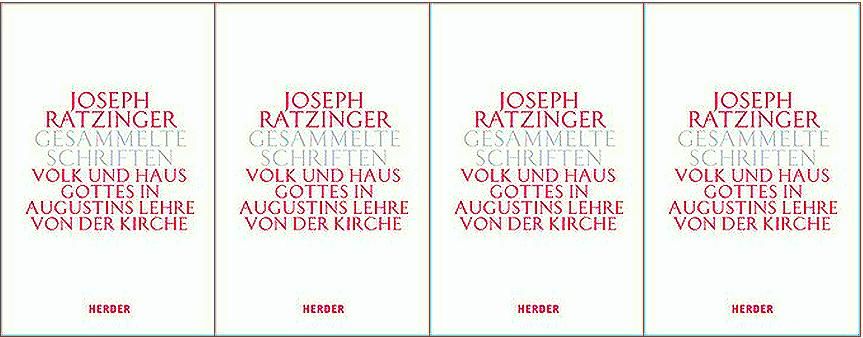
The next volume to be released in a few weeks will be that which puts together all of Joseph Ratzinger's writings about the Second Vatican Council.
Among the prominent guests present were Cardinal Walter Brandmueller, a Church historian; Mons, Robert Zollitsch, Archbishop of Freiburg and president of the German bishops' conference; a number of Curial prelates, representatives of leading German publications, and Vatican Radio.
After a short garden reception, Ambassador Schweppe thanked everyone for their presence and interest in the first scientific writing of theologian Ratzinger.
Mons. Mueller, publisher of the Collected Writings as president of the Regensburg-based Isntitut Benedikt XVI, began the presentation with a lecture on the unity of the Church in the Eucharist as seen in the works of St. Augustine, saying that the teaching and thought of the great 5th century theologian-bishop had influenced Church history like no other in his time.
In 1950, Joseph Ratzinger was asked by his Professor Gottlieb Soehngen to look into Augustine's ecclesiology, particularly his concept of 'the People of God', which was a major concept in the Council of Trent.
The young Ratzinger, who was already an Augustinian scholar, worked on his dissertation between July 1950 and March 1951 and arrived at a new conclusion: that in Augustine, the idea of the 'People of God' was "in accordance with Sacred Scripture, the designation for Israel as the chosen people".
But the people called by Christ to be the Church, are also 'a body'. The key text is 1 Corinthians 10, 17: "Because the loaf of bread is one, we, though many, are one body, for we all partake of the one loaf."
Thus the Church is also "a communion of believers in Christ in the unity of the Eucharistic Body that transforms us into Christ". Or, as Mueller formulates it, "The Church lives from the Eucharist and in the Eucharist becomes the Body of Christ".
This teaching was also reiterated in the Second Vatican Council - that the Church is the community of those who celebrate together the Lord's Supper. Thus, the present Pope, with his first important theological work, had highlighted the eucharistic approach of Augustine.
In this respect, Mons. Mueller pointed out that many of Benedict XVI's discourses, including those he delivered in Germany last year, on the idea of Entweltlichung (demondanization) - ridding the Church of worldliness - were 'innovative and inspiring', even 'unexpected', to those who do not know the Pope's intentions.
But the Pope thereby simply intended to show that the Church, amidst still existing 'worldly orders', must assert 'the new strength of faith in the unity of men within the Body of Christ, as a n element of transformation whose form God himself will create". [I am not at all familiar with Mons. Mueller's writings as a theologian, but his attempts to paraphrase or to re-state Joseph Ratzinger's ideas,at least as quoted here, seem to me rather heavy-handed and quite unlike the clarity of Joseph Ratzinger himself. It's rather like OR editor Vian's awkward and uneasy attempts to paraphrase the Pope in his editorials.]
In this sense, Mueller said that in proclaiming the Christian message, Benedict XVI has always been faithful to himself, as he showed in Deus caritas est, in which he calls the attention of the faithful that charity, love of one's neighbor, is the vocation of Christians.
Mueller said the 16-volume series presents Joseph Ratzinger's writings to the time he was elected Pope in April 2005 - that Volume i was a central element of the Pope's theological formation, and that the Pope has always remained closely linked to the figure and thinking of St. Augustine.
He ended his intervention by calling on all Christians to rediscover the meaning of being Christian, of communion, Church and Eucharist.
The series co-publisher, Rudolf Voderholzer, professor of dogmatic theology and history of dogma at the Catholic faculty of the University of Trier [2013 P.S. Benedict XVI named him Bishop of Regensburg last December to succeed Mons. Mueller] completed the presentation with a discussion of the linguistic style of Joseph Ratzinger, who is able to explain even the most complex subjects in a simple and understandable way.
Therefore, he said, the Pope's theological work is accessible even to non-specialists. He said the six homilies of Joseph Ratzinger in the volume's appendix constitute the 'homiletic transposition' of the dissertation and illustrate the Pope's abilities as an intermediary.
To the question of whether the young Ratzinger's work also had to do with the relationship between Jews and Christians, Mueller said that the Church specifically represents the Body of Christ and the Temple of the Holy Spirit, but the Jews as 'people of God' still had to take 'the next step' towards Jesus Christ.
But he stressed that the relationship between Judaism and Christianity remains special, because Jesus Christ himself was a Jew in continuity with the 'chosen people', and that in the Church both this continuity with Israel as well as her newness in Christ go together.
He said that the volumes reproduce all the writings of Joseph Ratzinger as they were first published, without modifications, and that it is the Pope himself who has decided on the order in which the volumes of the Collected Writings are published.
The Pope decided the first to be published would be the volume containing his writings about liturgy because of the fundamental importance of liturgy as an expression of the faith. However, Mueller said, obviously not all theologians have read the book, otherwise "the Memorandum issued in 2010 by some 200 theologians from German-speaking countries would never have been written".
A refresher:
The volumes in GESAMMELTE SCHRIFTEN
NB: The volumes in green are those that have already been published in German.
1. Volk und Haus Gottes in Augustins Lehre von der Kirche
Die Dissertation und weitere Studien zu Augustinus von Hippo
(The People and the House of God in Augustine's Teachings on the Church:
Dissertation and further studies on Augustine of Hippo)
2. [Das Offenbarungsverständnis und die Geschichtstheologie Bonaventuras
Die ungekürzte Habilitationsschrift und weitere Bonaventura-Studien
(Revelation and St. Bonaventure's Theology of History:
The unabridged Habilitation dissertation and other studies on Bonaventure)
Published Sept. 2009
3. Der Gott des Glaubens und der Gott der Philosophen
Die wechselseitige Verwiesenheit von fides und ratio
(The God of Faith and the God of Philosophers: The reciprocal relationship between faith and reason)
4. Einführung in das Christentum
Bekenntnis – Taufe – Nachfolge
(Introduction to Christianity: Profession of Faith - Baptism - Discipleship)
5. Herkunft und Bestimmung
Schöpfung – Anthropologie – Mariologie
(Origin and Destiny: Creation - Anthropology- Mariology)
6. Jesus von Nazareth
Spirituelle Christologie
(Jesus of Nazareth: Spiritual Christology)
7. Zur Theologie des Konzils
Texte zum II. Vatikanum
(On the ThEology of the Councl: Texts on Vatican II)
8. Zeichen unter den Völkern
Schriften zur Ekklesiologie und Ökumene
(Signs among Peoples: Writings on Ecclesiology and Ecumenism)
Published in 2 volumes June 2009
9. Offenbarung – Schrift – Tradition
Hermeneutik und Theologische Prinzipienlehre
(Revelation - Scripture - Tradition: Lessons on hermeneutic and theological principles)
10. Auferstehung und Ewiges Leben:
Beiträge zur Eschatologie[
(The Resurrection and Eternal Life: Essays on eschatology)
11. Theologie der Liturgie
Die sakramentale Begründung christlicher Existenz
(The Theology of Liturgy: The sacramental foundation of Christian existence)
Published October 2008 - First volume of the collection to be published
at the express request of the Holy Father
12. Künder des Wortes und Diener eurer Freude
Zur Theologie und Spiritualität des Ordo
(Announcers of the Word and Servants of your Joy: The theology and spirituality of the Ordo)
Published Sept. 2010
13. Im Gespräch mit der Zeit
Interviews – Stellungnahmen – Einsprüche
(In Conversation with the Times: Interviews - Positions - Objections)
14. Predigten zum Kirchenjahr
Meditationen, Gebete, Betrachtungen
(Homilies for the Liturgical Year - Meditations, Prayers, Observations)
15. Aus meinem Leben
Autobiographische Texte
(My Life: Autobiographical Texts)
16. Bibliographie und Gesamt-Register
(Bibliography and Complete Index)
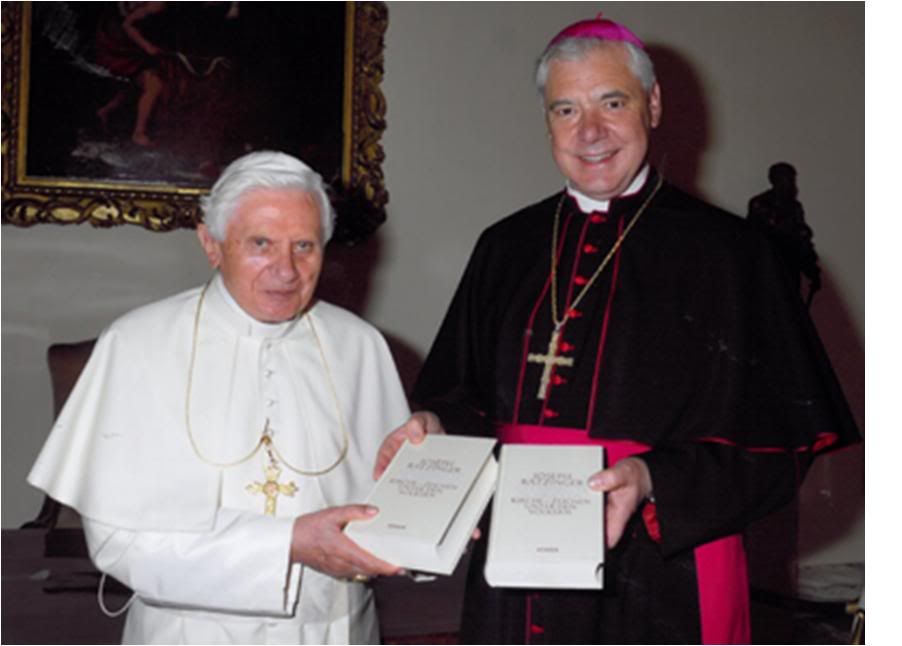
Mons. Mueller presented the Pope with Volumes 8-1 and 8-2 of the German edition in June 2010.

[Modificato da TERESA BENEDETTA 21/03/2013 22:22] |
| |
|
| |
 21/03/2013 22:16 21/03/2013 22:16 |
|
| | | OFFLINE | | Post: 26.502
Post: 8.989 | Registrato il: 28/08/2005
Registrato il: 20/01/2009 | Administratore | Utente Master | |
|

 Sorry I have not been able to update the Vatican-Canterbury banner, after both Benedict XVI and Archbishop Williams have since resigned...
Papal messages for the new
Sorry I have not been able to update the Vatican-Canterbury banner, after both Benedict XVI and Archbishop Williams have since resigned...
Papal messages for the new
Archbishop of Canterbury

March 21, 2014
The Vatican today released the message sent by Pope Francis to Mons. Justin Welby, on his enthronement today as Archbishop of Canterbury and Primate of the Anglican Communion.
To the Most Reverend and Right Honourable
Justin Welby
Archbishop of Canterbury
"May grace and peace be multiplied to you" (1 Pet 1:2b)
I thank you for the kind words contained in your message to me at my election, and I wish in turn to offer my greetings and best wishes on the occasion of your Enthronement at Canterbury Cathedral.
The pastoral ministry is a call to walk in fidelity to the Gospel of our Lord Jesus Christ. Please be assured of my prayers as you take up your new responsibilities, and I ask you to pray for me as I respond to the new call that the Lord has addressed to me.
I look forward to meeting you in the near future, and to continuing the warm fraternal relations that our predecessors enjoyed.
From the Vatican
18 March 2013

NB: I picked up the signature from Pope Francis's official photograph where he signs himself simply as 'Franciscus' without the 'PP.' after his papal name. Is he doing without that, too? [I get different answers to when I try to find out what the PP. stands for - one says it is simply short for 'PAPA', which means Pope in Latin and in Italian. Another reference says it stands for PAPA ET PONTIFEX (Pope and Pontiff), another for 'PONTIFEX PRIMUS' (first bridge-builder).
The Vatican also released the letter of congratulations sent to Mons. Welby last February by Benedict XVI after the latter was elected to succeed Archbishop Rowan Williams:
To the Most Reverend and Right Honourable
Justin Welby
Archbishop of Canterbury
In our prayers for you we always thank God, the Father of our Lord Jesus Christ, for we have heard of your faith in Christ Jesus and of the love that you have for all the saints, because of the hope laid up for you in heaven (Col 1:3)
With these words of Saint Paul, I greet you joyfully in the name of the Lord Jesus, "whom God made our wisdom, our righteousness and sanctification and redemption" (1 Cor 1:30), and I offer you my prayerful good wishes on the occasion of your installation as Archbishop of Canterbury.
You take up your office at a time when the Christian faith is being called into question in many parts of the Western world by those who claim that religion is a private matter, with no contribution to offer to public debate.
Ministers of the Gospel today have to respond to a widespread deafness to the music of faith, and a general weariness that shuns the demands of discipleship. Yet the hunger for God, even if unrecognized, is ever-present in our society, and the preacher's task, as a messenger of hope, is to speak the truth with love, shedding the light of Christ into the darkness of people's lives.
May your apostolate yield a rich harvest and may it open the eyes and ears of many to the life-giving message of the Gospel.
Let us give thanks to God that the bonds of affection between Catholics and Anglicans have become firmly established in recent decades, through dialogue and collaboration, as well as personal meetings between our respective predecessors. It is greatly to be hoped that we will continue to build upon that important legacy.
The disappointments that have been encountered and the challenges that remain on our journey towards full communion are well known, but there have also been signs of hope. Recognizing that our unity will arise only as a gift from the Lord, let us entrust ourselves to his Holy Spirit, as we renew our determination to seek genuine unity in faith and to engage more profoundly in common witness and mission.
With sentiments of fraternal regard, I assure you of my prayers as you take up your new responsibilities. Whatever challenges you encounter, may the Lord grant you strength and wisdom, and may the Holy Spirit guide you in all that you undertake in his name.
From the Vatican
4 February 2013

 In a related item - Hallelujah1 I just came across a second cardinal to add to my 'honor roll' of those who have not sworn a self-imposed omerta about Benedict XVI. It's Cardinal Georges Cottier, a Swiss theologian and octogenarian cardinal, former theologian of the Pontifical Household under John Paul II. He was interviewed about Pope Francis's meeting with ecumenical and interfaith delegations yesterday. I will only present what he said about Benedict XVI (with a preliminary question about relations with Islam). It's too bad he was not asked about Benedict XVI's efforts with respect to the Orthodox Churches (with whom the theological dialog has arrived at discussing the character of the primacy of the Pope in the 1000 years that preceded the Great Schism:
Benedict XVI's contribution
In a related item - Hallelujah1 I just came across a second cardinal to add to my 'honor roll' of those who have not sworn a self-imposed omerta about Benedict XVI. It's Cardinal Georges Cottier, a Swiss theologian and octogenarian cardinal, former theologian of the Pontifical Household under John Paul II. He was interviewed about Pope Francis's meeting with ecumenical and interfaith delegations yesterday. I will only present what he said about Benedict XVI (with a preliminary question about relations with Islam). It's too bad he was not asked about Benedict XVI's efforts with respect to the Orthodox Churches (with whom the theological dialog has arrived at discussing the character of the primacy of the Pope in the 1000 years that preceded the Great Schism:
Benedict XVI's contribution
to inter-religious dialog
From an interview with Cardinal Cottier
by Claudio Perlini
Translated from

March 21, 2013
... In the inter-religious dialog, what can you say about the Church's relationship with Islam?
Many steps forward are being achieved, thanks to the work of the Pontifical Council for Inter=Religious Dialog, but the absence of unity within Islam itself is evident. The Muslim majority is not responsible for the acts of violence committed in the name of Islam, which is a vast terrain, in which the Church, wherever and whenever possible, has tried to create occasions for dialog. But this is a process that will probably require decades, if not centuries, to be consolidated.
What do you think of Benedict XVI's contribution to inter=religious dialog?
He gave it a very great impulse. All the work that has been done till now would not have been possible without the desire of the Holy Father, whether it is with the Jews or the Muslims.
Making progress means meeting one another, observing each other, because dialog cannot just be carried out long distance, and that is why the process will be long. Nonetheless, there can be no doubt of Benedict XVI's contribution.
Almost 30 years since John Paul II's first 'prayer for peace' meeting in Assisi (1986), what can you say about the 'spirit of Assisi' today?
The fundamental idea behind the Assisi assembly was very clear: if there exists an authentic religious sentiment which seeks to do God's will, this can never divide peoples but can only represent a principle that leads to peace.
For this reason, Benedict XVI organized a new meeting in Assisi (2012) precisely to assure that this religious spirit for peace may not be dispersed, to remind all believers that worship of God is incompatible with hatred, and that it is necessary to have good will towards our neighbor and the great gift of peace to which we all aspire. That is the spirit of Assisi. The cardinal neglects to say that Benedict XVI's assembly in Assisi also included intellectuals who represent atheistic and agnostic thinking but who consider themselves humanists with the same aspiration for peace as all men of good will.]
[Modificato da TERESA BENEDETTA 26/03/2014 01:06] |
| |
 21/03/2013 23:16 21/03/2013 23:16 |
|
| | | OFFLINE | | Post: 26.503
Post: 8.989 | Registrato il: 28/08/2005
Registrato il: 20/01/2009 | Administratore | Utente Master | |
|
 The advent of Francis:
The advent of Francis:
What revolution?

March 19, 2013
These days, my colleagues in the media are vying to find the right words to describe the new Pontificate of Francis. Change of direction, turning point, and yes, revolution!
I'm not putting down literary license, which is necessary to narrate history. But only if it helps to narrate the true history, not to reconstruct it according to one's own interests. Some of that is happening these days.
'Revolution', though? Not that it is an exaggerated word, but it is simply absurd to use it in the life of the Church. It is not we men who 'made' the Church, she came to us from God. If that was not so, she would have disappeared long ago.
But as that 19th century cardinal said upon learning of Napoleon's plans to destroy the Church, "That's impossible, Even we have not succeeded to do that".
We cannot 'make' the Church - we can only respond to God's initiative. We can still hear the words of Benedict XVI at the start of the last Synodal Assembly of Bishops: "The Apostles didn't say, now we will create a Church. They didn't call a constituent assembly to draw up a constitution. No, they prayed, and waited in prayer, because they knew that only God could create his Church, of which he is the first agent. If God does not act, everything remains just about us, and we will always be insufficient... Just as then, only the initiative of God could create the Church,... so today we can only cooperate with him. The initiative must come from God".
So it was very significant that Pope Francis wanted his first appearance before the world to be marked by prayer. First, we must know what the Lord asks of us, entrust ourselves to his urging, then follow the path he indicates.
But already all the world's major editorial offices have their list of tasks to urge on Francis - so the Church may be in tune with the contemporary world, so it can modernize, etc.
Yet Francis has said that if we don't profess Christ, we end up professing the devil. I don't know if the media consider this 'modern' at all.
To speak of revolution ("To the barricaes!") may be very attractive to those who write the headlines. And to imagine that Pope Francis is about to turn everything upside down in the Church is exciting the imagination of many...
But meanwhile, he has said, we must 'walk, build, profess'. Walk in the light of the Lord, because only his light can make our life irreproachable. Build on the foundation of the Cross, on the blood shed by the Lord, because without the Cross, we become nothing more than a pious NGO (non-governmental organization) - which is precisely what major newspapers like El Pais and the New York Times want the Church to be. And profess the name of Christ, because if we dedicate ourselves to other things then we shall end up professing the spirit of the world, which in Scripture bears a name [of Satan] which is decidedly unwelcome to the do-gooders who are now celebrating Francis.
The Church's journey is long, during which both decadence and rejuvenation take place. Incrustrations grow which must be broken off because they can take the Church off her route and she must follow the true north. So that the Lord may generate new blood, let holiness emerge in order to mobilize the refractory and straighten out the crooked. It is a process that is never ending - the Church is a living tree, and while some branches rot and fall off, there are always branches that flourish again in unexpected greenness.
Revolution? No, for heaven's sake! That means rupture, violence, appropriation, man's presumptuousness. The first task of a Pope is simply to obey, as St. Peter learned hard. Renewal and purification, yes - always and everywhere, and let it be now, more profoundly.
Years ago, at the Rimini Meeting of C&L, Cardinal Joseph Ratzinger spoke of the ' Ecclesia semper fiformanda' - the Church that is always in need of reform. And with what intensity he reiterated it to us, in various ways, in the past eight years.
The Church is a living body that advances and is transformed throughout history while remaining loyal to her own nature and her vocation. But the plans for her always-ongoing reform are not for the architects of the world to draw up - where would we be if that were so?
The work for this ongoing reform derives from the profound spring that forever wells from her. The paradox is that in order for the Church to advance, it must always return to her origin, as St. Francis did. A personage who would perhaps frighten off those who now praise him for the wrong reasons if they met him today.
|
| |
 22/03/2013 15:59 22/03/2013 15:59 |
|
| | | OFFLINE | | Post: 26.504
Post: 8.991 | Registrato il: 28/08/2005
Registrato il: 20/01/2009 | Administratore | Utente Master | |
|
'There is room in here for 300'????
Pope Francis is quoted to have said when he first visited the papal apartment in the Apostolic Palace, "There is room in here for 300!" and that he would live simply and occupy less space. Let the picture speak for itself:
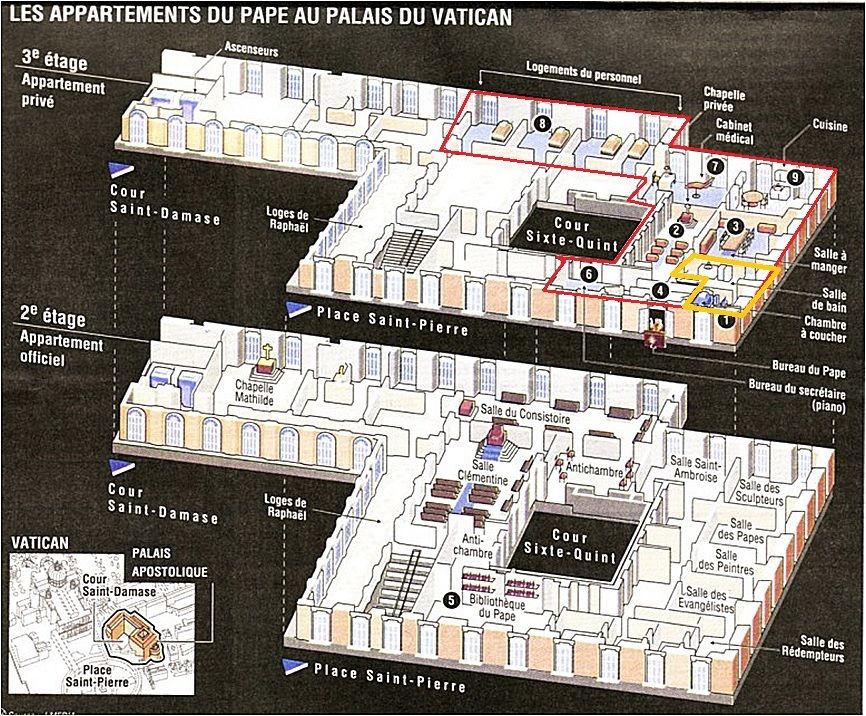 Floor plans of the second and third floors of the Apostolic Palace showing the official rooms used by the Pope on the second floor, and his private apartment on the third.
Floor plans of the second and third floors of the Apostolic Palace showing the official rooms used by the Pope on the second floor, and his private apartment on the third.
The private apartment on the third floor, following the numbering on the diagram, consists of:
1) Pope's bedroom, with adjoining bath, wardrobe and dressing area
2) Private chapel
3) Dining room
4) Pope's study
6) Secretaries' room
7) Medical clinic
8) Rooms for household help
9) Kitchen
(#5 is located on the second floor, and is the so-called Private Library where the Popes receive most individuals and small groups for private audiences.)
The overall size of the papal apartment has remained the same through the past several Popes - only the configuration has changed. For example, the reason extensive renovation had to be done before Benedict XVI could move into the Apostolic Palace in 2005 was that the papal bedroom and adjoining area had been adapted for John Paul II's illness to accommodate both his physical disabilities as well as medical equipment adequate to deal with life-threatening emergencies. Under Benedict XVI, a small medical clinic serves for emergency purposes.
Assuming Pope Francis did say what he said - perhaps in jest rather than irony - why would the Vatican Press Office publicize it the way it did? It sounds like a sanctimonious judgment on previous Popes - and surely Pope Francis is not sanctimonious! And is the Pope quoted right about living simply and occupying less space? It seems such a superfluous and unnecessary statement to make, given all that has been said before in the media about his simple lifestyle.
Not that anyone, even in the media, has ever reported the Pope's private apartment - at least since the time of Pius XII, to my own personal recollection - to be anything but simple and functional. In the floor plan, the Pope's bedroom is the same size as the bedrooms for the household help (about 10 ft x 8 ft, according to another floor plan I saw. All the other rooms, besides the two studies and the bedrooms, are common areas. [Also, incidentally, Benedict XVI's kitchen replaced a kitchen that had not been renovated or updated for more than three decades, which reportedly caused problems and great inconvenience to the Polish nuns taking care of John Paul II. A German firm donated all the equipment for the new kitchen. Will all that be torn down now and replaced with a microwave oven and a two-burner stove?]
I very much fear that the next big splash we shall hear is that the Pope will not have any household help (OK, msybe at least one), he will cook and clean up himself, and he will personally bring his laundry to the Vatican laundromat... we can carry this faux-hagiographical line ad absurdum! At least so far, he has not turned down the services of the papal valet (Sandro Mariotti, who replaced the Vatican thief). And I do believe he does not have a private secretary. Can even a superPope function without one?
One could also imagine that the Pope will ask his Vicar in Rome, Cardinal Vallini, to pick out, say, 6 or 10 (or maybe 300) poor people daily to attend his daily Mass at the Pope's private chapel and to have breakfast with him afterwards. Even John Paul II never thought of that!
Sorry to be sardonic, but does anyone in the Vatican Press Office not realize how absurd it is, in principle, to play up all this humility and simplicity thing the way they are doing? Not just because previous popes have been humble and simple in their own way, though the Vatican itself certainly never advertised them as such in the past - but because 'flaunting' virtue on behalf of the Pope makes him look like the Pharisee beating his breast, which is exactly the opposite of humility.
[Modificato da TERESA BENEDETTA 26/03/2014 06:16] |
| |
 22/03/2013 18:19 22/03/2013 18:19 |
|
| | | OFFLINE | | Post: 26.505
Post: 8.992 | Registrato il: 28/08/2005
Registrato il: 20/01/2009 | Administratore | Utente Master | |
|
 Other than the Vatileaks dossier,
Other than the Vatileaks dossier,
Benedict XVI reportedly left another 300 pages
of his own notes for the next Pope
by Msrco Tosatti
Translated from the Italian service of

March 22, 2012
Pope Francis has much to read these days. Not so much the report of the three cardinals on Vatileaks, as a personal memorandum written for his successor by Benedict XVI about practical matters that have to do with the exercise of the Pontificate.
This was indicated to Avvenire by Archbishop Loris Capovilla, who was John XXIII's personal secretary, whose 98 years have not taken a toll 0n (and have even sharpened) his lucidity.
He said, "In any case - and I am not referring here to the Vatileaks dossier - what I am told in Rome is that Benedict XVI had left something like 300 pages of a memorandum he wrote expressly for the attention of the new Pope". In other words, like a good captain, Benedict XVI turned over the tiller properly to the new man in charge of Peter's bark with a set of notes intended to help the latter.
It is therefore likely that Pope Francis may pay more attention to these notes than the Vatileaks dossier, about which there seems to be growing criticism and perplexity, even as it has become clear how the three=man cardinals' inquiry commission worked.
[It must be said that everything written in the media about the Vatileaks report has been purely speculative. Even Ignacio Ingrao of Panorama, who had speculated about a gay lobby blackmailing some in the Vatican (the main thing that MSM picked up from his story and the wild extrapolations made from it by La Repubblica), has repeatedly told other journalists who asked him directly about his story, that he never saw the report or spoke to anyone who had seen the report, but that he sought to reconstruct the information that the cardinals could have gathered by talking to the persons he knew they had interviewed. The following too should be considered speculative, not necessarily fact.]
They were said to have based their inquiries only on the 'denunciations' made by Mons. Carlo Maria Vigano in his 2011 letters to Cardinal Bertone and the Pope, mostly recording accusatory testimony without, in many cases, hearing the other side, but simply limiting themselves to recording such testimony. [It does not make sense that the cardinals limited themselves mostly to Vigano's accusations because the Vatileaks issue went beyond those specific allegations - we were made to understand that Benedict XVI asked the cardinals to look into the structure and mechanisms of the various Curial offices (including the Secretariat of State) in order to analyze the environment which made Vatileaks (not just Gabriele's thievery but the general morale and attitudes of those who work in the Vatican. It's also hard to believe that the three cardinals would not have sought out witnesses who could shed more light on accusations made! Even a veteran reporter like Tosatti falls prey to writing from a certain bias and failing to ask the commmon-sense questions raised by presenting such bias a-critically!]
One of the more controversial parts is the so-called 'inquiry' organized at the Vatican Goivernatorate by Mons. Vigano when he was the #2 man there, regarding Mons. Paolo Nicolini [financial administrator of the Vatican Museums], a man greatly respected by Cardinal Camillo Ruini but also by Vigano himself, who had often consulted him on technical and admini9strative questions.
But informed sources say Nicolini was also a consltant to Cardinal Bertone, to whom he provided information about the Governatorate, including, it was presumed, on Vigano himself. Which led the latter to suspect Nicolini of playing a two-faced game. So when Bertone informed Vigano that he would be assigned as Nuncio to the United States, not succeed automatically to become President of the Governatorate upon the retirement of Cardinal Lajolo, Vigano exploded.
Because of the specific accusations made by Vigano in his letters to the Pope and Bertone, a commission to investigate these accuaations was appointed in 2011, headed by a close friend of Vigano, Mons. Egidio Turnaturi, a former judge of the Roman Rota. The inquiry, as Vatican Insider reported in March last year, found that "the accusations against Mons. Nicolini were unfounded, although the commission confirmed some observations about his character and admonished him about this".
Equally important was the letter written in response to Vigano's accusations by Cardinal Giovanni Lajolo, his predecessor at the
Governatorate, who dotted many i's and crossed off t's in Vigano's letter, to show that the Governatorate had worked with transparency regarding its financial affairs.
But the [alleged] imbalance in the cardinals' report on Vatileaks by focusing on Vigano's accusations, along with other elements, has influenced negatively on the credibility of the whole report. Especially because of discrepancies, not of minor significance, that have been found in the allegations of the 'great accuser'.
Moreover, it is said that Vigano, who left for the United States in October 2011, has so far refused to make his private apartment at the Governatorate available for the use of others, and it remains locked, with all his furniture. Cardinal Bertone is said to have written a letter asking him to return the keys to the Vatican, but for some reason (Vigano has friends in the Secretariat?), the letter was not sent until much later. [But has Vigano responded? Has he returned the keys? This is all reminiscent of Cardinal Sodano not vacating the private apartment of the Secretary of State for quite a few months after he was no longer SecState, while Cardinal Bertone had to bide his time in temporary lodgings at the Torre San Giovanni inside the Vatican.]
On top of that, there was the recent news that Mons. Vigano had told the Pope a major lie in his letter complaint. [It's not recent - if only the other Italian media had deigned to check the facts reported in February 2012 by Il Giornale, based on court documents it claimed to have seen, and which are substantially in agreement, albeit with more detail, with the statements recently attributed directly to Mons. Vigano's older brother, Lorenzo, a Jesuit Biblicist.]
Fr. Vigano said in an interview that his brother "lied to Ratzinger when he claimed he needed to stay in Rome in order to take care of me since I was very ill". Vigano, in his letter to the Pope, said he could not leave Rome because of the 'necessary, dutiful and direct assistance' that he was committed to give his older brother.
Fr. Lorenzo has lived in Chicago since the 1980s, and although he suffered a stroke in 1996 and is half-paralyzed, he is well enough to have returned to his job afterwards as a Biblical researcher in the University of Chicago. He also said he and Carlo had broken off relations two years ago because of "tensions regarding our family inheritance".
"It is most serious," he said, "that Carlo Maria wrote a lie to the Pope, instrumentalizing me for his personal ends".
Unfortunately, it seems that Cardinals Herranz, Tomo and De Giorgi gave too much attention to Vigano's accusations, perhaps out of a desire to set things straight for the sake of the Church.
Among those they interviewed, just as they did the others accused by Vigano, was Cardinal Bertone himself, the principal target of Vigano's accusations. {So how can Tosatti say that the cardinals only heard one side, when it seems like they did interrogate those who had been accused - it would seem normal to first confront the accused with the accusations, hear what they have to say, and then seek out other witnesses who can either corroborate or contradict what the accused has said in his defense. Surely no one had to tell that to the three cardinals, led by one of the best canon lawyers in the Church.]
It's a line that, in the light of what has been emerging, casts a shadow on the reliability of the cardinals' report.
What's the game plan here? To discredit the Vatileaks dossier all of a sudden, when for months, it was being hailed in the Italian media as a definitive account of what is wrong in the Curia and how such faults contributed to the atmosphere that created Vatileaks????
Caveat emptor! None of the Vatican experts and pundits even considered the possibility that Jorge Bergoglio, runner-up in the 2005 Conclave, was a serious contender in 2013, let alone that he would be elected Pope. So much for 'expert speculation'! Can we please just get facts?
|
| |
 22/03/2013 19:58 22/03/2013 19:58 |
|
| | | OFFLINE | | Post: 26.506
Post: 8.993 | Registrato il: 28/08/2005
Registrato il: 20/01/2009 | Administratore | Utente Master | |
|

 Friday, March 22, Fifth Week of Lent
Friday, March 22, Fifth Week of Lent
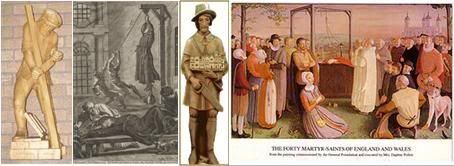 Center: Engraving, St. Nicholas's torture.
ST. NICHOLAS OWEN (England, 1550-1606), Carpenter/Mason, Lay Jesuit, Reformation Martyr
Center: Engraving, St. Nicholas's torture.
ST. NICHOLAS OWEN (England, 1550-1606), Carpenter/Mason, Lay Jesuit, Reformation Martyr
Owen was one of the 40 Martyrs of England and Wales canonized by Paul VI in 1970. They died for
the faith during anti-Catholic persecutions from 1535-1679. Called 'Little John' because he was born
a dwarf, he made his reputation by building so-called priest holes, or hiding places for Catholics that
were undetectable to raiders. He was arrested three times himself, the first time in 1582 for having
defended St. Edmund Campion, once a favorite of Elizabeth I, but who eventually refused to renounce
his faith and was 'hanged, drawn and quartered' on a trumped up conspiracy charge. Little John was
released, went back to building priest-holes and caught again when he was betrayed in 1594. His last
capture was in 1606 when he was subjected to great torture - hung by his hands with a weight on his
feet while he was beaten, and stretched on the rack, from which he eventually died.
Readings for today's Mass:
www.usccb.org/bible/readings/032213.cfm
AT THE VATICAN TODAY
This morning, the Holy Father met with
- The Diplomatic Corps accredited to the Vatican. Address in Italian.
And in the afternoon, with
- Cardinal Leonardo Sandri, Prefect of the Congregation for Oriental Churches [An Argentinian of Italian ancestry
like the Pope]
 One year ago today...
The Holy Father Benedict XVI had no scheduled events on the eve of his departure for Mexico and Cuba.
Two years ago today...
The Congregation for Catholic Education presented a new Decree on the Reform of Ecclesiastical Studies in Philosophy to restore the 'original vocation' of philosophy; which is the search for truth and its sapiential and metaphysical dimension". It prescribed three years of philosophy for seminarians instead of the usual two, with great emphasis on logic and metaphysics. It was the first major reform in seminary studies since 1979, and reflected in many ways an observation made by Benedict XVI in 2007:
One year ago today...
The Holy Father Benedict XVI had no scheduled events on the eve of his departure for Mexico and Cuba.
Two years ago today...
The Congregation for Catholic Education presented a new Decree on the Reform of Ecclesiastical Studies in Philosophy to restore the 'original vocation' of philosophy; which is the search for truth and its sapiential and metaphysical dimension". It prescribed three years of philosophy for seminarians instead of the usual two, with great emphasis on logic and metaphysics. It was the first major reform in seminary studies since 1979, and reflected in many ways an observation made by Benedict XVI in 2007:
The crisis in post-conciliar theology is in large measure the crisis in its philosophical foundations.... When these foundations are not clear, then theology lacks solid ground under its feet, because then, it is not clear to what degree man truly knows reality, and the bases from which he can think and speak.
[In connection with Benedict XVI's trip - to Mexico, particularly - the following items are instructive as well as 'typical' of the media fate of Joseph Ratzinger/Benedict XVI - an exceptionally superior human being, blessed with an abundance of divine graces and gifted with sterling human virtues, yet since becoming Pope in 2005, repeatedly, endlessly, almost infinitely made to appear very inferior compared to his predecessor, and now with his successor. The items have to do with the truly malicious media drumbeat before he arrived in Mexico to the effect that John Paul II was so idolized by the Mexicans that they are completely 'underwhelmed' by Benedict XVI's visit, and would probably not come out to greet him in any number that could even approach the crowds for John Paul II on each of his three visits to Mexico. Once again, of course, reality - well covered by television - resoundingly repudiated all the Cassandras, who, in eight years of covering Benedict XVI's Pontificate, never learned from their gargantuan mistakes.

In the following story, for the first time, to my knowledge, a high-ranking prelate has brought up a topic no one else in the Church has dared to speak aloud. It is particularly important - as I remarked on an earlier story highlighting the overt bias, almost a hostility, expressed by some Mexican Catholics against Benedict XVI because he is not John Paul II - to educate Catholics that the current living Pope is the one and only Vicar of Christ on earth, that Benedict XVI would be the last person on earth to 'compare' himself to John Paul II, much less to a Pope he has beatified and whom he may even canonize in his own lifetime! I don't believe any such papal partisanship among the faithful has been evident in the modern era (or perhaps, ever!), and it is a degradation of the faith, somehow, that it ever developed. P.S, 2013 A degradation that is worsening with new vigor in media reporting about the recent change of Pontificate.
Bishop of Leon calls on Mexicans
to stop comparing BXVI to JPII

Leon, Mexico, Mar 20, 2012 (CNA/EWTN News) - A local archbishop encouraged Catholics in Mexico as they prepare to welcome Pope Benedict for his March 23-25 visit to the country not to compare him to Blessed John Paul II.
In an interview with CNN Mexico, Archbishop Jose Guadalupe Martin Rabago of Leon said: “All of the Popes are equal and deserve our respect and adherence, regardless of whatever their personal charism might be.”
“I think we need to say this to everyone, so that they don’t expect to see Pope Benedict as a repeat, or crudely put, as a clone of Pope John Paul II,” he said.
The archbishop expressed his hope, however, that just as with the apostolic visits of Blessed John Paul II, Pope Benedict's trip would also inspire many vocations to the priesthood and consecrated life.
Archbishop Rabago said the papal trip is an honor for the state of Guanajuato, which, “together with Aguascalientes and Jalisco, has the highest percentage of Catholics in Mexico (around 94% of their residents are Catholic).”

Mexico awaits the Pope
Interview with Cardinal Lozano
by Andres Beltramo Alvarez
Translated from the Spanish service of

March 18, 2012
VATICAN CITY - The Pope is travelling to Mexico with a mission supra partes - above and beyond parties - and his words cannot be coopted into the 'trivialities' of any political party, according to Cardinal Javier Lozano Barragan, who will be the only Mexican cardinal in the Pope'e delegation from the Vatican for the coming trip.
[I will re-post only the part of the interview that has to do with the unkind comparisons to John Paul II.]
This trip takes place in the midst of a year that has already started turbulently for the Holy See with the so-called Vatileaks. Will the trip be a breath of fresh air for the Pope? [It's such a banal assumption for the interviewer to assume that the turbulence in the media over those leaks necessarily mean 'turbulence' within the Vatican! Concern and annoyance, obviously (and even embarrassment) that confidential documents could be leaked to the media, but since no major scandals were exposed other than normal bureaucratic rivalries, the disturbance it caused was certainly far less than the publicly perceived effects of earlier media-generated crises like Regensburg and the Williamson case.]
With all respect to the media, this was one of those occasional flare-ups that throw light on some events that end up slipping away like rosary beads do as we pray. There have always been attacks against the Church, and journalists will always find something to exploit.
First it was pedophilia by some priests, now it is a supposed corruption in the IOR or a plot to kill the Pope. Once those have been exhausted as news, the media will find something else, and they can have great imagination. That ought not to frighten us in the Church - that's the way it has always been, and that's the way it will continue to be. But we have the certainty that the Church has lasted 2000 years and it will last to the end of time.
With this visit, is the Bishop of Rome settling something he owes Latin America? [Another mindless journalistic assumption! Did anyone ever say John XXIII 'owed' any place of the world anything because he did not travel abroad?]
It is important to distinguish between Popes. John Paul II is being made the reference point for Benedict XVI. Just because Karol Wojtyla began his foreign travels as Pope with Mexico, thus launching his course as a 'missionary to the world' throughout his Pontificate, does not mean he should be the model for Benedict XVI.
To be Pope is to become the principle of unity within the Church, which each Pope carries out according to his personality and the circumstances of his time. You cannot compare becoming Pope at 58, as John Paul II did, to becoming Pope when you are 78 as Benedict XVI did. For him to travel to Mexico at the age of 85 is something extraordinary and very special.

[Modificato da TERESA BENEDETTA 22/03/2013 20:01] |
| |
 22/03/2013 21:51 22/03/2013 21:51 |
|
| | | OFFLINE | | Post: 26.507
Post: 8.994 | Registrato il: 28/08/2005
Registrato il: 20/01/2009 | Administratore | Utente Master | |
|


 For Benedict XVI, who taught us solemn and humble by his great and silent example...
Solemn is not the enemy of humble
For Benedict XVI, who taught us solemn and humble by his great and silent example...
Solemn is not the enemy of humble
by Fr. John Zuhlsdorf
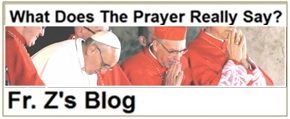
March 21, 2013
Thanks to Father Z for sharing this illuminating passage from C. S. Lewis, passed along to him by a priest friend:
From A Preface to Paradise Lost
by C.S. Lewis
This quality will be understood by anyone who really understands the meaning of the Middle English word solempne. This means something different, but not quite different, from modern English solemn. Like solemn it implies the opposite of what is familiar, free and easy, or ordinary. But unlike solemn it does not suggest gloom, oppression, or austerity.
The ball in the first act of Romeo and Juliet was a ‘solemnity’. The feast at the beginning of Gawain and the Green Knight is very much of a solemnity. A great mass by Mozart or Beethoven is as much a solemnity in its hilarious Gloria as in its poignant Crucifixus estt.
Feasts are, in this sense, more solemn than fasts. Easter is solempne, Good Friday is not. The Solempne is the festal which is also the stately and the ceremonial, the proper occasion for pomp - and the very fact that pompous is now used only in a bad sense measures the degree to which we have lost the old idea of ‘solemnity’.
To recover it you must think of a court ball, or a coronation, or a victory march, as these things appear to people who enjoy them; in an age when everyone puts on his oldest clothes to be happy in, you must re-awake the simpler state of mind in which people put on gold and scarlet to be happy in. [Not without reason, we say we say we dress up in our 'Sunday best'.!
Above all, you must be rid of the hideous idea, fruit of a widespread inferiority complex, that pomp, on the proper occasions, has any connexion with vanity or self-conceit.
A celebrant approaching the altar, a princess led out by a king to dance a minuet, a general officer on a ceremonial parade, a major-domo preceding the boar’s head at a Christmas feast — all these wear unusual clothes and move with calculated dignity.
This does not mean that they are vain, but that they are obedient; they are obeying the hoc age [doing now] which presides over every solemnity. The modern habit of doing ceremonial things unceremoniously is no proof of humility; rather it proves the offender’s inability to forget himself in the rite, and his readiness to spoil for every one else the proper pleasure of ritual.
I'm glad others are doing the talking that I wouldn't be able to do without sounding petty or partisan, or worse, disloyal to the Pope for not being 100% approving of everything he has said or done in this first several days as Pope... I have omitted from the following blog entry the first couple of paragraphs about misplaced hysteria by the right about Pope Francis's liturgy and on the left about his positions on ethical and moral issues, and in general, against the categories of left and right, or progressive/liberal and conservative to get to the point...
In defense of Benedict XVI:
The diametric diatribes
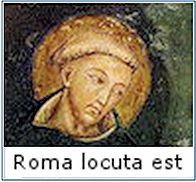
March 21, 2013
...I have been reading a lot of material for a week now, and I have noticed a pattern that is becoming increasingly annoying. In an attempt to promote the new Holy Father (a virtuous act indeed), there are those who have set him in deliberate opposition to our beloved Benedict XVI. The message seems clear: Pope Francis = Good, Pope Benedict = Bad.
We would do well to remember that, while their styles are different, when it comes down to the essence of the office, there is more continuity than rupture between the 265th Successor of St. Peter and the 266th. That was in part the point of yesterday’s post on papal environmental precedence. [One can cite the many occasions on which Benedict XVI advocated that man has a duty to safeguard Creation, so it is truly offensive,literally ad nauseam, the way MSM - and even many Catholic pundits and prelates - have been falling over each other in their collective self-willed amnesia to report on Pope Francis as though he had been the first Pope to ever articulate principles that are fundamental to the Catholic faith, or to ever have been 'simple and humble'.] The pitting of Francis and Benedict can be seen in a few noteworthy categories.
First, the pundits will say that Francis is a model of humility. There is nothing wrong with this of course, except for the unspoken suggestion that Benedict was not. Humility comes in many forms. The manner in which Francis brought tens of thousands of pilgrims to the point where you could hear a rosary drop and asked them to pray for him was impressive, and humble. [Was that any different then from the practice Benedict XVI introduced for the minute of silence that follows the Gospel reading and Communion, whether the Mass is held i St. Peter's Square or in the Basilica or anywhere else - not to mention the silence of Eucharistic Adoration he led for a million young people in Cologne, 800,000 in Sydney, one and a half million in Madrid, and no less impressive though smaller gatherings in London Malta, Prague...? I hate to sound petty, but in none of those occasions did he ever ask the moment of prayer and silence for himself!]
That does not, however, minimize the amount of humility shown by Pope Benedict XVI over the course of his pontificate. The mere fact that he recognized his inability for continue governing the Church provides ample evidence. In doing so, he has essentially disappeared to a life of quiet contemplation. This example of humility is something from which Cardinal Mahony could learn something.
Second, when it comes to things liturgical, there has been some confusion in the terms “humble” and “simple.” By now we are all mostly aware that Pope Francis came out onto the loggia not donning the papal mozzetta, the red shoes, the gold pectoral cross, and the rochet. We have also seen the same simplicity in the papal Masses.
It is clear that whereas the Benedictine liturgies had elements that were more ornate, Masses under the reign of Francis are proving to be simpler. Yet we should not confuse the latter with “humble”, and we certainly should not mischaracterize the former as “prideful.”
In fact, it takes a good amount of humility to recognize that the Mass is not of our own making, that it comes with a rich history of sacred actions and sacred objects. When one steps into an office, one assumes those things that go along with the office.
The beautiful vestments, liturgical objects, and the precision of detail used by Pope Benedict are all indicative of his submission to the Mass as a reality that is greater than him. In that sense, they are very much an example of the former pontiff’s humility.
Even extra-liturgical vestments can provide an example of personal humility. Last week, Creative Minority Report was the first to write about a comparison that many have been making ever since the announcement of Pope Francis: that of Downton Abbey’s Matthew Crawly. When Matthew arrived at Downton, being the simple country lawyer that he was, he couldn’t fathom having maids wait on him and a valet dress him, and he even railed against the “size” of Downton as something altogether unnecessary. Patrick Archibold explains:
Yet, Lord Grantham counseled him that while all this grand tradition might seem purposeless, it was not. He explained to Matthew that these traditions meant something, not only to the people blandished upon, but to the people who provided the service and to others as well.
Lord Grantham explained to Matthew that when he dismissed it all as useless, he was dismissing the value of lives and livelihoods spent learning the craft and the legitimate pride taken in hard work and diligence. He suggested that the service of the servants served not only their masters.
Over time, Matthew began to realize that their was some truth in Lord Grantham's words and being a kind and considerate man, he pondered it. Perhaps his insistence on simplicity was just another form of pride? Perhaps in accepting his new role, the truly humble thing to do was forgo his preference for simplicity, self-reliance, and plainness? In accepting his new role, he had a responsibility to others for whom these things meant a great deal.
And so, in an act of humility and kindness, Matthew asked his valet to help him dress and said, "Would you be so kind as to pick me out a pair of cuff-links." The valet smiled from ear to ear. Good Matthew had never been so humble and so self-effacing as when he accepted the assistance and adornments expected of his new role.
Simplicity is not the same as humility. The former can be humble, but it can also be prideful, much as the “trappings” of the papacy can be used with either pride or humility.
I believe in my heart that both Francis and Benedict are humble men - they are certainly holy men, and it is hard to be one without the other - but that humility stems neither from the Franciscan simplicity nor the Benedictine attention to liturgical detail [or respect for the tradition of the Papacy!].
Rather, the humility in both cases has its source, as does any virtue, in the human heart. Let us not forget as well that Pope Benedict was adverse to having people kiss the papal ring. He made an attempt to stop this at the beginning of his appointment, but eventually adopted a Matthew-Crawly submission to the desire of the people to venerate the Vicar of Christ.
With regards to the “trappings” of the papacy, Amy Welborn recently wrote,
What that expert [who had said "Benedict was a clothes horse"] fails to recognize was that Benedict’s attention to papal garb was not about vanity – I mean – really. It was about what he was always about: history And not history as a museum, out of an antiquarian interest, but as a link from the present to the past.
The red shoes – so maligned even by Catholics who should know better – are a symbol of blood. Blood , people. The blood of the martyrs and the blood of Christ on which His vicar stands, and through him, all of us. Popes – yes, even John XXIII and Paul VI – wore them until John Paul II stopped. Then Benedict reinstated them. That is, he humbled himself before history and symbol, and put the darn things on.”
Another paragon of humility right now is Msgr. Guido Marino. Here is a man who was brought in because of his experience and knowledge of the Sacred Liturgy precisely because he was of the same mind as Pope Benedict. He now finds himself in a situation serving a Pope who does not see everything the same way. This is not meant to be a criticism of the Holy Father, but merely a statement of fact. It is clear that Marini and Francis are not on the same liturgical page, and yet Marini serves. He is still the quiet man behind the scenes. That too is humility.
About a week ago Cardinal Mahony displayed once again his lack of understanding of all things humble. He issued a series of “tweets” that read, “SIMPLE is IN, extravagant is out!! Pope Francis is doing more for proclaiming Jesus Christ than thousands of 'professionals' – praise God! ... So long, Papal ermine and fancy lace! Welcome, simple cassock and hopefully, ordinary black shoes! ... Mass with Pope Francis: moving from HIGH Church to LOW and humble Church! What a blessing that we are encountering Jesus without trappings!”
This is the kind of thing that deserves rebuke when done by a member of the laity, but it outright shameful and scandalous when done by a Cardinal of the Holy Roman Church. Cardinal Mahony owes a public apology to the Pope emeritus for this deliberate snub. [SNUB??? It's outright calumny! Mahony's revenge on someone he has bragged he did not vote for in 2005, and whose zero tolerance for criminal priests and the bishops who covered up for them led to his unmasking as one of the worst examples of the latter!] We can all only hope that he heeds Benedict’s example of true humility and retires to a quiet life of prayer and contemplation. He would have more time to consider the sins of his past and rid his soul of arrogance.
On a more practical note, many have noted that Pope Francis is refusing a car and walking to many of the appointments he has. Once again, this is commendable. [Let us not exaggerate. The blogger is falling into the very trap he warns about. Surely, the Pope can do this only within the Vatican! If he were to visit the President of Italy at the Quirinale, or take possession of his cathedra in the Lateran, would he walk? He took a car to Santa Maria Maggiore, after all, which is much nearer. And are we forgetting Cardinal Ratzinger who, for more than 20 years, walked to and from work eveyday, and enjoyed walking around his neighborhood in Borgo Pio?]
In fact, while my own liturgical theology would rather have the “trappings” so eschewed by Mahony, I am completely on board with some fiscal conservatism when its comes to some extraneous aspects of the Church, both at the local level and at the Vatican. I have argued that this simplicity is an example much needed in our world.
I applaud the Pope for this decision, not only for its simplicity, but also because it allows him to encounter more people around the Vatican. Yet again, there is this implication that somehow this is all very “un-Benedict.” This couldn’t be further from the truth.
Cardinal Ratzinger was so used to making the daily walk across St. Peter’s square from his days in the curia that when he was elevated to the papacy, he still made the walk, often stopping to talk with pilgrims. He was so warm with people that the local media didn’t know what to do with their “pit bull” characterization of him. (The reputation, incidentally, was always undeserved, but it was there nevertheless, continually promoted by the media. [The stories eventually surfaced in the media after he became Pope.]
Keep in mind that in his last several years as pope, Benedict XVI was considerably older and feebler than our new beloved Holy Father Francis. since 2011, Pope Benedict couldn’t make the walk down the nave of St. Peter’s Basilica let alone across the square on foot! name. It is quite unjust to compare the aged Benedict with the youthful Francis. (Okay, maybe “youthful” is a stretch for a man of 76 years, but you get the point.)
The more egregious error is in commending Pope Francis for “departing from the text” of his prepared homilies. “It makes him so much more ‘human’ and not so much of a Vatican robot,” I read on one secular source.
It would do well to recall that Pope Benedict often sent the Vatican translators into a tizzy for departing from his prepared text, and this was not just in the younger days of his pontificate, but continued through his final address to the Roman clergy. On that occasion he delivered an entirely extemporaneous speech on the nature and purpose of the Second Vatican Council, complete with personal anecdotes and a brilliant assessment of history.
While only time will tell, some have suggested that this last address may very well be a large part of his legacy. It was so unexpected and off-the-cuff, that it took four days to get an “official” Vatican translation into English.
I will vigorously defend Pope Francis against the diatribes being leveled at him. But make no mistake about it, I will defend with equal vigor our dear Benedict XVI, whose legacy to the Church will be great indeed, if not fully realized for a couple decades.
For those who are desperately clinging to a 1970s deprived vision of the Sacred Liturgy and who are tragically mistaking Pope Francis’ example as something similar, note well that the liturgical theology of Pope Benedict is here to stay. One need only look at the seminaries to see this.
When it comes to Francis and Benedict, lack of charity in both cases is uncalled for. For my own part, I remain in mourning for what our Church lost when Benedict resigned, but I remain joyful in what Pope Francis brings to the life of faith. I think Darwin Catholic put it best,
One thing that has struck me as I examine my own excitement about every story that comes out about Pope Francis ... is that [nonetheless] there is something deeply appealing to the human person about monarchy.
As a Catholic, I find myself joyful at the new pope simply because he is the new pope. Not because I think there was something lacking in prior popes. I felt the same deep attachment to John Paul II and to Benedict XVI. I was excited that John Paul II hiked and skied. I was excited that Benedict XVI kept cats and played Mozart. I am excited that Francis rode in the bus with the rest of the cardinals and dropped by his old hotel in person to pay his bill. It's not that I prefer one pontiff's personality to another, I simply enjoy ‘getting to know’ these deeply holy men who lead our Church on earth.”
Habemus Papam. Habuimus Papam. Habebimus semper Papam. Deo gratias.
[Modificato da TERESA BENEDETTA 23/03/2013 00:14] |
| |
 23/03/2013 00:04 23/03/2013 00:04 |
|
| | | OFFLINE | | Post: 26.508
Post: 8.995 | Registrato il: 28/08/2005
Registrato il: 20/01/2009 | Administratore | Utente Master | |
|
 Francis vows to press Benedict's fight
Francis vows to press Benedict's fight
against the 'dictatorship of relativism'
 .
Mar. 22, 2013
For those tempted to draw an overly sharp distinction between Pope Francis and his predecessor, the new pope offered a clear reminder Friday that he may have a different style than Benedict XVI, but on substance, he's cut from much the same cloth. [But he has to be. Did anyone ever doubt that? He's the Pope, and his primary duty is to uphold and defend the deposit of faith handed down from Jesus through the Apostles, and only then can he confirm his brothers in that faith. He can't possibly 'choose' to omit any article of the faith the way he has chosen not to wear red shoes, white pants, or the mozzetta.]
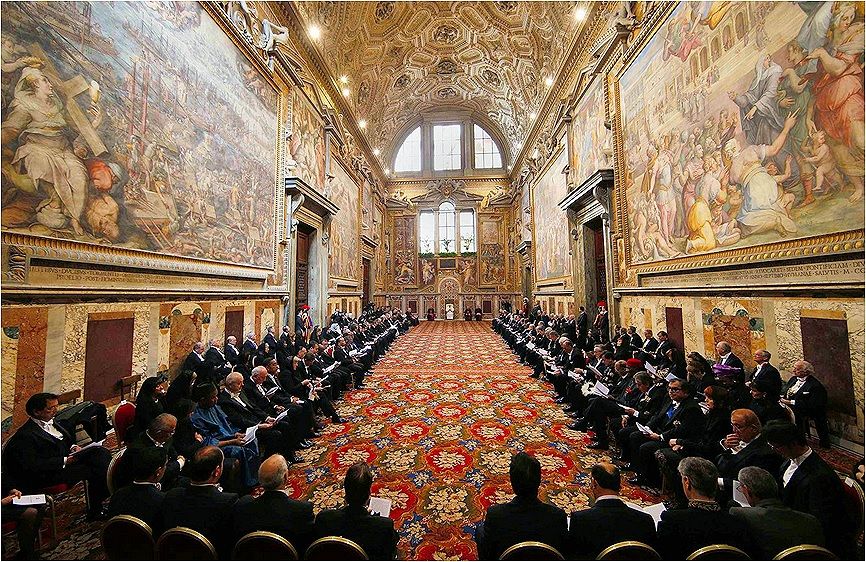
In a speech to the diplomatic corps accredited to the Holy See on Friday, Francis lamented not only the material poverty of the early 21st century but also its "spiritual poverty," meaning a rejection of God and objective standards of morality.
In that regard, Francis quoted Benedict's famous critique of a post-modern "dictatorship of relativism," delivered during a homily for the Mass in 2005 that opened the conclave that elected him pope.
(In its English translation of the pope's remarks, the Vatican actually rendered the term as "tyranny," but the idea is the same. Francis said it "afflicts the so-called richer countries particularly seriously.")
The message seemed clear: Pope Francis will try to live up to his namesake, Francis of Assisi, as a man of the poor and of peace, but that doesn't signal any retreat from the moral and cultural positions associated with the papacies of John Paul II and Benedict XVI.
"There is no peace without truth," Francis told the diplomats. "There cannot be true peace if everyone is his own criterion, if everyone can always claim exclusively his own rights, without at the same time caring for the good of others, of everyone, on the basis of the nature that unites every human being on this earth."
References to universal human nature are often shorthand in Vatican discourse for defense of traditional teaching on matters such as sexuality, marriage and the family.
Francis spoke Friday morning to representatives of 180 nations, leaving just 15 internationally recognized countries that do not have formal diplomatic relations with the Holy See.
Francis said he hoped today "will also be an opportunity to begin a journey" to establishing relations with those remaining nations, which include China, Saudi Arabia and North Korea.
Noting that one of his titles is "pontiff," meaning "bridge builder," Francis pledged to try to create "real spaces of authentic fraternity" among peoples and cultures. He said religions have a special role in that regard: "It is not possible to build bridges between people while forgetting God," he said. But he said the opposite is also true: "It is not possible to establish true links with God while ignoring other people."
In terms of hints of his foreign policy agenda, Francis placed special emphasis on dialogue with Islam, fighting poverty (both material and spiritual), building peace, and protection of the environment.
In his brief remarks, delivered in Italian, Francis did not address any specific global hot spots such as Syria, where the country's embattled Christianity minority is struggling to hold on amid a bloody civil war and rising currents of Islamic radicalism. He also did not come off the cuff, as he has often done during his first week in office, sticking entirely to his prepared text.
Friday's headline, however, is probably less about Francis and foreign policy than about Francis and ecclesial policy.
Based on Friday's speech, at least, anyone who saw his election as a repudiation of the broad philosophical and theological outlook of Benedict XVI probably has another think coming.
One footnote: For the French, it was a bit of a mini-scandal that Francis did not deliver his speech today in French, the language popes traditionally use in diplomatic settings. On background, Vatican officials say the new pope can understand both French and English, but needs time to become accustomed to using those languages in public. Aside from a few lines in Spanish, so far Francis has used Italian almost exclusively for his public remarks.
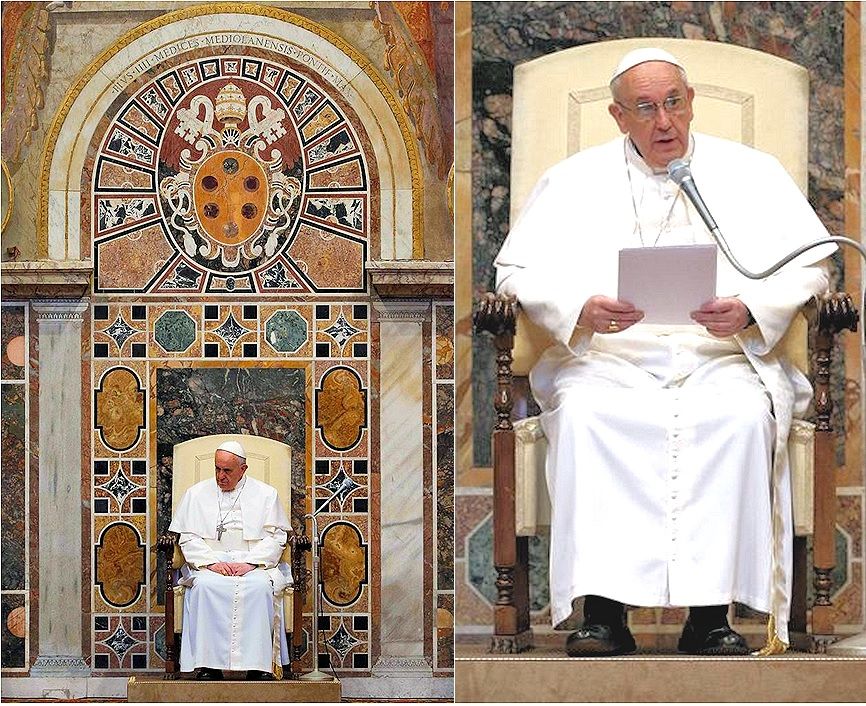 Here is the Vatican's official English translation of the Pope's address to the diplomatic corps:
Here is the Vatican's official English translation of the Pope's address to the diplomatic corps:
Your Excellencies,
Ladies and Gentlemen,
Heartfelt thanks to your Dean, Ambassador Jean-Claude Michel, for the kind words that he has addressed to me in the name of everyone present. It gives me joy to welcome you for this exchange of greetings: a simple yet deeply felt ceremony, that somehow seeks to express the Pope’s embrace of the world.
Through you, indeed, I encounter your peoples, and thus in a sense I can reach out to every one of your fellow citizens, with their joys, their troubles, their expectations, their desires.
Your presence here in such numbers is a sign that the relations between your countries and the Holy See are fruitful, that they are truly a source of benefit to mankind. That, indeed, is what matters to the Holy See: the good of every person upon this earth!
And it is with this understanding that the Bishop of Rome embarks upon his ministry, in the knowledge that he can count on the friendship and affection of the countries you represent, and in the certainty that you share this objective.
At the same time, I hope that it will also be an opportunity to begin a journey with those few countries that do not yet have diplomatic relations with the Holy See, some of which were present at the Mass for the beginning of my ministry, or sent messages as a sign of their closeness – for which I am truly grateful.
As you know, there are various reasons why I chose the name of Francis of Assisi, a familiar figure far beyond the borders of Italy and Europe, even among those who do not profess the Catholic faith.
One of the first reasons was Francis’s love for the poor. How many poor people there still are in the world! And what great suffering they have to endure! After the example of Francis of Assisi, the Church in every corner of the globe has always tried to care for and look after those who suffer from want, and I think that in many of your countries you can attest to the generous activity of Christians who dedicate themselves to helping the sick, orphans, the homeless and all the marginalized, thus striving to make society more humane and more just.
But there is another form of poverty! It is the spiritual poverty of our time, which afflicts the so-called richer countries particularly seriously. It is what my much-loved predecessor, Benedict XVI, called the "dictatorship of relativism", which makes everyone his own criterion and endangers the coexistence of peoples.
And that brings me to a second reason for my name. Francis of Assisi tells us we should work to build peace. But there is no true peace without truth! There cannot be true peace if everyone is his own criterion, if everyone can always claim exclusively his own rights, without at the same time caring for the good of others, of everyone, on the basis of the nature that unites every human being on this earth.
One of the titles of the Bishop of Rome is Pontiff, that is, a builder of bridges with God and between people. My wish is that the dialogue between us should help to build bridges connecting all people, in such a way that everyone can see in the other not an enemy, not a rival, but a brother or sister to be welcomed and embraced!
My own origins impel me to work for the building of bridges. As you know, my family is of Italian origin; and so this dialogue between places and cultures a great distance apart matters greatly to me, this dialogue between one end of the world and the other, which today are growing ever closer, more interdependent, more in need of opportunities to meet and to create real spaces of authentic fraternity.
In this work, the role of religion is fundamental. It is not possible to build bridges between people while forgetting God. But the converse is also true: it is not possible to establish true links with God, while ignoring other people.
Hence it is important to intensify dialogue among the various religions, and I am thinking particularly of dialogue with Islam. At the Mass marking the beginning of my ministry, I greatly appreciated the presence of so many civil and religious leaders from the Islamic world.
And it is also important to intensify outreach to non-believers, so that the differences which divide and hurt us may never prevail, but rather the desire to build true links of friendship between all peoples, despite their diversity.
Fighting poverty, both material and spiritual, building peace and constructing bridges: these, as it were, are the reference points for a journey that I want to invite each of the countries here represented to take up.
But it is a difficult journey, if we do not learn to grow in love for this world of ours. Here too, it helps me to think of the name of Francis, who teaches us profound respect for the whole of creation and the protection of our environment, which all too often, instead of using for the good, we exploit greedily, to one another’s detriment.
Dear Ambassadors, Ladies and Gentlemen,
Thank you again for all the work that you do, alongside the Secretariat of State, to build peace and construct bridges of friendship and fraternity.
Through you, I would like to renew to your Governments my thanks for their participation in the celebrations on the occasion of my election, and my heartfelt desire for a fruitful common endeavour. May Almighty God pour out his gifts on each one of you, on your families and on the peoples that you represent. Thank you!
I think we shall not be seeing again the chair of the Pope of Social Justice, Leo XIII, the one surmounted by the Holy Spirit and adorned with those cherubs that resembled Benedict XVI...]
[Modificato da TERESA BENEDETTA 23/03/2013 00:09] |
| |
 23/03/2013 13:11 23/03/2013 13:11 |
|
| | | OFFLINE | | Post: 26.509
Post: 8.996 | Registrato il: 28/08/2005
Registrato il: 20/01/2009 | Administratore | Utente Master | |
|
 Here are two snapshots in time of the 'adaptable' and possibly opportunistic attitudes of NCReporter's John Allen towards Joseph Ratzinger/Benedict XVI from the time he wrote a generally negative 'biography' of him in 2005, to tWO dayS after his inaugural Mass as Pope, which is when he wrote the first article posted here.
Here are two snapshots in time of the 'adaptable' and possibly opportunistic attitudes of NCReporter's John Allen towards Joseph Ratzinger/Benedict XVI from the time he wrote a generally negative 'biography' of him in 2005, to tWO dayS after his inaugural Mass as Pope, which is when he wrote the first article posted here.

    4/26/05
On this day, John Allen went on record to show his changing attitudes towards Cardinal Ratzinger and his prospects of becoming Pope and why.
Pondering the first draft of history
4/26/05
On this day, John Allen went on record to show his changing attitudes towards Cardinal Ratzinger and his prospects of becoming Pope and why.
Pondering the first draft of history
by John Allen Jr.
'The Word from Rome'

April 26, 2005
In the immediate aftermath of the election of Benedict XVI, several readers wrote, not without a tinge of schadenfreude, to remind me that in May 2002 I wrote a column predicting that Cardinal Joseph Ratzinger would not be elected pope. Others pointed out that in my "Top 20" papbile list posted on the National Catholic Reporter's Web site before the Conclave, Ratzinger's name did not appear.
So, let me acknowledge, publicly and clearly, that I did not predict this.
In my defense, however, I would note that in my revised 2004 edition of Conclave, I listed Ratzinger among the candidates to watch.
Moreover, in an April 14 story for the NCR Web site, four days before the opening of the conclave, I wrote the following: "The push for Cardinal Joseph Ratzinger, the pope's doctrinal czar for 24 years and the dean of the College of Cardinals, is for real. There is a strong basis of support for Ratzinger in the college, and his performance in the period following the death of the pope, especially his eloquent homily at the funeral Mass, seems to have further cemented that support. One Vatican official who has worked with Ratzinger over the years said on April 13, 'I am absolutely sure that Ratzinger will be the next pope.'"
On April 16, two days before the conclave, I wrote: "Despite the nonstop speculation surrounding the conclave that opens April 18, the press seems to have at least one thing right: In the early stages, the balloting will likely shape up as a 'yes' or 'no' to the candidacy of German Cardinal Joseph Ratzinger."
Hence I was not quite as off-key as some of my earlier writings might suggest. Nevertheless, it remains true that, like most commentators, my judgment was colored by some of the old bits of conventional wisdom about papal elections: that he who goes in a pope, comes out a cardinal (now false in three of the last six elections); that the 76 percent of the cardinals who are residential [diocesan bishops] would not elect a curial candidate; that a man too closely identified with the policies of the previous pontificate would not be elected; that 78 was too old. All of that, it turns out, was hogwash.
Having spoken with a number of cardinals after the election, it seems clear to me that I and most of my colleagues simply over-analyzed this election. We thought in terms of geographical blocks, political interests, and public relations concerns; the cardinals, it seems, just asked themselves who among them was the best man for the job and voted accordingly. The fact that it didn't take them long suggests it did not strike them as an exceptionally difficult judgment to make.
As I said many times in lectures and on television when asked about Ratzinger, whatever you make of his theological positions, there's no question the man has everything you'd want in a pope: intellect, experience, integrity, deep spirituality, a gift for languages, and a sense of the universal church. Moreover, the list of such men in the College of Cardinals was not especially long.
I suppose the major reason I entertained doubts about Ratzinger as a papabile is what might be called the "baggage" factor. Fairly or unfairly, in some Catholic circles Ratzinger is a lightning rod, a beloved hero among conservatives and something of a Darth Vader figure for Catholic progressives. I wondered if the cardinals would want to elect as pope someone who brought with them that kind of profile.
Every journalist covering the Vatican to some extent reflects the limitations of his or her own nationality and cultural experience, and on this point, in hindsight, I see how much of an American I was. In Africa, Asia, Latin America and Eastern Europe, Ratzinger has no such profile, except in very restricted theological circles. Cardinals from those parts of the world did not bring such concerns.
It's really only in pockets of Western Europe and North America that the broader Catholic public had any sense of the man prior to his election, explaining why some of the initial reservations about Ratzinger's candidacy came from American and German cardinals.
In the end, they too seemed persuaded that the man the world would know as Benedict XVI would not match the public profile sometimes associated with Ratzinger, whom I once dubbed "the Vatican's enforcer."
On this score, it may be that the cardinals had better instincts than I did. A CNN/USA Today/Gallup poll of American Catholics conducted shortly after the white smoke came up from the Sistine Chapel found that 31 percent had a favorable reaction to the new pope, 9 percent unfavorable, and almost 60 percent said they didn't have enough information to reach a conclusion. In other words, more than 90 percent of American Catholics already like the pope, or at least are willing to give him a chance. That's considerably less baggage than I might have guessed.
Still, nine percent of America's 65 million Catholics amounts to roughly 5.8 million people, which is a large pocket of opposition right out of the gate. Those numbers have been mirrored in polls across Western Europe. Obviously, Pope Benedict is aware that some Catholics have trepidations about where his papacy will go, and he has been at pains in the early days to calm anxieties.
In his programmatic talk on Wednesday morning, April 20, following Mass with the cardinals in the Sistine Chapel, he talked about dialogue, ecumenism, inter-religious outreach, the need for the church to witness to authentic social development, and his desire to transmit joy and hope to the world.
On Monday, April 25, in an audience with representatives of other religions, the pope said: "At the beginning of my pontificate I address to you, believers in religious traditions who represent all those who seek the truth with a sincere heart, a strong invitation to become together artisans of peace in a reciprocal commitment of comprehension, respect and love."
Make no mistake: the pontificate of Benedict XVI will be dramatic, and it will not always be comfortable for Catholics with views that might conventionally be described as "liberal" on matters of sexual morality, theological dissent, or authority in the church.
At the same time, Pope Benedict is known as a man of deep intelligence and profound love for the church, and to date there's no evidence that he intends to launch a new anti-modernist purge. (That hasn't stopped some gleeful partisans from drawing up their own enemies lists, but it's too early to know what will come of all this).
My own sense is that Benedict is a pope who may surprise all of us. Whichever way the pontificate goes, it will be fascinating to watch.
Six years ago, I wrote a biography of the man who is now pope titled Cardinal Ratzinger: The Vatican's Enforcer of the Faith. In the intervening period, I have learned a few things about the universal Catholic church and how things look from different perspectives. If I were to write the book again today, I'm sure it would be more balanced, better informed, and less prone to veer off into judgment ahead of sober analysis.
This, I want to stress, is not a Johnny-come-lately conclusion motivated by the fact that the subject of the book has now become the pope. In a lecture delivered at the Catholic University of America as part of the Common Ground series, on June 25, 2004, I said the following about the book:
"My 'conversion' to dialogue originated in a sort of 'bottoming out'. It came with the publication of my biography of Cardinal Joseph Ratzinger, issued by Continuum in 2000 and titled The Vatican's Enforcer of the Faith.
"The first major review appeared in Commonweal, authored by another of my distinguished predecessors in this lecture series, Fr. Joseph Komonchak. It was not, let me be candid, a positive review.
Fr. Komonchak pointed out a number of shortcomings and a few errors, but the line that truly stung came when he accused me of 'Manichean journalism.' He meant that I was locked in a dualistic mentality in which Ratzinger was consistently wrong and his critics consistently right. I was initially crushed, then furious. [NB: Yet during Benedict XVI's Pontificate, Fr. Komonchak was often volubly critical of Benedict XVI's reading of Vatican II!]
I re-read the book with Fr. Komonchak's criticism in mind, however, and reached the sobering conclusion that he was correct. The book - which I modestly believe is not without its merits - is nevertheless too often written in a "good guys and bad guys" style that vilifies the cardinal. It took Fr. Komonchak pointing this out, publicly and bluntly, for me to ask myself, 'Is this the kind of journalist I want to be'?
My answer was no, and I hope that in the years since I have come to appreciate more of those shades of gray that Fr. Komonchak rightly insists are always part of the story.
After Ratzinger's election as Benedict XVI was announced, I had hoped to have the opportunity to write a new preface for the book contextualizing some of the views it expresses. Unfortunately, the publisher in the United States, for reasons that I suppose are fairly obvious, had already begun reprinting the book without consulting me. Hence it is probably already appearing in bookstores, without any new material from me.
I can't do anything about that, although the British publishers were kind enough to ask me to write a new preface, which I have already done, so at least the damage will be limited in the U.K.
What is under my control, however, is a new book for Doubleday (a Random House imprint), which I hope will be a more balanced and mature account of both Ratzinger's views and the politics that made him pope. It has been in the works for some time and I hope it will be worthy of the enormity of the story, and the trust of those who elect to read it.
Quite an admission, and my comment at the time was: "Hats off to a rare journalist who admits that he was wrong and changed his ways"... Well, the change did not last beyond 3, at most 4 years, with respect to Benedict XVI...
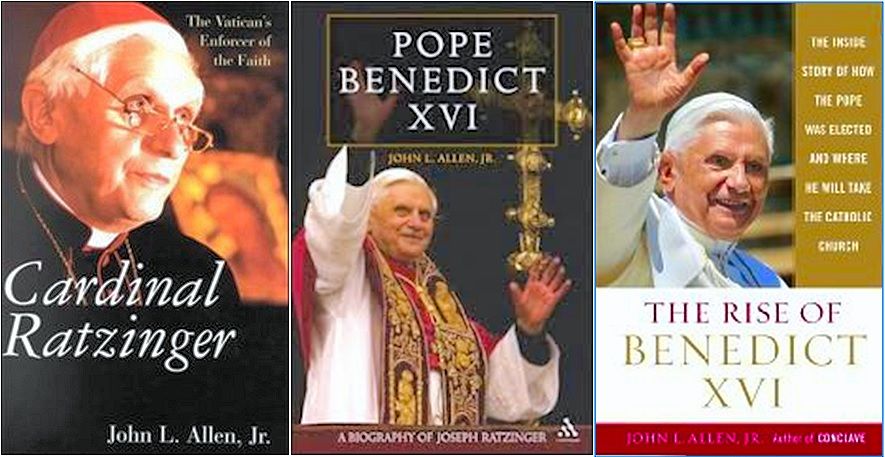 The three versions of Allen's 'biography' of Joseph Ratzinger.
Some time last year (2012), I came across this article online - which I had not seen before - while googling something else, and I thought it would make excellent Good Friday reading in a certain sense. But I somehow never found appropriate the opportunity to post it: In 2000, Fr. Vincent Twomey, who obtained his doctorate in theology at the University of Regensburg under Prof. Joseph Ratzinger, reviewed John Allen's 'biography' of Joseph Ratzinger, and gives us a very good idea of where Allen is coming from, bearing in mind that he appeared to have about 3-4 years of reversing his 2000 biases after his subject became Pope, after which he reverted to form, either because he really feels negatively about Joseph Ratzinger and/or because he is playing to the type of CINOs who read the newspaper he writes for...
A question Of fairness:
The three versions of Allen's 'biography' of Joseph Ratzinger.
Some time last year (2012), I came across this article online - which I had not seen before - while googling something else, and I thought it would make excellent Good Friday reading in a certain sense. But I somehow never found appropriate the opportunity to post it: In 2000, Fr. Vincent Twomey, who obtained his doctorate in theology at the University of Regensburg under Prof. Joseph Ratzinger, reviewed John Allen's 'biography' of Joseph Ratzinger, and gives us a very good idea of where Allen is coming from, bearing in mind that he appeared to have about 3-4 years of reversing his 2000 biases after his subject became Pope, after which he reverted to form, either because he really feels negatively about Joseph Ratzinger and/or because he is playing to the type of CINOs who read the newspaper he writes for...
A question Of fairness:
A review of John Allen's
'biography' of Cardinal Ratzinger]
Fr. Vincent Twomey, SVD

Issue of October 2001
Cardinal Ratzinger is perhaps the most controversial figure in the Church today, a subject awaiting an author. Various articles about him have appeared, but no book, until the recent appearance of that by John L. Allen, Jr., Vatican correspondent for the National Catholic Reporter.
Is it fair to Ratzinger? As a former student of the Cardinal, I must admit to having some serious misgivings.
This book, Cardinal Ratzinger: The Vatican's Enforcer of the Faith (Continuum, 2000), is a strange mixture, part early biography (ch. 1-3), part chronicle of some major controversies (4-6), part judgment on Cardinal Joseph Ratzinger's performance as "enforcer of the faith" and his chances at becoming future Pope (7-8).
Towards the end of the book, Allen describes the Cardinal as "in most ways the best and brightest the Catholic church of his generation has to offer, a musician and man of culture, a genteel intellectual and polyglot, a deep true believer" (p. 313).
Yet, Allen adds, he has left in his wake a fractured Church. [How is it that one cardinal among 200 or so could wreak so much havoc as to 'leave behind a fractured Church'? It seems to be assigning too much influence on Cardinal Ratzinger simply to be able to turn around and blame him singlehandedly for 'a fractured Church'!]
The "yet" (or its equivalent) well typifies Allen's account of Ratzinger's position on various theological and ecclesiastical issues, which is often concise, though lacking any great depth or insight, but in the final analysis is negated by some "fault" or other.
In his concluding chapter, he also offers his readers a succinct summary of the main points of what he considers to be of enduring value that remained with him after reading Ratzinger for over a year (pp. 303-6). Anyone skeptical of Allen might first read this to be assured of his good faith.
So too, Allen's accounts of various major controversies, in particular the chapter on liberation theology, are invariably interesting. How accurate they are is another matter, but the author generally tries to be fair and balanced. The crucial question is: to what extent does he succeed?
For Ratzinger, in the final analysis, remains for Allen the bogeyman that frightens most liberals, the main source of division and demoralization in the contemporary Church. He is the power-wielding churchman whose later theological views, in contrast with his earlier "liberal" stance, has had the effect, inter alia, of "legitimizing the concentration of power in the hands of the Pope and his immediate advisors in the Roman curia" (p. 309).
In other words, despite all his efforts to be fair, and Allen does make considerable efforts in that direction, the Cardinal remains the ogre.
Take, for example, Allen's account of the liberation theology saga culminating in its effective defeat as a result in large measure of Ratzinger's theological analysis, and, more importantly, it is claimed, his ecclesiastical, political machinations.
This account is not without its merits, but one's confidence in Allen's historical judgment is placed under severe strain, when he blames the Cardinal for the failure of Latin American Catholicism to create a social order that better reflects gospel values, namely less inequality between rich and poor(cf. p. 173). [Imagine that! John Paul II visited Latin America 16 or 18 times and everyone has been raving about his preferential option for that continent compared to Benedict XVI's 'neglect' once he became Pope. And now it turns out that Allen blames Cardinal Ratzinger, again singlehandedly, for the abject failure of Latin American Catholicism. My goodness! Was there ever a Church statesman who had such singlehanded power not just over the universal Church but even over the fate of a huge continent?]
One could reasonably argue that more might have been accomplished at the political level in Latin America, if liberation theologians had at the outset not been so skeptical of either Catholic social teaching or the political potential of indigenous cultural traditions of piety they later rediscovered, but that is another issue.
Allen claims that Ratzinger's attitude to other religions is negative, yet he fails to note, for example, that the Patriarch of Constantinople awarded Professor Ratzinger the Golden Cross of Mount Athos for his contribution to a greater understanding between Catholicism and Orthodoxy.
Later on, as Cardinal, he joined his former students at the Orthodox center near Geneva for a most amicable and fruitful discussion with representatives of the Greek Orthodox Church, whose tradition he frequently cites.
Allen seems not to know anything about the Cardinal's role in helping to establish diplomatic relations between the Vatican and Israel. And not a word is heard of his defense of Islam from the blanket charge of fundamentalism (cf. A Turning Point for Europe?, p.165-70) or his appreciation of the significance of primordial religious rituals and myths, as found, e.g. in the Hindu tradition (cf. ITQ 65/2, 2000, 257).
But it is above all in Allen's attempt to write a life of Cardinal Ratzinger (ch. 1-3), that the distorting effect of what seems to be the liberal's underlying fear of the bogeyman can be seen. The main tendency in these opening chapters, it would appear, is to find an explanation for the transmutation into the "enforcer of the faith" of the earlier "liberal" Ratzinger, the young and promising theologian, who as peritus to Cardinal Frings, played such an important role at the Second Vatican Council.
Joseph Ratzinger grew up in the shadow of Nazi Germany within a family that was decidedly anti-Nazi and a Church that was hostile to Hitler — though perhaps not as publicly defiant as a later generation, that did not live in those circumstances, might claim that it should have been. [It's exactly the attitude of those who criticize Pius XII for his prudence and discretion in World War II. What would they have done if they had lived under the Nazis as the Ratzingers did, or forcibly with the Nazis, as the Pope had to do?]
That experience undoubtedly had an influence on Ratzinger, as he himself expressly said. But the claim that "Ratzinger today believes that the best antidote to political totalitarianism is ecclesial totalitarianism" (p. 3), however appealing as a sound bite, does not stand up to scrutiny. DIM=8pt][Ah, but that is Allen's stock-in-trade: he is always ready to sacrifice common sense or even truth for the sake of what he thinks to be a clever sound bite! (Including those inappropriate colloquialisms that I have often remarked upon). And you can almost see him rubbing his hands is smugly, saying to himself, "What a clever boy I am!"] It is, however, the leitmotif of the whole book.
According to Cardinal Ratzinger himself, on the contrary, the best antidote to totalitarianism is the upright conscience typically associated with the poor and the weak (cf. Church, Ecumenism and Politics, p. 165-80). And the role of the Church, he once affirmed, is primarily educational — understood in the spirit of the Greek philosophers who sought" . . . to break open the prison of positivism and awaken man's receptivity to the truth, to God, and thus to the power of conscience . . . " (A Turning Point for Europe?, p. 55). [Something he recently restated very powerfully in Cuba.]
Though of central importance to Cardinal Ratzinger, both as a man and as a theologian, the primacy of conscience is not even mentioned by Allen.
More serious are insinuations about the supposed failure of Ratzinger's own family to show more overt opposition to Nazi terror. Such a judgment shows little understanding of what living in a reign of terror involves, especially for a policeman and his young family (one is reminded of the film Life is Beautiful).
Failing to note the fleeting and sketchy nature of such recollections, and unaware of other autobiographical references to that time (cf., e.g., Dolentium Hominum, no. 34,1997, p. 17), Allen claims that Ratzinger tends to be selective in his own memory of those times.
To prove that Ratzinger's positive appraisal of the role of the Catholic Church at the time was "one-sided and even distorted in its emphasis on the moral courage of the church, at the expense of an honest reckoning with its failures" (p. 30), Allen claims that "Hitler came to power on the back of Catholic support" (p. 27).
This is a serious misinterpretation of events. Allen gives no source for this or similar doubtful interpretations of events. (Indeed, his failure to give his sources is a major weakness of the book.) [And the abiding maddening vice of Vaticanistas who deal too often and too much in speculation, rather than facts, and end up citing never-named 'informed sources' to speak out the reporter's own biases.]
It would seem that here Allen is following some very biased reading of the historical events. But the reader is left with the vague, overall impression that Cardinal Ratzinger must be hiding something, or at least temporarily repressed it. And so, a shadow is cast over his youth in preparation for the emergence of the full-blown ogre in later life.
It is a cliche in popular theological circles to distinguish between the early and the late Ratzinger. He himself maintains that there is a basic continuity in his theology, a continuity that is not inconsistent with significant changes in perspective, even at times contradicting isolated claims he made in his theological youth.
He has acknowledged, for example, a significant development in his eschatology. After all, "[T]o live is to change . . . " Is it too much to suggest that the changes in his thinking might best be interpreted as signs of maturity, of further reflection due to changing circumstances and broader experience, especially as Prefect of the Congregation?
His youthful enthusiasm for collegiality, for example, led to a reappraisal of the institution of national Episcopal Conferences in the light of his own personal experience in such conferences and as a result of his further theological reflection. He also noted the failure of the German bishops during the Nazi period to act more decisively and effectively because of collective responsibility.
Instead, Allen attributes a radical change from "erstwhile liberal" to the conservative "enforcer of the faith" to four causes: the 1968 student unrest, perceptions of decline in church attendance and vocations, too much exposure to Catholic faith at its most distorted, and, finally, power.
The student unrest in the late '60s did have a profound effect on anyone who lived through that turbulent period, and he himself has on occasion referred to this, though it seems to me that his reflections on this period make use of ideas he had already formed in his earlier writings.
It is doubtful if the decline in church numbers could have had such a radical effect on him. At a discussion of precisely this topic during a meeting of his former students, he once remarked that the sin for which David was most severely punished by the Lord was not his adultery or the murder of Bathsheba's husband, but the census, the king's attempt to number the people of God.
Thirdly, his exposure as Prefect to the "pathology of the faith," as Allen calls it, is more than offset by his own wide reading in the Fathers, contemporary theology, and philosophy, not to mention literature.
His scholarly disposition to read and research finds due expression in various scholarly and general publications, the most recent being The Spirit of the Liturgy earlier last year (also not mentioned by Allen).
And so one is left with the final "cause": power. To suggest that the lust for power played a central role in any supposed "change of heart" that Professor Ratzinger revised his theology to advance his career, is (to put it mildly) mistaken, since his theological shift was manifest long before he went to Rome.
It should be mentioned that Ratzinger was never a student of Rahner, as Allen, quoting Wiltgen, claims. Nor was his move to Regensburg made in order to separate himself "intellectually from hitherto close colleagues like Kung and even his old ally, Rahner," as Adrian Hastings in a review of this book claims. Rahner at the time was at Munster, not Tubingen.
The main reason for Ratzinger's decision to leave such a prestigious university was to escape the turmoil among students and on the faculty in Tubingen, and thus be able to devote himself completely to scholarship in his native Bavaria.
This was told to me by Professor Kevin McNamara, Maynooth, in 1970 — information that led to my going to Regensburg for postgraduate studies instead of Tubingen. Later, some of Ratzinger's doctoral students and assistants at Tubingen confirmed this. (He also had personal, more familial reasons.)
Incidentally, Rahner was invited by Ratzinger to be a guest speaker at one of the end-of-semester doctoral colloquia in Regensburg. To the best of my knowledge, their theological differences (which were profound) predate Ratzinger's appointment to Tubingen. Such differences did not dull his respect for Rahner.
His so-called "change of heart" in theology, it is claimed, is reflected in the two Schulerkreise (not Studentenkreise, the term Allen uses) he is supposed to have built up: those from his years in Bonn, Munster, and Tubingen, and those from his years in Regensburg, "the latter group theologically at odds with the former" (p. 104). This division "underlines the gap between Ratzinger before and after the Council." I am mentioned as an example of the latter group.
Allen seems to have conducted fairly extensive interviews with two students of the "earlier Ratzinger," but only spoke briefly on the phone to one of the "later Ratzinger", Fr. Joseph Fessio, S.J. Considering the number of postgraduate students who studied under Ratzinger (somewhere between 40 and 50), this is slim evidence on which to base such a far-reaching thesis.
It is a pity that the author did not consult the comprehensive report on the doctoral colloquium and the later Schulerkreis by his former Assistant, Professor Stephan O. Horn, SDS (cf. Alla scuola della Verita, Milan, 1997, pp. 9-26).
Allen is wrong on several details, such as describing me as a spokesman for the Archbishop of Dublin (untrue) and citing extracts from my writings, especially that from my thesis, without any regard for the context.
And he erroneously makes Cardinal Schonborn a student of Ratzinger's, devoting several pages to the present Archbishop of Vienna to illustrate the "later Ratzinger" ( While a visiting scholar in Regensburg, Schonborn joined our colloquium for two semesters, as did other visitors. It was only after Ratzinger's elevation as Archbishop of Munich, that Schonborn became one of a number of regular guests at the annual meetings of the Schulerkreis.
It is, further, misleading to say that Ratzinger "built p" two distinct circles of students. There was never more than one, though its composition evidently changed with its members. Indeed, some of his students from his time in Bonn, Munster, and Tubingen might well be considered to number among his more "conservative" students, while others who started their studies while he was in Regensburg are held to be among his more "liberal" students.
However, it is true to say that his critical views on postconciliar developments tended in time to attract students more sympathetic to such views. More significant is the fact that all students, irrespective of their basic standpoint, felt at home in the colloquium.
This is because of Ratzinger's evident respect for each member, his quite remarkable ability to promote dialogue and discussion, and his tolerance of diverse viewpoints. I have never encountered anyone who could engender such a free and frank discussion as Professor Ratzinger could. And he gave his students total academic freedom in the choice and treatment of their topic.
It is therefore simply untrue to claim that it was at Regensburg "that Ratzinger began educating a generation of students who would go on to play a leading restoration role in their own national churches" (p. 92). He never set out to indoctrinate any group of students, as seems to be implied here.
The seminars and colloquium in Regensburg were places of intense debate and disagreement — and, it should be added, of wit and humor. It was also a time of intensive ecumenical activities for Ratzinger, including his pioneering lecture on the future of ecumenism at the University of Graz in 1976, his support for the various Regensburg Ecumenical Symposia, and the end-of-the-year doctoral colloquia with the Lutheran theologians Pannenberg and Joest, none of which Allen mentions.
What Professor Ratzinger taught us at Regensburg, primarily by his example, was to search for the truth with scholarly rigor, to be objective and respectful in debate, to risk unpopularity, and to give reasons for one's convictions.
I even heard the reproach that he had failed to form his own distinct "school," so diverse were his students and so open was the atmosphere he cultivated. In this, he has not changed with the years, as evidenced by the yearly meeting with his former students.
This characteristic of openness and dialogue is perhaps the key to understanding Ratzinger then as now: it is expressive of his concern for truth, which, he is convinced, will always prevail in the end (cf. p. 286), and explains both the primacy of conscience and the complementary role of the Church in his writings.
This in turn involves the greatest possible objectivity, the continual (personal and collective) search for what is in fact true, and so, openness to the opinions of others, and the courage to speak the truth in love (veritas in caritate!).
As a result, Ratzinger manages to preserve a certain distance from all the controversies that embroil him and his office. Contrary to what is claimed in this book he is ready to listen, is in fact a consummate listener, who once said that "All errors contain truths" (A Turning Point for Europe?, P. 108).
Consistent with this thinking is the statement in the Instruction on the 'cclesial Vocation of the Theologian'that a judgment of the Church on theological writings "does not concern the person of the theologian but the intellectual positions which he has publicly espoused".
For this reason it is strange for Allen to claim that when "Ratzinger denounces a theologian, he also implicitly rejects his theology" (p. 242). On the contrary, he, as Prefect, disciplines theologians because of their theology, not the other way around, and can only do so if they are recalcitrant in their refusal to accept the authoritative judgment of the Church, unpleasant though that may be. For Allen to underline the personal charm of Charles Curran, whom "virtually no one who knows him could construe as an enemy of the faith" (p. 258) is to miss the point completely.
Equally misleading is the claim by Curran (and others) that the methods of the congregation are "a violation of the most basic notions of due process" (p. 271). Such a comparison is invidious.
The process used in determining the objective orthodoxy of a theologian must of its nature be different from the process used in a court of law, which judges the subjective guilt of the criminal.
Likewise, the various penalties he has imposed on theologians disciplined by the Congregation are, no doubt, very much out of tune with the temper of the times, though to compare them — as has been done — with the penalties meted out to dissidents by totalitarian regimes in the twentieth century is grotesque, and deeply offensive to the dissidents. Those penalties are of course regrettable but, sadly, unavoidable.
They do, however, underline the significance the Church accords to theology. Ratzinger is simply fulfilling his responsibility as Prefect of the Congregation with which he has been entrusted, scrupulously adhering to the approved procedures.
Theology reflects on the revelation of ultimate human truth as handed on by the Catholic Church. It is concerned with our spiritual health, and is not a value-free academic discipline. In that regard, of course, it is in the same boat as any other serious human endeavor such as, for instance, medicine or law.
If someone wishes to practice alternative medicine, he or she is free to do so, but outside the canons of traditional medicine. Mutatis mutandis, that is what is at stake in Ratzinger's disciplining of certain theologians in recent years.
In passing judgment on the "enforcer of the faith" — itself a loaded term — Allen fails to appreciate the extent to which the Cardinal Prefect has in fact made the Congregation for the Doctrine of the Faith conform in the letter and spirit to the reform inaugurated by Pope Paul VI.
This was symbolized most recently, when he opened the archives of the Congregation to scholarly research (not mentioned by Allen). It is also evident in the way he takes considerable pains to give the reasons for each decision taken by the Congregation.
Few of his predecessors have provided anything like the close argumentation to be found in documents such as Donum Vitae or the two Instructions on Liberation Theology.
Though on two occasions Allen quotes from papers read by Ratzinger to meetings held between officers of his Congregation and presidents of episcopal doctrinal commissions on various continents, he misses the real import of such meetings.
They were attempts to enter into dialogue with the Asian, African, and American Churches, to bring the center to the periphery, as it were, to listen, to promote debate.
That Ratzinger did listen was clear to us, when at the annual meeting of his Schulerkreis, he spoke informally about various events of the previous year involving his Congregation. While in Zaire, he evidently appreciated the adaptation of the Mass to African culture, including the incorporation of ritual dance in that liturgy. He was impressed with the caliber of the Asian theologians he experienced at first hand in Hong Kong.
Apart from the seminars on papal primacy, Allen seems unaware of various other seminars organized by the Congregation under his direction to listen to and learn from experts from around the world on controversial questions, for example, in moral theology and bioethics.
Neither is there any mention of the publication by the Pontifical Biblical Commission (under his direction) of the important document on biblical interpretation.
In addition, Cardinal Ratzinger has continued to lecture and publish in his own name as a theologian, inviting criticism. The bibliography of his publications (including secondary literature) up to 1997 covers some 101 pages. And he continues to publish. Last year alone, for example, saw the publication of two major books, one an extended interview with a German journalist.
That he listens and responds to serious objections is illustrated by his readiness to enter into public debate, as in his extensive interview (covering two full pages) with the Frankfurter Allgemeine Zeitung (22 September 2000) on hostile reactions to Dominus Iesus.
Finally, far from trying to centralize power in Rome, he has been heard to complain that, because the local bishops fail to act (or feel powerless to act when faced with a theologian who has built up his own international network), his Congregation is often reluctantly drawn into the controversy.
Allen's account of the case of Fr. Tissa Balasuriya would have been more credible, if Allen had taken the trouble to investigate the way this particular case ended up in Rome.
Allen describes a book quoted by Ratzinger (in a discussion of the pluralist theology of religions) as having a reputation for being "tendentious and error-prone, down to small details such as citing the wrong page" (p. 240, again no source is given for this serious accusation). This is really the kettle calling the pot black.
As I have briefly described, Allen's book is error-prone, down to small details of German spelling. It is certainly tendentious, illustrated not only by its subtitle but above all by the uncritical way he quotes accusations made by hostile witnesses, such as Hans Kung, without ever questioning their objectivity or veracity. And, apart from those gaps already mentioned, there are other serious lacunae. [The same defects are evident in his articles! But one must say that I cannot think of a single MSM Vaticanista writing about Joseph Ratzinger/Benedict XVI who does not generally fall into the same uncritical marshalling of hostile opinion - which they don't even try to challenge at the time the false or fallacious statements are made to them!]
There is, for example, no appreciation of Ratzinger's writings in areas such as spirituality, politics, and ethics. Many of his sermons, meditations, and retreat talks have been published, even in English, but his rich spirituality does not merit Allen's attention.
Neither is there any treatment of his substantial body of writings on politics and ethics. International recognition of his unique contribution to the field of politics and ethics came when he was appointed a "membre associe etranger" at the Academie des Sciences Morales et Politiques of the Institut de France" on 7 November 1992 in Paris, taking the seat vacated by the death of the Soviet dissident [and nuclear physicist] Andrei Sakharov. One searches in vain for any reference to this significant fact in Allen's book.
Allen is neither a theologian nor a historian. And yet, despite its drawbacks, his book gives the reader who otherwise might not even glance at any of Cardinal Ratzinger's writings a little taste of their richness.
He conveys something of the importance of this largely underestimated theologian holding one of the central offices in the Church at this tempestuous yet exhilarating time in history. But the price to be paid is a rather black and white approach to a man who is far more subtle, charming, and courageous than the man portrayed here.
The book is unable to convey the richness and diversity of Ratzinger's theology, which is not "derivative," as some anonymous theologian quoted by Allen claims, but highly original and seminal, covering a vast range of subjects with refreshing clarity, insight, and, yes, optimism.
Hopefully, its publication may prompt others to study his original writings, to judge for themselves — and so to enter into dialogue with one of the truly great contemporary thinkers.
Reverend Vincent Twomey, S.V.D., was ordained in 1970. He completed his doctorate at the University of Regensburg, Germany (1971-78) under the supervision of the then Professor Joseph Ratzinger. He taught theology first at the Regional Seminary of Papua New Guinea and the Solomon Islands then at the SVD Faculty at Modling, Austria, and is at present Lecturer on the Faculty of Theology, Pontifical University, Maynooth, Ireland.
When Allen rewrote his Cardinal Ratzinger 'biography' into The Rise of Benedict XVI: The Inside Story of How the Pope Was Elected and Where He Will Take the Catholic Church in 2005, he wrote that this time, he tried "to be fair to all sides and viewpoints", acknowledging that the first book was 'unbalanced', since it was written "before I arrived in Rome and before I really knew a lot about the universal church". The first book, he said, "gives prominent voice to criticisms of Ratzinger; it does not give equally prominent voice to how he himself would see some of these issues".
It takes a lot of chutzpah to write a biography of a man as accomplished and multifaceted as Cardinal Ratzinger is - and as consequential as Allen made him out to be (though he clearly over-reached) - and choose to write only about those aspects that would support a thesis that the writer is setting out to 'prove' with the book. And not even seek to interview the subject even once!
Why then would Allen have chosen such an ambitious project, knowing full well the effort was above and beyond him at the time he undertook it - and before coming to Rome even! I surmise that he very shrewdly planned to use it as his calling card to instant recognition, as it were, as he set about to make the contacts that he was able to establish in and around the Vatican. The prospective contacts would have thought, "He must be somebody if he wrote the first English biography of Cardinal Ratzinger! It will pay to cultivate him."
It was an especially effective ploy because in the book, he apparently marshalled together all the negative attitudes and hostility against Cardinal Ratzinger by people in the Vatican hierarchy and in the world of Catholic reporting in Italy, attitudes that had begun to coalesce after the publication of The Ratzinger Report in 1994. Hostility from people in the Vatican who did not appreciate the cardinal's candor about the crisis of faith in the Church, and from the liberal media who did not appreciate his open criticism of the progressivist mis-interpretation of Vatican II.
Fr. Twomey was perhaps too charitable to point out a most glaring error in Allen's account of the Pope's childhood, in which he uses an encyclopedia description of Aschau/Chiemgau to describe one of Joseph Ratzinger's childhood places (where he received his first Communion, among others), instead of the correct Aschau am Inn, a modest place 70 kms away from the very touristic Alpine foothill Aschau/Chiemsgau. To make such an elementary mistake is more than embarrassing. It is irresponsible. Thus, caveat emptor. As authoritative as Allen always sounds - and as infallible as much of the Anglophone world appears to consider him - he is only human. Still, he is an excellent reporter, as long as he fact-checks his own stories before posting, but has become, in the Benedict XVI years, a more and more questionable because tendentious analyst of Church affairs, especially of the Papacy.

[Modificato da TERESA BENEDETTA 23/03/2013 14:10] |
| |
 23/03/2013 14:11 23/03/2013 14:11 |
|
| | | OFFLINE | | Post: 26.510
Post: 8.997 | Registrato il: 28/08/2005
Registrato il: 20/01/2009 | Administratore | Utente Master | |
|

 Saturday, March 23. Fifth Week of Lent
Saturday, March 23. Fifth Week of Lent
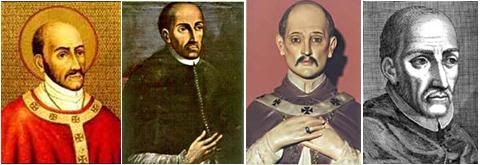 ST. TORIBIO DE MOGROVEJO (b Spain 1538, d Peru 1606)
ST. TORIBIO DE MOGROVEJO (b Spain 1538, d Peru 1606)
Missionary, Bishop, Patron Saint of Latin American Bishops
In 2012, a most appropriate saint of the day as Benedict XVI begins an apostolic visit to Latin America, and
in 2013, because the new Pope was a bishop in Latin America. St. Toribio was a brilliant professor of canon
law at the University of Salamanca when Phillip II named him Grand Inquisitor in Granada. He was scrupulous in
rendering justice to all who came before him to the point that some accused him of being heretical. When he was 40,
the King named him to be Bishop of Lima, Peru, where the colonial administration had serious problems with
a corrupt clergy. In vain
he argued that he was not qualified for such a position, but he left for Peru in 1579, serving as missionary
and administrator for the next 27 years until his death. In Lima, he confirmed the girl who would become Santa
Rosa de Lima, and was a confessor to the priest who would become San
Martin de Porres. After 1590, he also had
the assistance of the priest who would become St. Francis Solano. Toribio was beatified in 1679 and canonized in 1726.
Readings for today's Mass: www.usccb.org/bible/readings/032313.cfm
WITH THE HOLY FATHER TODAY
In the morning, Pope Francis met with
- His Beatitude Ibrahim Isaac Sidrak, Patriarch of Alexandria of the Copts, who was recently elected to succeed
Cardinal Antonios Naguib, who retired for health reasons.
At 11:45 a.m., he flew to Castel Gandolfo for a meeting and lunch with Pope Emertus Benedict XVI, returning
to the Vatican shortly after 3 pm.
 One year ago today...
One year ago today...
Pope Benedict XVI began his apostolic visit to Mexico (March 23-26), after which he would proceed to visit Cuba (March 26-28).
 The narrative that has been peddled by the Anglophone MSM about the Pope's trip to Mexico and Cuba is openly negative and quite sickening. What could possibly generate this kind of animus that the reports specifically make Benedict XVI the scapegoat no matter how far-fetched the association is?
The narrative that has been peddled by the Anglophone MSM about the Pope's trip to Mexico and Cuba is openly negative and quite sickening. What could possibly generate this kind of animus that the reports specifically make Benedict XVI the scapegoat no matter how far-fetched the association is?
In Mexico, the main party-pooping claim is that Mexicans are so enamored of John Paul II that they couldn't care less - or even look down upon - the current Vicar of Christ; and secondarily, that he is not meeting at all with any of the victims of Fr. Marcial Maciel, Mexico's most notorious prelate of the 20th century and the only founder of a modern ecclesial movement to have been found to be an outright unholy man and a criminal! [Not that there have been any demands at all for such a meeting by Maciel's victims, who are well aware that Joseph Ratzinger/Benedict XVI had nothing to do at all with their misfortune or with coddling Fr. Maciel; and who do not seem to associate him at all with John Paul II.]
In Cuba, the rap is that the local Church has been conniving with the Communist government - never mind that such 'connivance' has resulted in thousands of political prisoners having been released by the government through the Church's mediation, and that media considered the rapprochement between that government and the local Church as the object of hosannahs at the time the breakthrough was marked by John Paul II's visit to Cuba. Why the rapprochement is now seen as blameworthy and nefarious - as Benedict somehow giving his unqualified blessing to the Cuban government - can only be explained by irrational bias against Benedict.
Of course, the assault on the head of the Roman Catholic Church is an assault on the Church itself - and maybe, it is a measure of what the secular media think of Benedict XVI's leadership that they feel they can best strike at the Church by running him down. With all that in mind, consider this report from a major newspaper chain in the Americas.
Benedict's visit to Mexico
brings ache for John Paul II
by Tim Johnson
McClatchy Newspapers
MEXICO CITY — The imminent visit of Pope Benedict XVI to Mexico is drawing little excitement, underscoring the stark differences between this Pontiff and his predecessor, John Paul II, a figure beloved to Mexicans.
Since the moment John Paul II descended from a jetliner in 1979 and kissed Mexican soil, on the first of five visits, Mexicans felt he held their nation close to his heart.
In contrast, Pope Benedict, who arrives Friday in Mexico, is "the antithesis of John Paul II. He is not very charismatic," said Maria de las Heras, head of the Demotecnia public opinion firm.
An opinion survey by her company earlier this month found that 77 percent of Mexican Catholics feel indifferent to the pontiff's visit or are less enthusiastic about it than they were to John Paul's...... etc. ad nauseam...You get the idea...
News agency stories on the day of the Pope's departure:
Pope in Latin America
in shadow of John Paul

Mexico City, March 23 (Reuters) - A ghost will be following Pope Benedict at every step of his trip to Mexico and Cuba -- that of his predecessor John Paul.
John Paul, who died in 2005, was a huge draw in many places. But, apart from his native Poland, nowhere was he a more towering figure than in Latin America, visiting every one of the region's countries at least once.
He drew oceanic, throbbing crowds, sloshed through swampy slums in Ecuador, challenged Maoist guerrillas in the Peruvian highlands and defended miners' rights in Bolivia... etc ad nauseam... [In short, a superman far above and beyond the humble and meager gifts of his successor to ever hope to even approach in stature! How much more insulting can they be to Benedict XVI. The distressing part is that MSM does not think there's anything wrong at all with their eternal comparison games, even if they have been proven wrong time and again!]...
The headline as the Pope left Rome:
Pope uses cane at airport
at start of trip
By FRANCES D'EMILIO

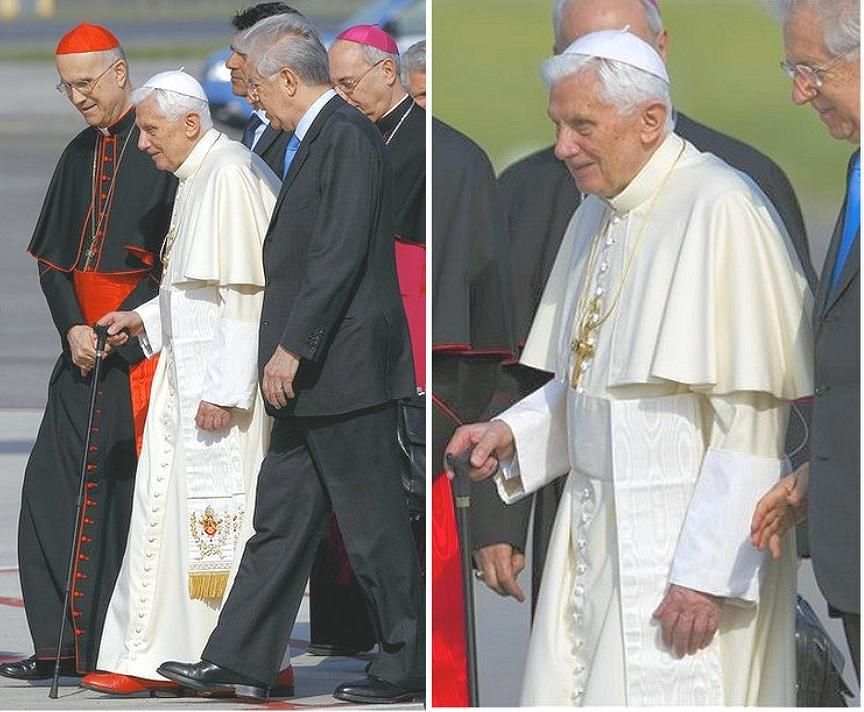 Then Italian Prime Minister Mario Monti saw the Holy Father off at the airport.
Inflight, he talks to newsmen about
On sharing Mexico's griefs and difficulties, and
Then Italian Prime Minister Mario Monti saw the Holy Father off at the airport.
Inflight, he talks to newsmen about
On sharing Mexico's griefs and difficulties, and
on Marxist ideology no longer responding to reality

March 23, 2012
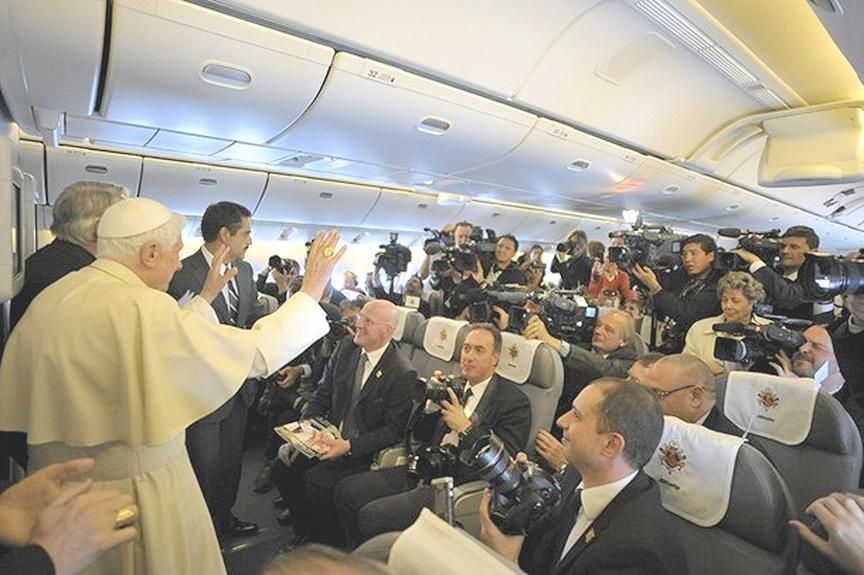 Papal inflight Q&A:
Papal inflight Q&A:
On sharing Mexico's griefs and difficulties, and
on Marxist ideology no longer responding to reality

March 23, 2012
En route to Mexico, Pope Benedict XVI spoke with journalists travelling with him aboard the Papal plane.
Responding to a question about how he felt at the outset of the six-day visit to Latin America, especially in view of the first leg of the visit, to Mexico, the Holy Father said,
It is for me a great joy, one that responds to a desire I have had for a long time...The words of the Second Vatican Council come to mind: gaudium et spes, luctus et angor – joy and hope, but also grief and anguish. I share the joys and the hopes, and I also share the griefs and the difficulties of the great nation [of Mexico....I go there to encourage and to learn, to comfort in faith, in hope and in charity, to comfort with the commitment for good and the commitment to fight evil. Let us hope that the Lord helps us.
Asked what role the Church has in combating the scourge of drug trafficking and drug-related violence in Mexico, Pope Benedict said,
We know well the beauties of Mexico, but also this enormous problem of narcotics trafficking and violence. It is certainly a great responsibility for the Catholic Church, in a country in which 80 percent of the people are Catholic. We must work against this evil, which is destructive of mankind and [especially] of our youth...
The first task is to proclaim God: God the judge, God who loves us, but loves us [in order to pull us] toward the good, toward truth, and away from evil. The Church's great responsibility, therefore, is to educate consciences, to educate in the moral responsibility and to unmask evil, to unmask this idolatry of money that enslaves men; to expose these false promises, lies, deceits – we must see that humanity needs the Infinite.
If there is no God, then the infinite creates its own paradises, an appearance of infinities which is only a lie. So, it is very important that God is present and accessible - that is a great responsibility. To have God our judge who leads us, draws us towards the truth and to faith. The Church unmasks evil by rendering present the goodness of God, his truth, the true infinite. It is the great duty of the Church...But we must all do it together, more and more...
Asked about whether the Church is doing enough in Latin America, "a region of strong social contrasts, where the very rich live alongside the very poor", he answered:
Of course, the Church must always ask herself whether she is doing enough for social justice on this great continent. It is a question of conscience that we must always ask ourselves - what should the Church do, what can she not do, what should she not do?
The Church is not a political power, it is not a party - it is a moral entity, a moral power. In fact, politics should fundamentally be a moral reality. The Church must act along that fundamental track. So I will repeat what I said earlier: the first thought of the Church is to educate consciences and thus create the necessary responsibility. It must educate consciences in individual ethics as well as public ethics.
In this perhaps, there may well be a lack. One sees in Latin America and elsewhere, among not a few Catholics, a certain schizophrenia between individual and public morality... In the private sphere, they are believers, but in their public life, they follow other paths that do not correspond to the great evangelical values that are necessary for the foundation of a just society.
So the Church must educate to overcome this schizophrenia, educate not only towards an individual morality but towards a public morality, and we must seek to do this with the Social Doctrine of the Church. This public morality must be reasonable, shared and able to be shared even by non-believers, a morality of reason.
Of course, we, in the light of faith, can see many things better with reason. But faith also serves to liberate us from false interests. With the social doctrine, we can create substantial models that will help overcome these social divisions. It is for this that we must work hard. The important thing is a common rationality towards which the Church offers a fundamental contribution, and which must always help in educating consciences for individual responsibility as well as for public life.
The arrival and welcome:
At least 600,000 greet
the Pope in Leon
Translated from

March 24, 2012
LEON, Mexico - The welcome by the people of Leon for Benedict XVI at his arrival in Mexico yesterday constituted a truly unexpected start for his current visit to Latin America.
Record crowds - such as those that turn up only for truly great occasions - welcomed the Pope, starting from the festive and most lively welcome ceremony at the airport of Leon-Guanajuato and along the 34 kms of highway traversed by the Popemobile on the way to the city of Leon.
Semi-official numbers cited by Fr. Federico Lombardi, Vatican spokesman, at a briefing for journalists estimated the crowds at 600,000-700,000.
The panorama of people who did not want to miss the occasion of seeing the first Pope to visit this part of Mexico was unusually warm and celebratory, acclaiming the Pope with happy cheering and chanting, waving yellow-and-white Vatican flaglets as well as balloons in the colors of the Vatican. [Those who are familiar with the enthusiastic participation of Mexican pilgrims at the General Audiences and Angelus gatherings at the Vatican can well imagine that enthusiasm multiplied a hundred-thousandfold.]
At the airport, there was the inevitable Mexican mariachi music, and during the entire welcome ceremony, the crowds never tired chanting the Pope's name or the slogan, 'Benedicto, hermano, ya eres Mexicano" (Benedict, brother, you are now Mexican').
The youth presence was overwhelming. And there was a whole variety of signs along the route with the photo of the Pope, and the slogan 'Mexico siempre fiel' (Ever faithful Mexico).
As the papal motorcade entered the city of Leon, people clambered on rooftops, perched on billboards and climbed trees the better to see the Popemobile.
"The Pope was very pleased and impressed with the welcome," Fr. Lombardi said. He added that the Pope was 'in good health, in fantastic condition".
Papa Ratzinger's self-assuredness was evident even in the fluidity with which he answered the questions during the inflight Q&A towards the start of the 14-hour flight from Rome to Leon, during which he touched the major points of this papal visit to Mexico and Cuba....
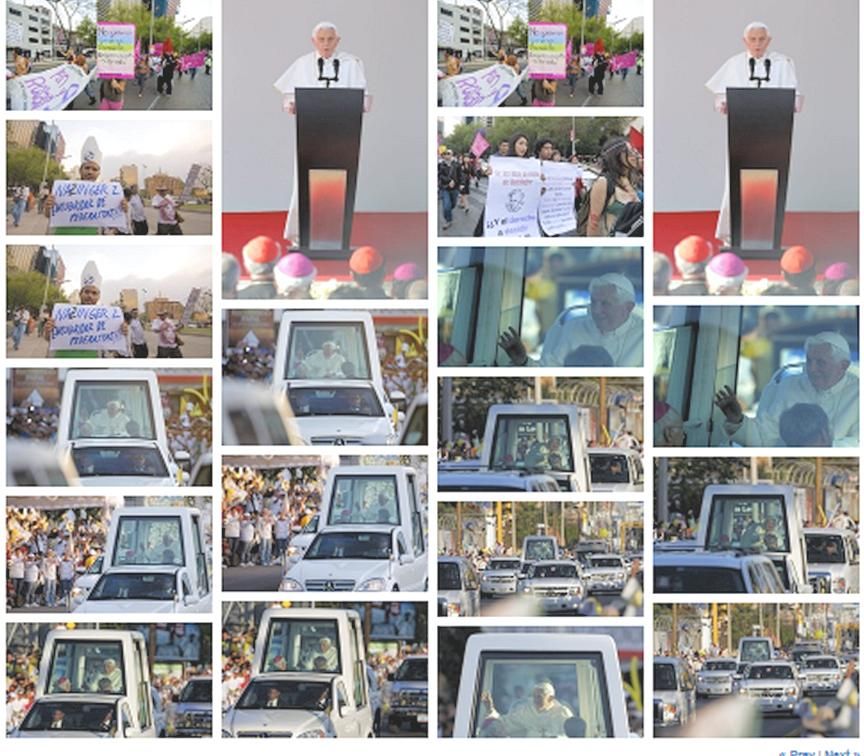 And once again, the MSM got it all wrong, DEO GRATIAS! Reading their pre-visit stories, one would have thought only the proverbial 'four cats' would show up for this Pope. God provides! Even for simple humble workers in his vineyard.... And I am infinitely reassured that the Mexican pilgrims with an always-enthusiastic presence at the Vatican audiences are more typical of Mexican Catholics than all those diehard John Paul II fans who reject Benedict XVI offhand but who seem to be the only Mexicans ever quoted in the MSM stories leading up to Benedict XVI's visit.
The AP, in its story, did not provide any numbers - for Benedict XVI, they usually don't, especially if the crowds are much larger than they had predicted or even imagined...Nevertheless, the reporters had to report what they saw:
Pope arrives in Mexico,
And once again, the MSM got it all wrong, DEO GRATIAS! Reading their pre-visit stories, one would have thought only the proverbial 'four cats' would show up for this Pope. God provides! Even for simple humble workers in his vineyard.... And I am infinitely reassured that the Mexican pilgrims with an always-enthusiastic presence at the Vatican audiences are more typical of Mexican Catholics than all those diehard John Paul II fans who reject Benedict XVI offhand but who seem to be the only Mexicans ever quoted in the MSM stories leading up to Benedict XVI's visit.
The AP, in its story, did not provide any numbers - for Benedict XVI, they usually don't, especially if the crowds are much larger than they had predicted or even imagined...Nevertheless, the reporters had to report what they saw:
Pope arrives in Mexico,
denounces violence

GUANAJUATO, Mexico, March 23 (AP) - Pope Benedict XVI has begun a pilgrimage to the New World by calling on Mexicans to conquer an "idolatry of money" that feeds drug violence and urging Cuba to leave behind a Marxism that "no longer responds to reality".
The Pope's plane set down on Friday afternoon in Guanajuato, a deeply conservative state in sun-baked central Mexico, and his route into the city of Leon was thronged with thousands of people eager to get a glimpse of the Pontiff.
Mexican President Felipe Calderon and first lady Margarita Zavala greeted the Pope and escorted him along a red carpet amid clanging church bells and cheers from a crowd waving Vatican flags. A swelling throng gathered to cheer him along his path from the airport on his first visit to Spanish-speaking Latin America.
"Benedict, brother, you are now Mexican," people shouted. ['BENEDICTO, HERMANO - YA TU ERES MEXICANO']
Volunteers led the crowds in chants of "Benedicto! Benedicto!" as passing drivers pounded their horns in encouragement. Vendors sold Benedict buttons, T-shirts, Vatican flags and key chains with the image of the Pope and the Virgin of Guadalupe.
The pontiff, who turns 85 next month, descended the stairs without the cane he had used when he walked to the plane in Rome, the first time he had walked with it in public.
Upon his arrival, Benedict referred again to the everyday violence that ordinary Mexicans confront, saying he was praying for all in need "particularly those who suffer because of old and new rivalries, resentments and all forms of violence".
He said he was coming to Mexico as a pilgrim of hope, to encourage Mexicans to "transform the present structures and events which are less than satisfactory and seem immovable or insurmountable while also helping those who do not see meaning or a future in life".
After the Alitalia plane carrying the Pope landed, the streets of Leon took on a carnival atmosphere. Police blocked traffic on the central boulevard the Pope would travel, and people lined up three and four deep on both sides of the avenue. Everyone stopped to watch the arrival on restaurant and shop televisions.
"Mexico is standing because we're a country that perseveres with hope and solidarity, we're a people with values and principals that believe in family, liberty, justice and democracy," Calderon said in a speech on the tarmac to cheers of "Viva!" from the crowd. "Your visit fills us with joy in moments of great tribulation."
Benedict acknowledged the historic nature of John Paul's first trip to Mexico - the first by any Pope. The 1979 visit, just months after being elected Pope and his first foreign trip, came at a time when Mexico's anti-religion laws were so restrictive that John Paul II was technically breaking the law by wearing clerical garb in public...
The week-long trip to Mexico and Cuba, Benedict's first to both countries, will be a test of stamina for the Pope, who is due to arrive in Cuba on Monday.
Many businesses and schools closed for the day in Leon, and thousands of people were travelling in on buses from across the country.
Benedict XVI himself would have 24 hours to rest at the nuns' convent in the Colegio de Miraflores of Leon, where he stayed, before his next public event on the program.
 [Modificato da TERESA BENEDETTA 25/03/2013 23:07] |
| |
 23/03/2013 15:11 23/03/2013 15:11 |
|
| | | OFFLINE | | Post: 26.511
Post: 8.998 | Registrato il: 28/08/2005
Registrato il: 20/01/2009 | Administratore | Utente Master | |
|

 Watch these videos - we can even hear Benedict XVI greeting Pope Francis at the very start... I did not think we would be privileged to see these images... Although expected to happen, the unprecedented nature of the event, with these images, has become even more overwhelming..
video.repubblica.it/dossier/il-nuovo-papa/l-abbraccio-tra-i-due-papi/123289/121...
video.repubblica.it/dossier/il-nuovo-papa/papa-francesco-incontra-ratzinger-le-prime-immagini/123273/121...
Watch these videos - we can even hear Benedict XVI greeting Pope Francis at the very start... I did not think we would be privileged to see these images... Although expected to happen, the unprecedented nature of the event, with these images, has become even more overwhelming..
video.repubblica.it/dossier/il-nuovo-papa/l-abbraccio-tra-i-due-papi/123289/121...
video.repubblica.it/dossier/il-nuovo-papa/papa-francesco-incontra-ratzinger-le-prime-immagini/123273/121...
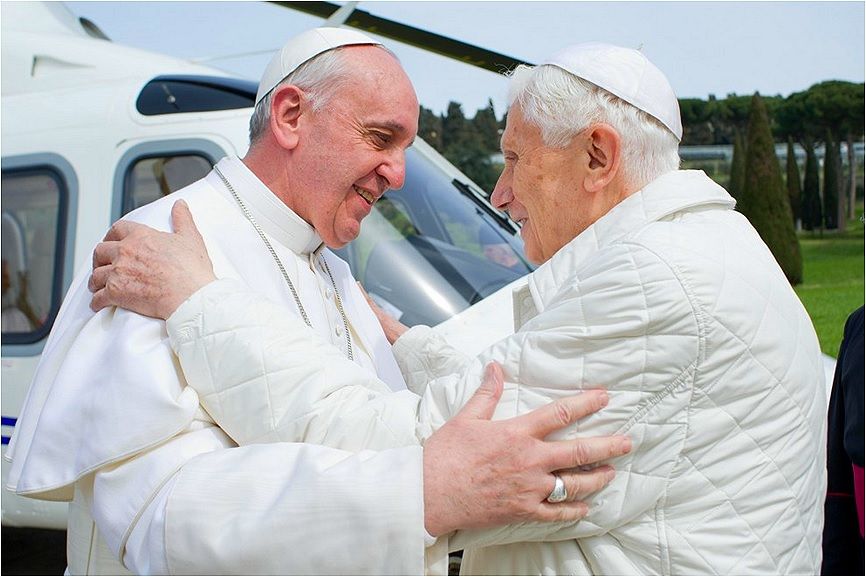 The visit of the Holy Father Francis
The visit of the Holy Father Francis
to Pope Emeritus Benedict XVI at Castel Gandolfo
Translated from

March 23, 2013
At 11:45 this morning, the Holy Father Francis left the Domus Sanctae Marthae for the Vatican heliport, where he took the brief flight to visit Pope emeritus Benedict XVI in Castel Gandolfo.
After a flight of about 15 minutes, the helicopter landed at the heliport of the Pontifical Villas in Castel Gandolfo where he was welcomed by Benedict XVI.
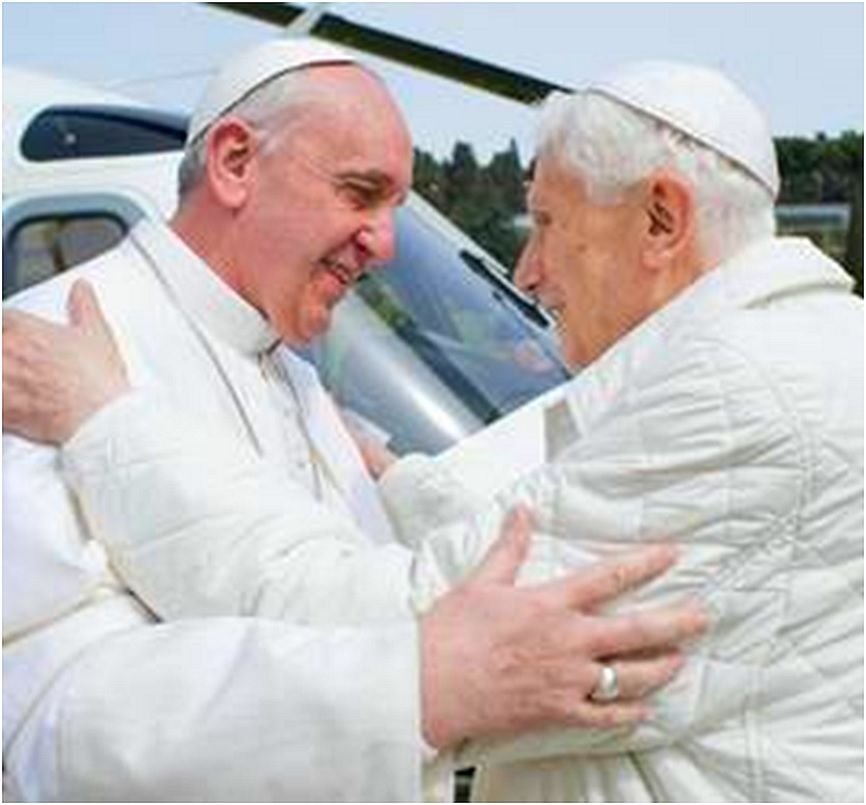
Also present were Mons. Marcello Semeraro, Bishop of Alban, and Dott. Saverio Petrillo,, director of the Pontifical Villas.
The Holy Father and Benedict XVI rode together in a car to the Apostolic Palace. After a moment of prayer at the Palace chapel, they met at in the library starting at 12:30 p.m. Their meeting lasted 45 minutes.
Afterwards, they were joined at lunch by Monsignors Georg Gaenswein and Alfred Xuereb [who has been named private secretary to Pope Francis].
After lunch, Pope Francis, accompanied by Benedict XVI, returned to the heliport, from which he left at 2:42 pm for the Vatican.
Following is the account provided by Vatican news director Fr. Federico Lombardi about the event:
The helicopter landed in the Castel Gandolfo heliport at 12:15, and the car with the emeritus Pope approached the helicopter.
The Holy Father Francis stepped out, accompanied by Deputy Secretary of State, Mons. Angelo Becciu, Mons. Leonardo Sapienza [regent of the Pontifical Household), and Mons. Alfred Xuereb.
As soon as the Pope stepped down, the emeritus Pope approached him. and there was a beautiful embrace between them.
After brief greetings to the other persons who came to welcome the Pope - the Bishop of Albano and the director of the Pontifical Villas - Francis and Benedict got into a car. Francis sat on the right, where the Pope always sits, and Benedict XVI sat to his left.
Also riding with them was Mons. Georg Gaenswein, Prefect of the Pontifical Household. The car took them up to the elevators to the Apostolic Palace.
The two protagonists of this historic meeting went up to the papal apartment, where they first stopped at the private chapel for a moment of prayer.
In the chapel, the emeritus Pope indicated the place of honor for the Pope, but Pope Francis said, "We are brothers", and preferred that they both kneel together at the same kneeler.
After the prayer, they proceeded to the private library where they began their private meeting at 12:30. It is the library where the Pope normally receives important visitors at Castel Gandolfo.
Pope Francis brought a beautiful icon of Mary as a gift for the emeritus Pope. Their meeting ended at 1:15, thus lasting 45 minutes.
Regarding the habits they wore, it was as we had announced from the start - the emeritus Pope was in a simple white cassock without a capelet or sash, whereas Pope Francis wore the papal capelet and sash.
They were joined at lunch by the two secretaries - Mons. Gaenswein and Mons. Xuereb - therefore the strictly private meeting between the Pope and his predecessor was that in the library.
The emeritus Pope will accompany Pope Francis to the heliport, when he returns to Rome. [Apparently, this briefing was given while the two were having lunch.]
I must remind you that although this was their first meeting in person [since Pope Francis was elected], Pope Francis has acknowledged his predecessor several times - first at the Loggia of Benedictions when he first came out to be presented to the world, and then in two telephone calls (on the night of the election itself, and on the Feast of St. Joseph, to extend his best wishes on the name day of the emeritus Pope). So they have spoken to each other before their physical encounter today.
Let us also recall that the emeritus Pope manifested his unconditional reverence and obedience for his successor at his farewell meeting with the College of Cardinals on February 27.
With this meeting today - which was one of most elevated and profound communion - he would therefore have had the opportunity to renew his pledge of reverence and obedience to his successor. Just as Pope Francis would have renewed his expression of gratitude from himself and from the whole Church for the ministry carried out by Pope Benedict during his Pontificate.
Pope Francis tells Benedict:
'We're brothers'
By NICOLE WINFIELD and PAOLO SANTALUCIA

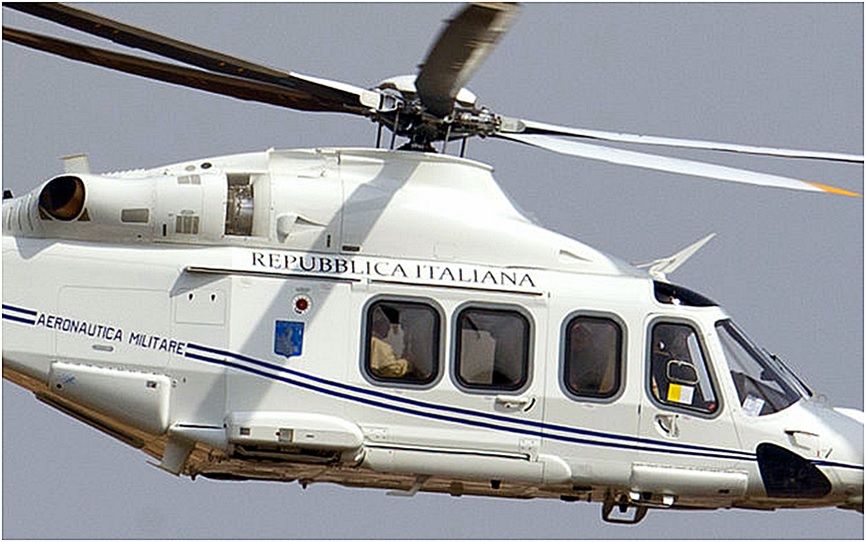
CASTEL GANDOLFO, March 23, 2013 Italy (AP) — Pope Francis has traveled to Castel Gandolfo to have lunch with his predecessor Benedict XVI in a historic and potentially problematic melding of the papacies that has never before confronted the Catholic Church.
The Vatican said the two popes embraced on the helipad. In the chapel where they prayed together, Benedict offered Francis the traditional kneeler used by the pope. Francis refused to take it alone, saying "We're brothers," and the two prayed together on the same one.
Outside the villa, the main piazza of Castel Gandolfo was packed Saturday with well-wishers hoping to catch a glimpse of history: two popes breaking bread together and presumably discussing the future of the Catholic Church. They chanted "Francesco! Francesco!"
Vatican spokesman Rev. Federico Lombardi said he understands Benedict offered his pledge of obedience to the new pope, while Francis thanked Benedict for his ministry. He said they both wore white, though Benedict was in a simple cassock without the traditional sash and cape worn by Francis.
Benedict has been living at the papal summer villa since he resigned Feb. 28, the first pope to step down in 600 years. He has said he plans to live out his final years in prayer and remain "hidden from the world."
Benedict's dramatic departure that day — flying by helicopter from the helipad in the Vatican gardens with his weeping secretary by his side and circling St. Peter's Square in a final goodbye — is one of the most evocative images of this remarkable papal transition.
The Vatican is downplaying the luncheon in keeping with Benedict's desire to remain in private and not interfere with his successor's papacy. There was to be no live coverage of the private meeting by Vatican television, only a few still photos from the official Vatican photographer and perhaps a video released after the fact.
The Vatican said Benedict was at the helipad in the villa gardens to welcome Francis, and that the two were meeting in Benedict's library and having lunch together. Francis will then return to his makeshift home at the Vatican hotel at an unspecified time later in the day.
The Vatican spokesman promised a general comment about the meeting, but no detailed statement.
All of which has led to enormous speculation about what these two men in white might have to say to one another after making history together: Benedict's resignation paved the way for the first pope from Latin America, the first Jesuit, and the first to call himself Francis after the 13th century friar who devoted himself to the poor, nature and working for peace.
Perhaps over their primo, or pasta course during Saturday's lunch, the two popes might discuss the big issues facing the church: the rise of secularism in the world, the drop in priestly vocations in Europe, the competition that the Catholic Church faces in Latin America and Africa from evangelical Pentecostal movements.
Or maybe during their secondo, or second course of meat or fish, they'll discuss more pressing issues concerning Francis's new job: Benedict left a host of unfinished business on Francis's plate, including the outcome of a top-secret investigation into the leaks of papal documents last year. Francis might want to sound Benedict out on his ideas for management changes in the Holy See administration, a priority given the complete dysfunctional government he has inherited. [But not quite as 'dysfunctional' as what Benedict XVI himself inherited. 'Dysfunctional' is not the right word, anyway. A mere 2,000 men = some of them blackguards, apparently, as there are in any institution, but mostly sincere servants of Christ and the Church - have been helping the Pope administer to the needs of more than 5,000 bishops and the army of priests ministering directly to 1.2 billion Catholics. That's not dysfunctional, even if the environment within the Roman Curia has always been polluted by the bureaucratic pettiness and even skullduggery that plagues any human institution.]
Then over coffee, they might discuss the future of Monsignor Georg Gaenswein, Benedict's trusted aide who has had the difficult task of escorting his old pope into retirement and then returning to the Vatican to serve his successor in the initial rites of the office.
Gaenswein, who wept as he and Benedict made their goodbyes to staff in the papal apartment on Feb. 28, has appeared visibly upset and withdrawn at times as he has been by Francis's side. [Has he? I have not watched all the Francis videos so I cannot tell. But I would be surprised if the well-bred, well-mannered Mons. Gaenswein would indicate any ungraciousness at all, regardless of what he feels within.]
The Vatican has said Francis's primary secretary will be Monsignor Alfred Xuereb, who had been the No. 2 secretary under Benedict. [Bravo! for Mons. Alfred, a logical choice as someone who already knows the Vatican routine - and since apparently Cardinal Bergoglio did not have a private secretary.]
Benedict's resignation — the emeritus pope's personal choices about his future — have raised the question of how the Catholic Church will deal with the novel situation of having one reigning and one retired pope living side-by-side, each of them called "pope," each of them wearing papal white and even sharing the same aide in Gaenswein.
[The media, as usual, has been trying to create a problem where there ought to be none! And shockingly, someone who articulates that 'problem' today is no less than Vittorio Messori, in an article for Corriere della Sera, in which he says that having Benedict XVI live within the Vatican is an anomalous situation [to say that, as the rest of MSM has been prone to do, is to cast doubt on the common sense of both Francis and Benedict XVI!], that it would be best for everyone concerned if he went off to a monastery somewhere - he suggests the south of France because of the climate - where the needs of an 86-year-old man can also be attended to. I will translate the article later.
Francis, Benedict and the whole world know there is only one Pope at a time. No Catholic anywhere is confused. True, there were some Wojtylians who never got over the fact that another person was Pope after John Paul II died, but I certainly hope that not even the most rabid Benaddict could possibly be that refractory. It would be a betrayal of the Catholic doctrine that Benedict XVI taught so clearly and unequivocally, especially by his voluntary renunciation. The Pontificate is an apostolic mission that is transmitted in succession to different individuals, one at a time. Benedict's title and address are honorific - the way all previous Popes have been referred to, the only difference being that he is still alive. And very well aware he is now emeritus, with absolutely none of the prerogatives and powers of the regnant Pope. And I don't think anyone could possibly think that Pope Francis has had any second thoughts about his being Pope, nor about his self-assurance (for want of a better word) as the Bishop of Rome, reluctant as he is to call himself Pope (though the word which still retains its original meaning of 'father').]
After a few months in Castel Gandolfo, Benedict is to return to the Vatican to live in a converted monastery in the Vatican gardens, just a short walk from St. Peter's Basilica and the shrine devoted to the Madonna where Francis went to pray on one of his first walks as pope. [The shrine to Our Lady of Lourdes, where Benedict used to end his afternoon 'rosary walks' with his secretary(ies).]
Pope Francis once again showed great sensitivity and utmost consideration for the emeritus Pope in not taking advantage of his first visit to Castel Gandolfo to 'take possession' of the Apostolic Palace and not greeting the crowd from the outer balcony of the Palace, as one might have expected him to do. It underscores that for him, the only purpose of going to Castel Gandolfo today was to meet with his predecessor...
[Modificato da TERESA BENEDETTA 25/03/2013 06:50] |
| |
 23/03/2013 19:10 23/03/2013 19:10 |
|
| | | OFFLINE | | Post: 26.512
Post: 8.999 | Registrato il: 28/08/2005
Registrato il: 20/01/2009 | Administratore | Utente Master | |
|
 NB: I apologize for the uneven quality of the photos which I have been picking up from more than one site as well as from videocaps, and therefore, the exposures vary according to the source and according to the lighting of the original photo ...
THE MEETING
NB: I apologize for the uneven quality of the photos which I have been picking up from more than one site as well as from videocaps, and therefore, the exposures vary according to the source and according to the lighting of the original photo ...
THE MEETING
Some of the audio which could be heard on the Repubblica video:
At the heliport, the first words we hear are from Benedict:
"Good morning! Thank you for your visit. The sun also greets us... Thank you!"
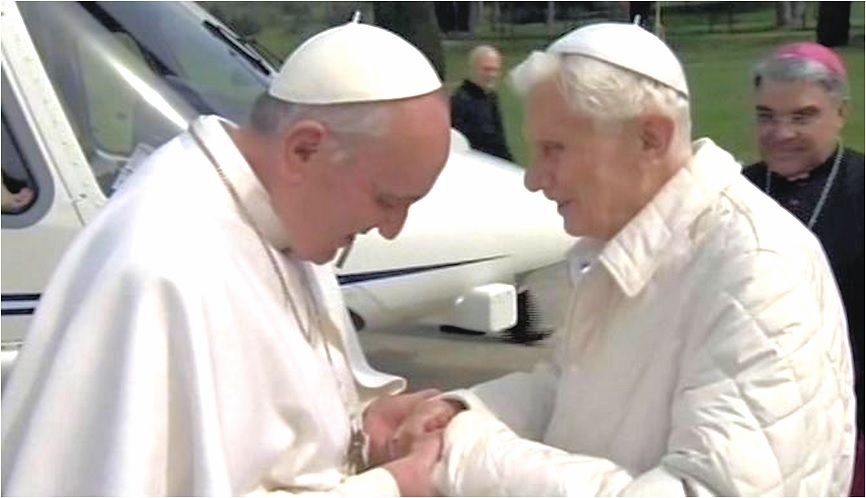
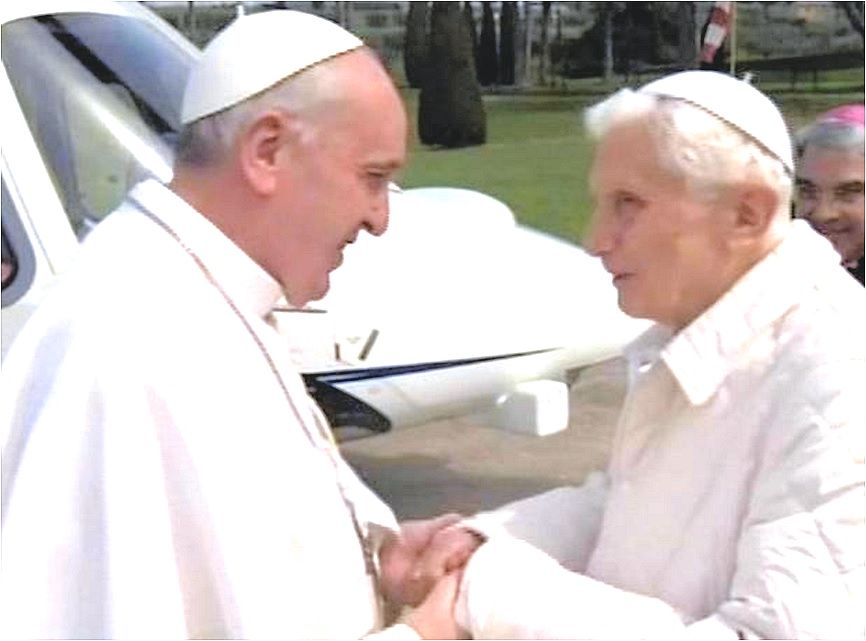
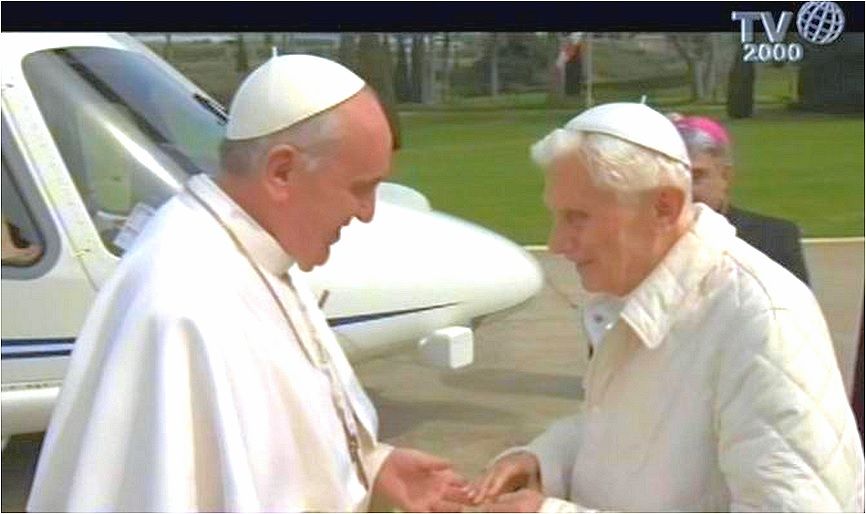
In the chapel at Castel Gandolfo:
When B16 indicates that he will go to the first pew behind the central kneeler for the Pope, Francis precedes him to the pew instead. B16 protests, "The Pope is the Pope. We must respect protocol," but the Pope tells him, "We are brothers". So both kneel at the same pew.
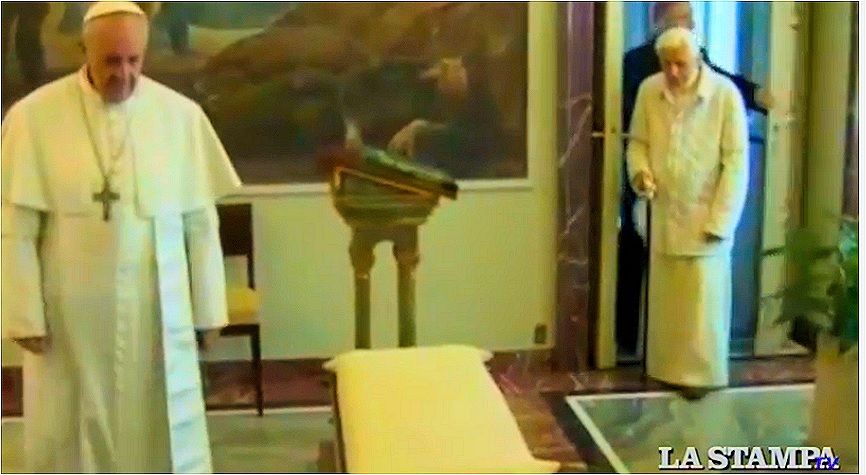
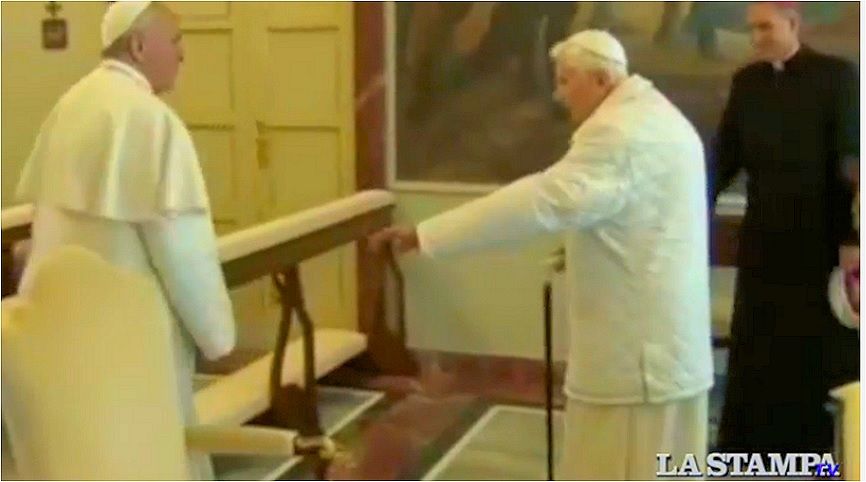
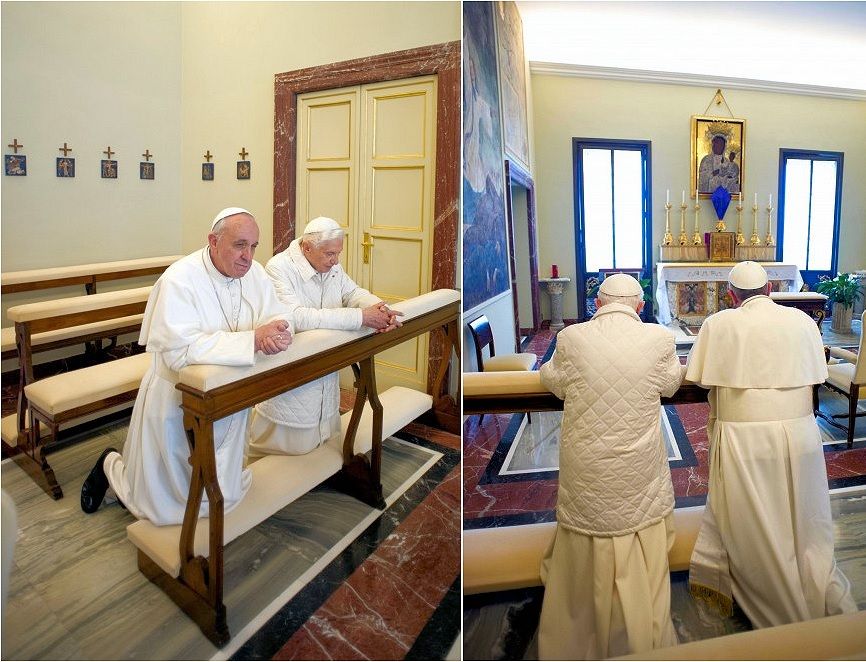
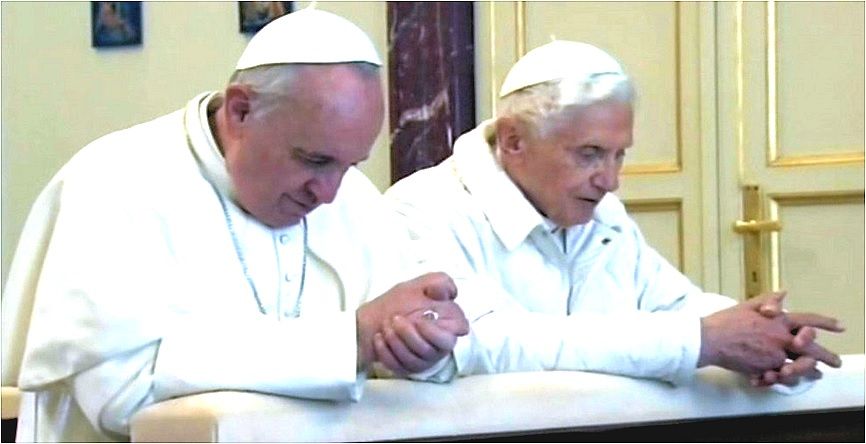
Salvatore Izzo of AGI reports that when Pope Francis presented a Marian icon to Benedict, he said: "I was told that the image repsetns Our Lady of Humility. And when they told me that, I immediately thought of you, of so many examples of humility and tenderness that you gave us during your Pontificate".
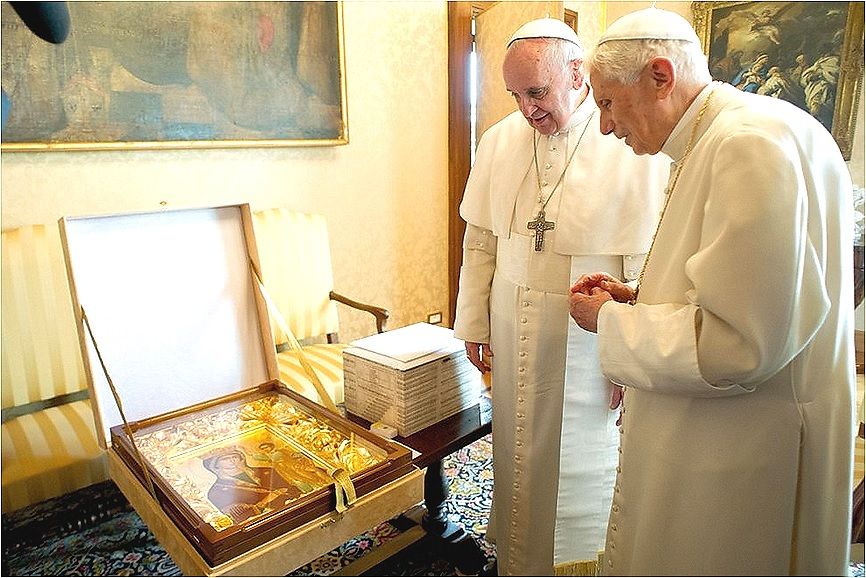
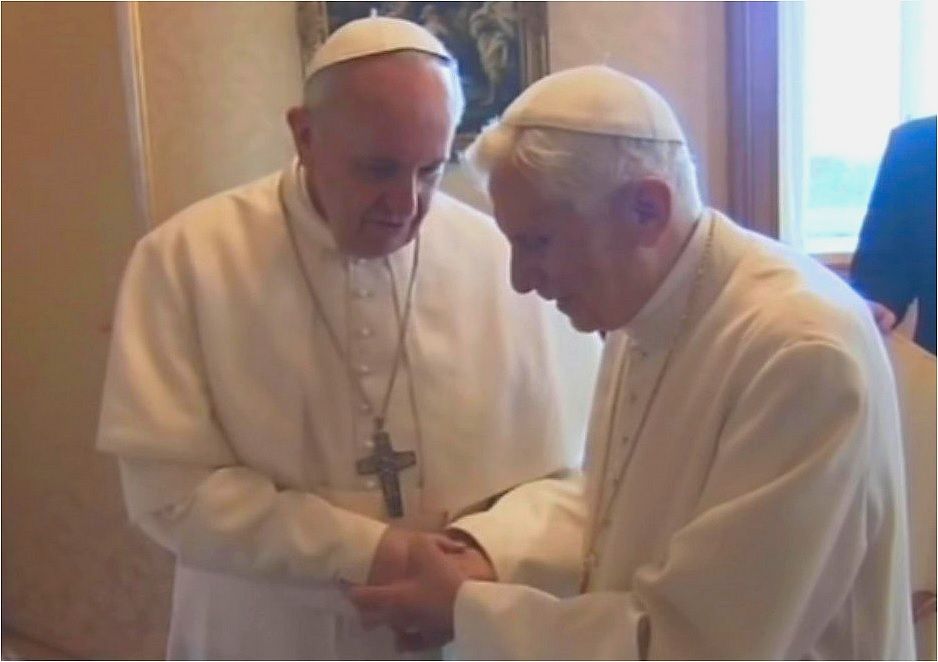
In the library: For the first time, we see Benedict XVI seated in the guest chair... Note the white document box on the table - presumably containing the notes and documents that Benedict XVI believes will be useful to his successor.
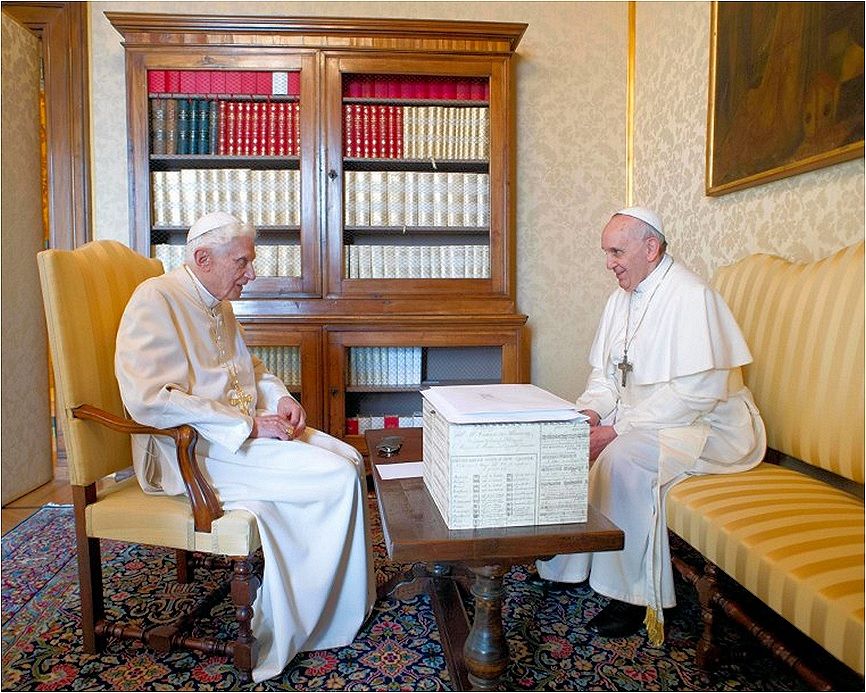
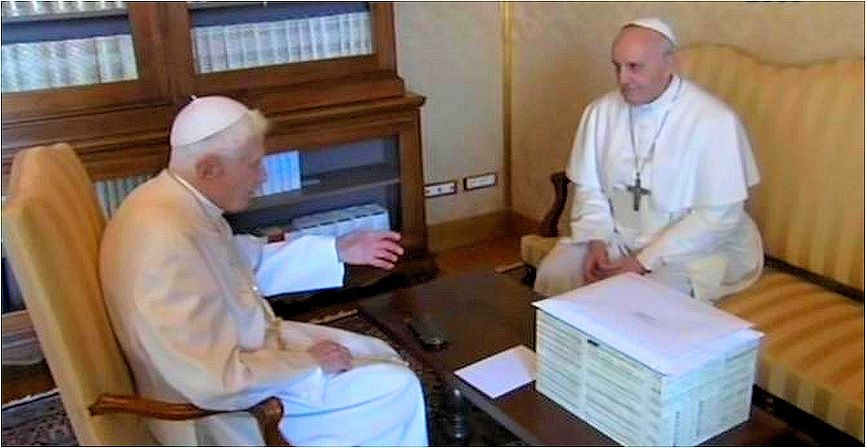
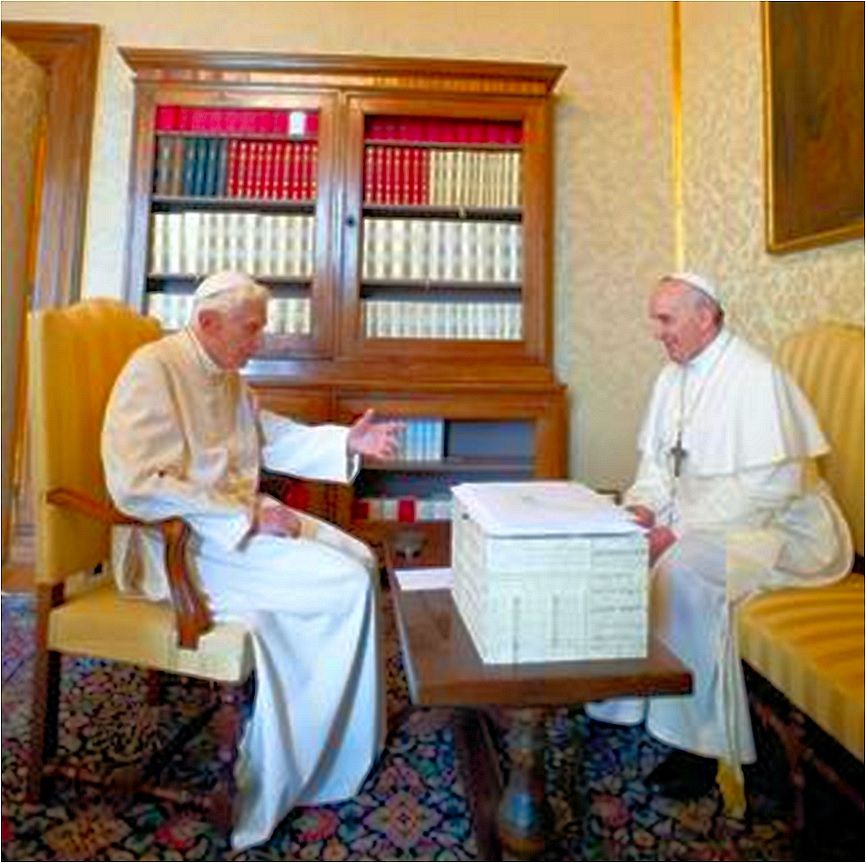 I'm trying to gather all the images I can and post them here, because after today, Holy Week follows, and who knows when we shall get to see any new images of B16 again! Or any news about him, now that Pope Francis has paid him this most awaited visit... Perhaps B16 may attend some Holy Week services at the parish church of Castel Gandolfo?... It was so beautiful to see him today not just on still photos but on video. With the first TV image of him, Fidel Castro's famous remark in 2005 that "he has the face of an angel" immediately came to my mind. He looks very serene, but we are reminded poignantly of why he decided to renounce in that sequence where they enter the chapel, and, moving slowly with his cane, he follows several steps behind Pope Francis...God bless Benedict XVI and God bless Pope Francis!
I'm trying to gather all the images I can and post them here, because after today, Holy Week follows, and who knows when we shall get to see any new images of B16 again! Or any news about him, now that Pope Francis has paid him this most awaited visit... Perhaps B16 may attend some Holy Week services at the parish church of Castel Gandolfo?... It was so beautiful to see him today not just on still photos but on video. With the first TV image of him, Fidel Castro's famous remark in 2005 that "he has the face of an angel" immediately came to my mind. He looks very serene, but we are reminded poignantly of why he decided to renounce in that sequence where they enter the chapel, and, moving slowly with his cane, he follows several steps behind Pope Francis...God bless Benedict XVI and God bless Pope Francis!
[Modificato da TERESA BENEDETTA 25/03/2013 06:56] |
| |
 24/03/2013 12:30 24/03/2013 12:30 |
|
| | | OFFLINE | | Post: 26.513
Post: 9.000 | Registrato il: 28/08/2005
Registrato il: 20/01/2009 | Administratore | Utente Master | |
|
 I frankly do not understand why Messori considers this an issue or unresolved at all...
The unresolved issue of Benedict XVI's
I frankly do not understand why Messori considers this an issue or unresolved at all...
The unresolved issue of Benedict XVI's
residing within the Vatican
by Vittorio Messori
Translated from

March 23, 2013
These recent weeks, there has been extended use (sometimes abuse) of the adjectives 'historical' and 'epochal'. But today's event deserves some emphasis: the encounter - in an atmosphere which will certainly be of great fraternal solidarity - between the reigning Pope and the emeritus is absolutely unprecedented.
As has been reiterated many times these days, there have been examples of 'papal renunciation' in the past, but in turbulent times, such as episodes within the context of the struggles between Popes and anti-Popes.
The only precedent that is somehow similar to what took place on February 11 is that of Celestine V. Who certainly was not embraced by his successor, since Boniface VIII immediately concerned himself with neutralizing the resigned Pope fearing that he might revoke the abdication. The final outcome was that the former Pope Pietro da Morrone - after escapes attempted on land and by sea - ended his days, at age 86, in a cell that was not in a monastery but in a fortress where he was imprisoned by his predecessor.
So nothing to do at all with the meeting to take place today in Castel Gandolfo. Perhaps we shall learn nothing about it, except in the posthumous diaries of either Joseph Ratzinger or Jorge Mario Bergoglio.
And yet, not just every journalist covering the religion beat but also every church historian, will be hanging on what will happen at the unprecedented meeting.
The former Archbishop of Buenos Aires was made a cardinal in the Consistory of 2001 under John Paul II. But it is certain that his nomination would have carried the endorsement of the then Prefect for the Doctrine of the Faith. Cardinal Ratzinger very much appreciated that Bergoglio was one of the few South American Jesuits who disapproved of the Marxist perspective of liberation theology, for which he became the target of criticisms and accusations by his fellow Jesuits.
So today's meeting will not be between a 'conservative' and a 'progressivist' - as gross ideological reading would have it - but between two servants of the Church who are aware that there is a difference between Christian charity and class warfare, between religious homily and political tirade, between a priest of Christ and a guerrilla.
Nor will it be a meeting between a young man and an old man - Bergoglio is almost the age Ratzinger was when he was elected Pope.
Knowing the refined thoughtfulness of Ratzinger, I would dare say that he will abstain from giving any advice, but limit himself to calling attention to the main problems that have remained unresolved.
There has been talk that Benedict XVi prepared some sort of memorandum for his successor in bearing the heavy burden of Peter. It may be so, but one can suppose that, even in this case, the intention would be informative and not 'pedagogical', as though the new Pope needed to be instructed.
The emeritus Pope has said clearly before his departure from the scene: His intention was to remain 'hidden from the world", but to continue serving the Church on prayer, certainly not collaborating in the governance of the Church, however discreet.
But then, there remains the question many have asked: Would not staying 'within Peter's paddock' make this intention of remaining 'hidden' difficult?
I must say that even if I had not anticipated Benedict XVI's decision to renounce the Pontificate, I had reflected many times about the possible refuge for a Benedict XVI forced by age and the burden of the task to leave his ministry.
I thought first of all of his native Bavaria, where there are still many Benedictine abbeys in magnificent sites, often in forests surrounded by mountains. But advanced age and frail health would keep him from going to any place with a severe Alpine climate.
What about southern Italy? I thought of Calabria, the Charterhouse of Serra San Bruno, resting place of the order's founder? Benedict XVI made a pilgrimage there two years ago. But a charterhouse is no place for a man of advanced age who will eventually need constant physical assistance.
The monks of San Bruno live isolated in cells that open, on one side, to the cloister, and on the other, to the gardens and orchards they have to tend. The small infirmary will certainly be inadequate.
If I had been asked to suggest the right place for an emeritus Pope to stay hidden, I would not have hesitated to point to Provence, in the Vaucluse, at the feet of Mont Ventoux. To be more precise, in the locality called Le Barroux.
There, the climate is not just ideal and the landscape enchanting, but here, in 1970, an abbey arose which Joseph Ratzinger liked so much that he often visited there for a few days, sometimes incognito, sometimes on official visit.
The founder, dom Gerard, who did not want to accept after Vatican II that Benedictines could be forbidden to use Latin for the liturgy, had left his own monastery to found one which would continue Tradition and return to strict observance of St. Benedict's Rule.
Here Gregorian chant is performed with such perfection that their recordings on CD are appreciated throughout the world. The abbey attracts many young men as novices, attracted by the austerity of life in the abbey.
Having often experienced myself that place of great fascination, I learned from the superiors that, first as cardinal and later as Pope, Benedict XVI had confided that it could be his final refuge.
Instead, here he is in Castel Gandolfo provisionally, and perhaps definitively, in a building in the Vatican Gardens. The emeritus Pope has said that even this physical nearness to the tomb of Peter is a sign that he has not abandoned the Church and will continue his service through prayer. He has indicated that there would be no problems of 'coexistence' with the reigning Pope since he is in retirement.
The problem may seem secondary but it is not, especially to those familiar with the ecclesial ambience and its nuances. It is clear that Pope Francis will welcome any decision made by his predecessor, but it is also possible that this is one of the issues they will discuss today - an unprecedented development in a Church that thought she had experienced everything after two centuries.
Everything but this singular 'con-dominium' of a reigning Pope and the emeritus Pope in the tiny territory of Vatican City State.
[Why and how could this be a problem or an issue at all? Benedict XVI will surely not be issuing bulletins commenting on his successor's decisions, nor will he be granting media interviews. It isn't even clear if he will continue to publish anything new. For Messori, of all people, to have any doubts about this is very puzzling - especially as he says explicitly that Knowing Joseph Ratzinger as he does, he cannot imagine him volunteering any advice for the new Pope. Moreover, he seems to ignore all the practical considerations for why the emeritus Pope could not possibly live elsewhere than the Vatican - security (no special arrangements and expenses have to be made if he continues to live in the Vatican), protection from malicious arrest (from those who insist against all facts on blaming him for the sexual abuses of priests), preventing the creation of a 'pilgrimage' site wherever else he would be living. And if the reigning Pope, who is very secure about being Pope (and why not?), does not mind, why should anybody else?]
 |
| |
 25/03/2013 13:04 25/03/2013 13:04 |
|
| | | OFFLINE | | Post: 26.514
Post: 9.001 | Registrato il: 28/08/2005
Registrato il: 20/01/2009 | Administratore | Utente Master | |
|

 Palm Sunday, March 24
Palm Sunday, March 24
Sunday of the Passion of our Lord
Readings for today's Mass: www.usccb.org/bible/readings/032413.cfm
Today's saint:
 ST. CATERINA DA GENOVA [Catherine of Genoa] (Italy, 1447-1510), Mystic
ST. CATERINA DA GENOVA [Catherine of Genoa] (Italy, 1447-1510), Mystic
Benedict XVI dedicated his catechesis on January 20, 2011 to this saint
www.vatican.va/holy_father/benedict_xvi/audiences/2011/documents/hf_ben-xvi_aud_20110112...
Born to one of the most historic families of Genoa, Caterina wanted to be a nun at age 13 but she was too young. However, she married a fellow noble youth at age 16. her husband turned out to be unfaithful and a wastrel, so she herself turned to a life of pleasure. When she was 26, a mystic vision during confession converted her. She became an example to her husband who eventually became a lay Franciscan. But he had brought them to financial ruin, and they now dedicated themselves to charitable work at Genoa's largest hospital. When her husband died, Caterina became manager of the hospital. For 25 years, she resisted having a spiritual adviser but 12 years before her death, she found one who would later publish Caterina's memoirs of her mystic experiences. From this, a Dialog of the Soul and the Body and a Treatise on Purgatory became popular spiritual works after her death, inspiring both St. Robert Bellarmine and St. Francis de Sales. She was canonized in 1737. Benedict XVI dedicated his catecheses on 1/12/11 to her as one of the great female figures of the medieval Church.
AT THE VATICAN TODAY
The Holy Father Francis presided at the procession, blessing of the palms and Eucharistic Celebration at
St. Peter's square. Homily and Angelus.
 One year ago today...
One year ago today...
The second day of Benedict XVI's apostolic visit to Mexico
 The Holy Father had a rest of almost 24 hours between his arrival in Mexico and his first events the next day - an afternoon meeting with the Mexican President and a greeting to the children of Mexico from the balcony of the official residence overlooking Guanajuato's Plaza de la Paz. In the morning, he celebrated Mass at the chapel of the convent in Colegio de MIraflores, Leon, where he stayed during the visit.
The Holy Father had a rest of almost 24 hours between his arrival in Mexico and his first events the next day - an afternoon meeting with the Mexican President and a greeting to the children of Mexico from the balcony of the official residence overlooking Guanajuato's Plaza de la Paz. In the morning, he celebrated Mass at the chapel of the convent in Colegio de MIraflores, Leon, where he stayed during the visit.
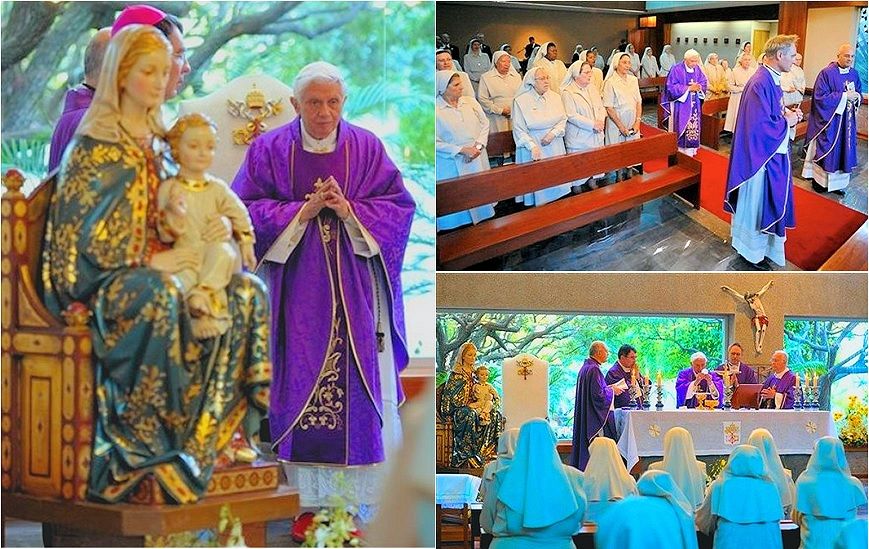
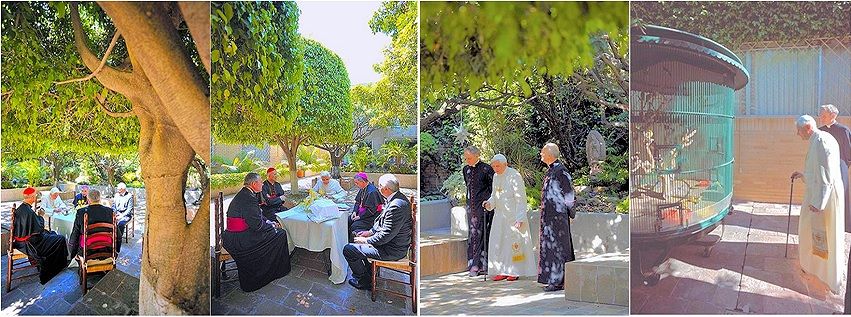
He started the day by celebrating morning Mass as he usually does, with his two secretaries concelebrating, only this time with the convent nuns in attendance, and after a meeting with the Bishop of Guajuanato and others, strolled around the gardens with the two secretaries.
It was very instructive - and most fascinating - to examine the way MSM, typified by AP, pivoted on a dime in its-reporting of the Mexicans' welcome for Benedict XVI. After days of crowing - one would say gloating - that Benedict XVI would be lucky if even the proverbial four cats turned up to see him, much less to welcome him, "so overwhelming is Mexico's love and devotion for his predecessor that they have no room at all in their hearts for any other Pope", or so their storyline went.
Oh no, Benedict XVI, mere mortal, had no prayer of a chance to come anywhere near the place John Paul II, immortal hero and soon-to-be-saint, had carved for himself in the hearts of the Mexicans. Quoting, of course, only those Mexicans who did feel that way. As though they typified all Mexican Catholics... As though the reporters had never seen or heard - even if only on TV - the Mexican pilgrims who are invariably a loud and devout presence at every GA and Angelus of Benedict XVI at the Vatican or Castel Gandolfo.... As though the reporters had not been proved wrong again and again since Benedict XVI's first trip abroad to Cologne in thinking he could never possibly draw the crowds John Paul II did. But why do they keep bashing their heads repeatedly against, literally, the Rock?
Nonetheless, one must admire the fact that the AP reporters were not embarrassed at all to file such diametrically opposed stories about the actual welcome compared to what they had predicted earlier with unabashed Schadenfreude...The headline to the AP's lead story today tries to cover up their previous (and persistent) 'mis-underestimation', as George W Bush would say, not just of Benedict XVI but of the particular hold that the figure of the Pope has for the Catholic faithful..
Pope's arrival in Mexico
sparks surprising emotion
By MICHAEL WEISSENSTEIN and ADRIANA GOMEZ LICON

LEON, Mexico, March 24 (AP) -- It had become tradition in Mexico. Before daybreak, youths would creep as close as security permitted and serenade their beloved Pope John Paul II with a song of greeting and celebration.
Now a new, less familiar pope had come, seeking to strengthen his own ties with the largest Spanish-speaking Catholic nation.
So well before dawn Saturday, two dozen youths from a Guadalajara church group gathered near the school where the Pope Benedict XVI was staying. "We sang with all our heart and all our force," said Maria Fernanda de Luna, a member of the group. "It gave us goosebumps to sing 'Las Mananitas' for him."
Songs, joyful throngs, church bells and confetti welcomed Benedict as he began his first trip to Mexico, a celebration that seemed to erupt spontaneously out of what had been a thin, sun-dazed crowd.
As Pope Benedict XVI's plane appeared in the shimmering heat of Friday afternoon, people poured from their homes. They packed sidewalks five and six deep, screaming ecstatically as the pope passed, waving slowly. Some burst into tears.
Many had said moments earlier that they could never love a pope as strongly as Benedict's predecessor, John Paul II. But the presence of a Pope on Mexican soil touched a chord of overwhelming respect and adoration for the papacy itself, the personification for many of the Catholic Church, and God. Thousands found themselves taken aback by their own emotions.
[I will never understand why journalists who report on the Catholic Church do not grasp this fundamental fact of how Catholics feel about the Pope -whoever he is at the moment. Our faith tells us that the Pope is the Vicar of Christ on earth. He is the personification of the message of Christ - that is primarily why pilgrims flock to see him at the Vatican or anywhere else he may be.
Journalists, including Catholic ones, who write as though a Pope's 'popularity' were purely a factor of who he is, should learn this lesson, but they don't. The years of John Paul II helped mislead them to believe that it was for him personally - Karol Wojtyla - that the crowds turned out. They forget how similar crowds turned out for Paul VI who was the first pilgrim Pope of the modern era.
So, all the wrong-headed Cassandras, who would have liked nothing better than for Benedict XVI to be 'boycotted' by the crowds, keep eating crow every time! And why has the fact never registered with these Benedict detractors that, from the very beginning, Benedict XVI was drawing more crowds at St. Peter's than John Paul II ever did alive, to tell them that, as different a personality as he is, Benedict XVI does have a personal factor - in addition to the fact that he is Pope - that works just as well as John Paul II's did, even if in a different way?]
As a girl, Celia del Rosario Escobar, 42, saw John Paul II on one of his five trips to Mexico, which brought him near-universal adoration.
"I was 12 and it's an experience that still makes a deep impression on me," she said. "I thought this would be different, but, no, the experience is the same."
"I can't speak," she murmured, pressing her hands to her chest and starting to cry.
Belief in the goodness and power of the Pope runs deep in Guanajuato, the most observantly Catholic state in Mexico, a place of deep social conservatism and the wellspring of an armed uprising against harsh anti-clerical laws in the 1920s. [The AP reporters seem to be using the 'Catholicity' of Guanajuato to explain the Pope-effect-cum-Benedict-phenomenon - as if it would be a different story if he had visited some other part of Mexico, even its least Catholic part! Just because they predicted earlier that 'the crowd will be thin', that he 'stirs no passions', that he will be dogged not by crowds but by 'the shadow of John Paul II'.]
Some in the crowd came for literal healing, a blessing from the Pope's passage that would cure illness, or bring them more work. Others sought inspiration, rejuvenation of their faith, energy to be a better parent.
Many said the Pope's message of peace and unity would help heal their country, traumatized by the deaths of more than 47,000 people in a drug war that has escalated during a government offensive against cartels that began more than five years ago.
In a speech on the airport tarmac shortly after arriving, Benedict said he was praying for all in need, "particularly those who suffer because of old and new rivalries, resentments and all forms of violence."
He said he had come to Mexico as a pilgrim of hope, to encourage Mexicans to "transform the present structures and events which are less than satisfactory and seem immovable or insurmountable while also helping those who do not see meaning or a future in life."
No part of Mexico has been spared at least a small scrape with drug gang violence, but Escobar said she hopes that Benedict will help turn around a society devastated by the drug trade and the brutal violence it spawns.
"I would like him to raise the consciousness of those people who are hurting Mexico, those involved in drug addiction, in the mafia," Escobar said. "I hope that we have will more respect for life."
Antonio Martinez, 57, said he wanted relief from diabetes and divine intervention that would bring him more than occasional work in Leon's shoe factories. He stood by the side of the road, resting against his bicycle, waiting for a glimpse of the Pope.
"Simply greeting the Pope and receiving his blessing can change our lives," Martinez said. "I believe that my health will improve, that more sources of work will appear."
The faithful lined more than 20 miles (32 kilometers) of the Pope's route from the airport into Leon shouting the ultimate welcome: "Benedict, brother, you are now Mexican!"
The Pope responded to the greeting as he stepped off his plane to wild cheers and the clamor of ringing bells.
"This is a proud country of hospitality, and nobody feels like a stranger in your land," Benedict said. "I knew that. Now I see it and now I feel it in my heart."
The Pope had few public events on Saturday, but people from all over Mexico started pouring into a sprawling campground in the city of Silao to prepare for a papal Mass on Sunday.
Jose Luis Perez Daza, a 47-year-old lawyer who came by bus from Mexico City, wore a hat to protect himself from the hot sun on a three-mile (five-kilometer) trudge to the campsite with his sleeping bag.
Popes "have a personality, a positive energy," he said. "The simple fact of seeing him is a great satisfaction."
On Friday, Luz del Carmen Castillo Silva, a 15-year-old student at a Catholic women's technical college, said she came five hours from the city of Tlaxcala to strengthen a faith that already had her attending daily Mass.
"I want to become another person when I see the Pope, ministering to people, speaking with God. ... Seeing the Pope, we see the love that we have for Christ," she said. {Out of the mouth of the simple folk, the expression of faith that supposedly sophisticated journalists have never quite grasped. And they don't even seem to try, or they would not constantly come up with clunkers like the pre-visit situationers written by the wire agencies.]
The weeklong trip to Mexico and Cuba is Benedict's first to both countries, and it will be a test of stamina for the Pope, who turns 85 next month. At the airport Friday in Rome, he used a cane, apparently for the first time in public, while walking about 100 yards (meters) to the airliner's steps.
Papal aides, speaking on condition of anonymity, said Benedict has been using the cane in private for about two months because it makes him feel more secure and not for any medical reason. He left the cane aside as he stepped off the plane in Mexico. [Benedict XVI is German and very pragmatic. He will use the cane when he feels he needs it, and will do without it - in public or in private - when he does not feel the need. It is not about vanity at all.]
For the record, here was AP's earlier version of the above story - the one they had to file yesterday after the arrival. It starts by covering up their tracks - the situationer they had filed before the arrival.
Pope's arrival in Mexico
sparks surprising emotion
By ADRIANA GOMEZ LICON and MICHAEL WEISSENSTEIN
LEON, Mexico, March 23 (AP) — There was little excitement in Leon in the hours before the Pope arrived.
Crowds were thin. Spectators napped under trees. Vendors complained about the low turnout here in the conservative heartland of Mexico's Roman Catholicism.
Then, as Pope Benedict XVI's plane appeared in the shimmering heat of Friday afternoon, people poured from their homes. They packed sidewalks five and six deep, screaming ecstatically as the Pope passed, waving slowly. Some burst into tears. [What! Hundreds of thousands of Mexicans spontaneously, miraculously, had a mass epiphany as soon as the Pope had landed so they all came, when they they had absolutely no intention of doing so at all?]
Many had said moments earlier that they could never love a Pope as strongly as Benedict's predecessor, John Paul II. But the presence of a Pope on Mexican soil touched a chord of overwhelming respect and adoration for the papacy itself, the personification for many of the Catholic Church, and God. Thousands found themselves taken aback by their own emotions... [The next few paragraphs, starting with the story of Celia Escobar, are identical to those used in the latter story above, and ends with some of the 'down' statistics AP had cited in their pre-arrival stories..]
Many businesses and schools closed in Leon on Friday, and thousands of people were traveling in on buses from across Mexico. But the city was not at full capacity.
About 30 percent of the city's 6,000 hotel rooms were still empty Friday, said Fabiola Vera, president of the Association of Hotels and Motels of Leon. She said people might have been discouraged by rumors that there weren't enough rooms.
SO! WHEN WILL THE MEDIA EVER LEARN? Not just, at least, to know the faith they are reporting on - one story yesterday, I think Reuters, said the Pope would 'deliver a Mass', but to be objective (not to project their own perceptions to 'the people' they then quote, or misquote, liberally) and fair to Benedict XVI, who has not done anything to them except prove their animus wrong (and whose fault is it anyway that they have and hold - and hang on for dear life - to such hostile and uninformed biases ?)
How can these opinion-makers (by virtue of 24/7 info-streaming in all possible ways in our day, and the loss of boundaries between objective news story and editorialized reporting, the media have become opinion-makers, whether we like it or not) treat a man with such eminent qualities and credentials as Joseph Ratzinger has that he was always a 'star' in whatever firmament he found himself - even if he had never become Pope - as if he were a dismissible lightweight, never mind if he is Pope? It says something of our time that MSM can adulate someone like Barack Obama and actually see him as a Messiah whereas they treat the true Vicar of Christ dismissively, almost with contempt!
Their historical horizon seems to go back no farther than 1978, seeing John Paul II as the only 'standard' for Popes, great and exceptional as he is, that any echoes in the Benedict XVI of the great Doctors and Fathers of the Church, not to mention the great Popes Leo and Gregory, are completely inexistent for them. If only they could live long enough for a Benedictus Magnus to come into his own, no thanks to them! Thank God the annals of the Church do not depend on them.

Isn't it amazing that one year later, the same comment applies, under different conditions, only this time even more poignantly and cuttingly!
I must apologize for having been unable to do any work in the Forum all day yesterday, Palm Sunday.[Modificato da TERESA BENEDETTA 27/03/2013 03:15] |
| |
 25/03/2013 13:17 25/03/2013 13:17 |
|
| | | OFFLINE | | Post: 26.517
Post: 9.003 | Registrato il: 28/08/2005
Registrato il: 20/01/2009 | Administratore | Utente Master | |
|
 SUNDAY OF PALMS AND
SUNDAY OF PALMS AND
THE PASSION OF OUR LORD
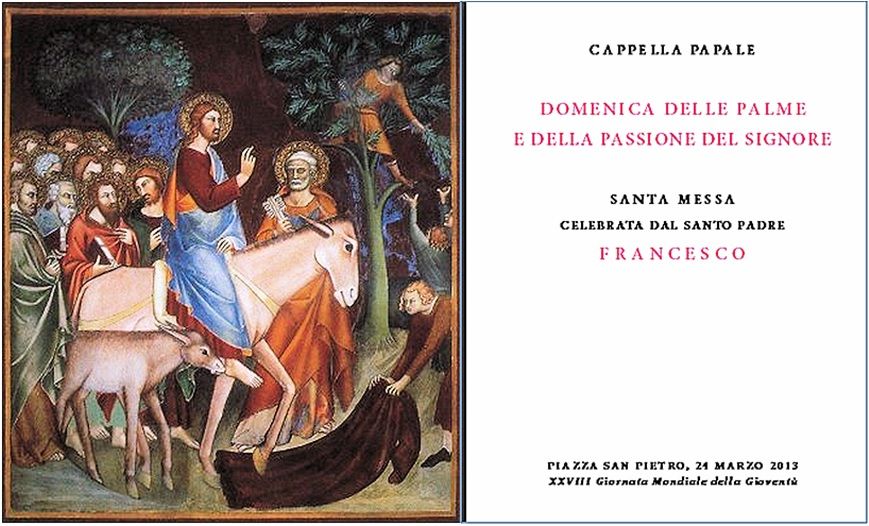 Libretto Cover: 'Jesus enters Jerusalem', Memmo Lippi (1291-1356), Fresco, Basilica Santa Maria Assunta, San Gimignano (Siena).
Libretto Cover: 'Jesus enters Jerusalem', Memmo Lippi (1291-1356), Fresco, Basilica Santa Maria Assunta, San Gimignano (Siena).
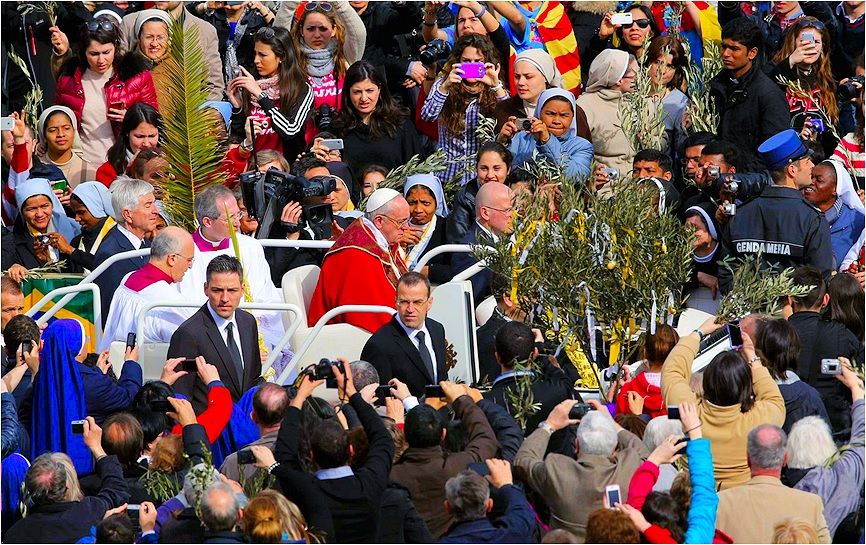
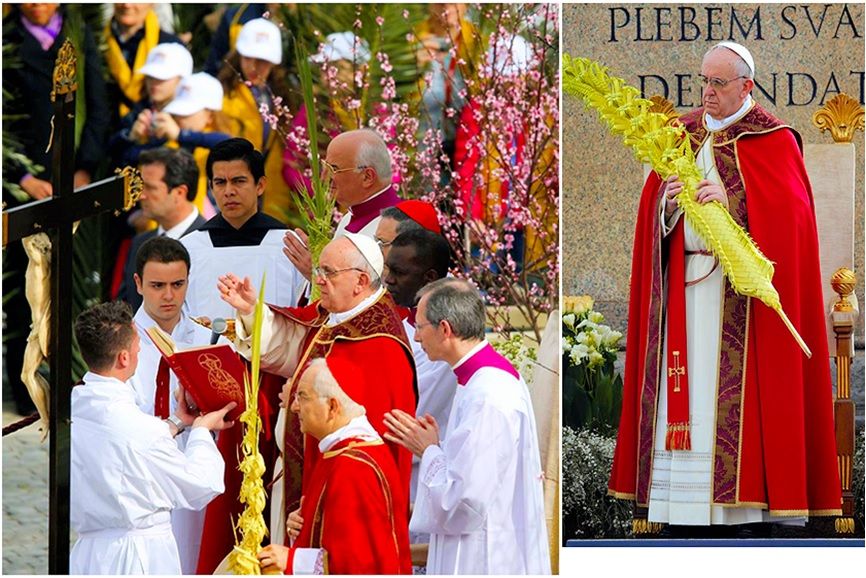
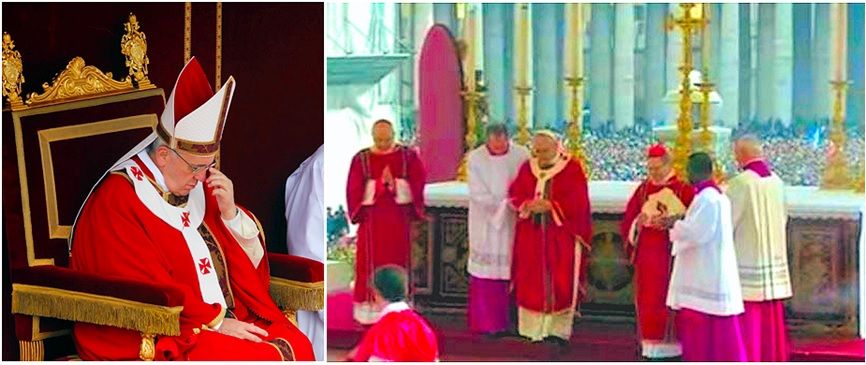 Pope Francis says Christians must express
Pope Francis says Christians must express
the joy of having encountered Jesus

March 24, 2013
On a spring day in Rome, St Peter’s Square was full to capacity with people who had gathered for the celebration of Palm Sunday which marks the beginning of Holy Week. People of all ages waved palms and olive branches which this year were donated by the Puglia region of Italy and the Italian province of Savona.
As the choir sang the “Hosanna”, a solemn procession saw Cardinals, priests, and ordinary men and women circled the obelisk on the Square,
Pope Francis travelled in an opened topped Pope mobile to the Obelisk in the middle of the Square where he blessed palms and olives branches before walking in a procession to the specially constructed alter in front of St Peter’s Basilica.
The liturgy during the celebration recalled Jesus’s triumphant entry into Jerusalem on a donkey, and 3 deacons read the Gospel which recounts Christ’s Passion.
This was Pope Francis’s first Palm Sunday celebration as Pontiff and during his homily the Holy Father focused on three key words; Joy, the Cross and Youth.
The Pope said that on Jesus’s entry in Jerusalem he was received with great joy as people waved their palms and olive branches. He awakened great hopes, especially in the hearts of the simple, the humble, the poor, the forgotten, those who do not matter in the eyes of the world.
The Pope went to say, “Do not be men and women of sadness: a Christian can never be sad! Never give way to discouragement! Ours is not a joy that comes from having many possessions, but from having encountered a Person: Jesus”
Highlighting the word Cross, the Holy Father said, Jesus on the Cross feels the whole weight of evil, and with the force of God’s love he conquers it, he defeats it with his resurrection.
So, too, he said, we can all conquer the evil that is in us and in the world: with Christ: “We must never grow accustomed to evil. With Christ we can transform ourselves and the world.”
It was also diocesan World Youth Day, in which thousands of youth from the diocese of Rome took part in St. Peter's Square and around the world.
Addressing the youth, Pope Francis said that "With Christ, the heart never grows old!...You have an important part in the celebration of faith. You bring us the joy of faith and you tell us that we must live the faith with a young heart, always, even at the age of seventy or eighty.”
He also told the young people present that he was looking forward to World Youth Day in Brazil in July. He said he entrusted their path to Rio De Janeiro in July to Mary.
Pope Francis then made a tour around the crowds at St Peter’s Square in the Popemobile.
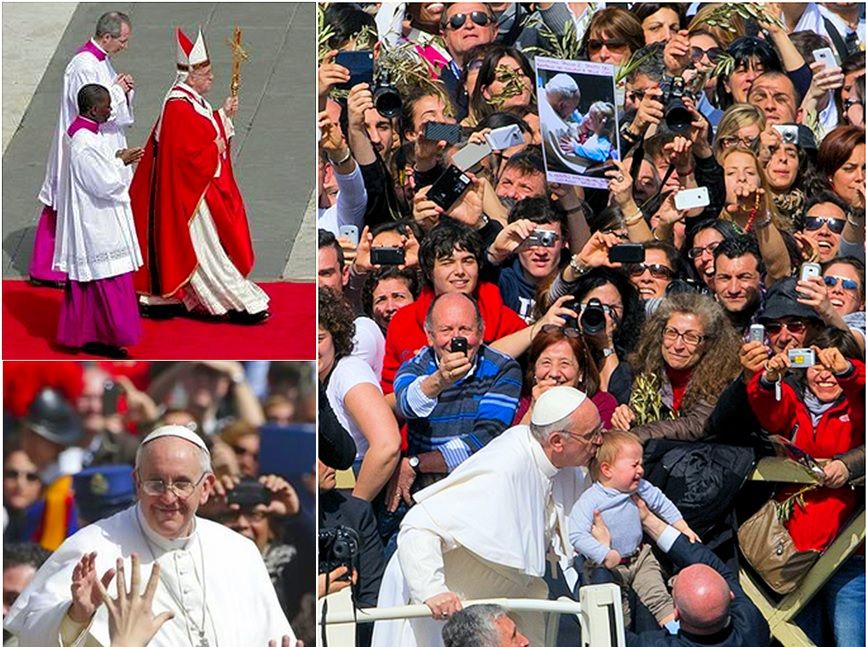
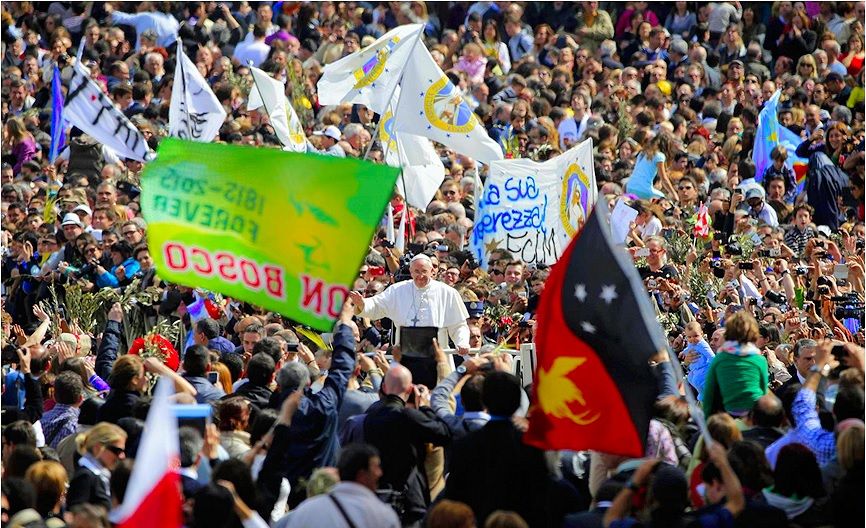 [Modificato da TERESA BENEDETTA 25/03/2013 14:41] |
| |
 25/03/2013 19:48 25/03/2013 19:48 |
|
| | | OFFLINE | | Post: 26.518
Post: 9.005 | Registrato il: 28/08/2005
Registrato il: 20/01/2009 | Administratore | Utente Master | |
|
 The meeting in Castel Gandolfo:
The meeting in Castel Gandolfo:
What the media do not see
Translated from

March 24, 2013
It certainly is not an everyday event to see two Popes converse, pray and lunch together fraternally. Indeed, it is definitely a unique event, even If only one of the two is the actual Pope - the other was, and is now emeritus Pope.
But above all, it is not usual t see a unity so profound, and it is almost impossible to find two men - called to such supreme ministry - who have lived and are living through that responsibility, placing themselves completely in the background with respect to him whom they both love, he to whom the Church belongs ("The Church is not ours, it belongs to Christ" was one of the last thoughts left to us by Benedict XVI when he explained his decision to renounce the Pontificate.
Nonetheless, it was predictable that the meeting in Castel Gandolfo between Pope Francis and Benedict XVI would set off a media babble with an unseemly and improper focus on so-called secret dossiers (no one will simply say 'documents') that the emeritus Pope was turning over to the Pope, despite an official denial that this was the case. [An official denial that was unnecessary, especially since the next day, a white document box was clearly on the table between the two protagonists in the photos released of their private meeting in the library in Castel Gandolfo. Besides, what would be wrong if Benedict XVI did turn over documents and even notes that he might consider useful for the new Pope? He already said weeks ago that he would turn over the cardinals; report on Vatileaks and the Curia to his successor.]
In the media, very few grasped - or even paid attention to - the spiritual dimension of this unique meeting between two men of God, preferring instead to discuss all the 'incidentals' - questions about the Curia, the cardinals' report, the issue of both living in the Vatican, the changes the new Pope will make in the Curia...
But that's the way the media are, in general. They are absolutely not 'Christian'. But they are 'clerical' - and how! Namely, often hostile to Catholicism and the Church, but crazed in their obsession with the Roman Curia and any gossip in and about the Curia.
This has been seen these weeks in the oceanic quantity of articles, transmissions and online posts dedicated to the renunciation of Benedict XVI, the election of his successor, and all the presumed behind-the-scenes happenings, every imaginable insinuation, gossip tidbit or banality peddled as 'scoops'.
All this flood of 'information' does not mean attention for the Church. Indeed, MSM are almost universally indifferent to what the Popes teach, to true spiritual content, and most of all, to that extraordinary submerged world, unseen by the cameras and unreported by anyone, which are the Christian communities where the teachings of the Church are welcomed and accepted, where the faithful experience their faith in friendship with Jesus Christ, and for not a few, often in a daily dimension of holiness.
It is the 'curias' or Church hierarchies that interest the media, not Christians, much less saints. As Charles Peguy once observed, "clerical curias' and 'anti-clerical curias' share a common horizon - which is that of politics and power.
[The dictionary definition of clericalism, in fact, is "a policy of maintaining or increasing the power of a religious hierarchy" or, more clearly, "a policy of supporting the power and influence of the clergy in political or secular matters".]
Paradoxically, among those whom one might cite as completely 'non-clerical' are Joseph Ratzinger and Jorge Bergoglio. Both of them, all their life, have shown profound and absolute disinterest for hierarchy, for power, for 'roles'. As priests, they have only wanted to 'serve' in order to bring Christ's salvation, and therefore, true happiness, to all men.
Benedict XVI's luminous catecheses and homilies marvelously express the 'secret' of this two men of God.
I remember two distinctly from his last months as Pope: "Never place 'I' in place of God" (Beautifully put in Italian, where it reads 'l'io nel posto di Dio') - which is exactly what Papa Bergoglio meant when he denounced 'worldliness' and self-referentiality within the Church.
Then there was Benedict XVI's homily at the feast of the Immaculate Conception last December. To reread those words today is surprising, because they seem to be the most perfect interpretation of all the gestures by Pope Francis since his election that have been widely hailed and praised.
Pope Benedict, thinking of Mary - who was the humblest as well as the most elevated of all human creatures - called attention to the poor people of God, all those who are undergoing personal trials or live at the margins of society, who feel unheard or irrelevant in history because the media are never interested in them.
Benedict underscored this about the Annunciation (which was the Gospel for the day): "This moment crucial to humanity’s destiny, the moment in which God was made man, is shrouded in deep silence. The encounter between the divine messenger and the Immaculate Virgin takes place completely unnoticed; nobody knows and nobody talks about it. It is an event which, were it to happen in our time, would leave no trace in the newspapers and magazines, because it is a mystery that happens in silence. What is truly great often goes unnoticed..."
And then, he said: "The world’s salvation is not the work of human beings — of science, of technology, of an ideology — but it comes from Grace... Mary is called “full of grace” (Lk 1:28) and with her specific identity, she reminds us of God’s primacy in our life and in the history of the world, she reminds us that the power of God’s love is stronger than evil..."
Pope Benedict adds another pearl which is similar to what Francis said at his first Angelus remarks, that God forgive all and forgives always: "Mary tells us that however low man may fall it is never too low for God, who descended even into hell; however far astray our heart may have gone, God is always “greater than our hearts” (1 Jn 3:20). The gentle breath of Grace can dispel the darkest cloud and can make life beautiful and rich in meaning even in the most inhuman situations.“
The following day, which was a Sunday, Benedict at his Angelus remarks spoke again of the "the great event, the birth of Christ, which his contemporaries did not even notice... For God the great figures of history serve as a frame for the lowly!"
It almost seems as if Pope Francis has been trying to show every day the truths that Pope Benedict amply announced [and which he lived himself!] during his Pontificate.
Morever, Francis, in addressing the diplomatic corps to the Holy See for the first time, explicitly recalled the condemnation of the 'dictatorship of relativism' made by his predecessor (but it must be noted that many news reports about the speech failed to mention this).
Therefore, the profound unity between these two men is evident. Especially since Pope Francis's exhortations find a marvelous example not just in his own life but in the life of Benedict XVI.
The latter's very renunciation of the Pontificate showed a truly Franciscan detachment from earthly things - and it is the example of humility that can be cited and followed by those who would heed Pope Francis's call to abandon even 'spiritual worldliness'. [It was very striking when news reports made much of this phrase used by the Pope, that practically no one recalled Benedict's emphatic exhortations to the Catholics of Germany during his state visit in 2011 for Entweltlichung, that very descriptive German word which means 'getting rid of all worldliness', saying attention must be given first to personal renewal and purification rather than being exclusively obsessed with structures in the Church.]
Indeed, both these men of God see in the saint of Assisi a way towards a luminous future for the Church. In a book he wrote years ago as cardinal, Joseph Ratzinger referred to St. Francis, saying that though in his time, he was considered simplex and illiteratus, he knew more about God than all the educated men of his time because he loved him more".
So we have two men with different biographies and temperaments as different as a piano from a violin, who nonetheless play the music of the same great and beautiful divine work in perfect harmony, one that is enchanting.
As enchanting as the Madonna of Humility that Pope Francis gave to his predecessor, Mary whose protection embraces both men, who are privileged witnesses to Christ in our time as his Vicar on earth, past and present.
My addendum: Of course, the story is well-known by now that the icon was, in fact, a gift to Pope Francis from Kirill, Patriarch of Moscow, presented to him on March 20 by Metropolitan Hilarion, who represented Kirill at the inauguration:
A report from the Moscow Patriarchate's foreign relations department referred to the icon as "Our Lady, Support of the Humble". And Metropolitan Hilarion is quoted as telling Pope Francis when presenting it, "The first steps of Your Holiness after being elected were marked with humility," to which the Pope said in response, "I have no humility and I'm asking you to pray that God gives it to me."
In presenting the icon later to Benedict XVI, Pope Francis said: "The icon is called Our Lady of Humility and I will take the liberty to say just one thing: I thought of you, being so humble as Pope."
[Modificato da TERESA BENEDETTA 27/03/2013 03:06] |
| |
 25/03/2013 20:09 25/03/2013 20:09 |
|
| | | OFFLINE | | Post: 26.519
Post: 9.005 | Registrato il: 28/08/2005
Registrato il: 20/01/2009 | Administratore | Utente Master | |
|

 March 25, Monday in Holy Week
March 25, Monday in Holy Week

Today is the Feast of the Annunciation, but when it falls within the Lenten season as it often does, it Is celebrated on another day, This year, it will be celebrated on April 8, the Monday after Divine Mercy Sunday which ends the Octave of Easter. The Annunciation is considered the moment when Jesus was conceived in the womb of the Virgin Mary through the Holy Spirit, and its feast has been traditionally marked nine months before the birth of Jesus.
AT THE VATICAN TODAY
The Holy Father met with
- Cardinal Marc Ouellet, Prefect of the Congregation for Bishops
- Cardinal João Braz de Aviz, Prefect of the Congregation for the Institutes of Consecrated Life and
Societies of Apostolic Life
- H.E. Héctor Federico Ling Altamirano, Ambassador from Mexico, on his farewell visit.
 One year ago today...
One year ago today...
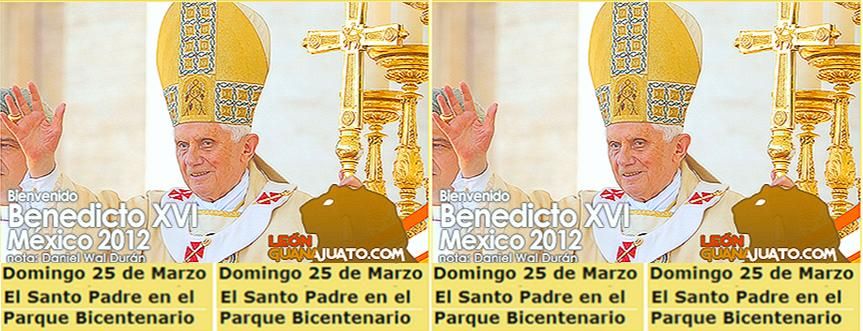
It was the third day of Benedict XVI's apostolic visit to Mexico, and it was marked by a Mass attended by at least 650,000 faithful at the Bicentennial Park outside Leon, at the foot of Mexico's giant Cristo Rey (Christ the King) monument; and in the afternoon, with Vespers at the Basilica of Our Lady of Light in Leon, during which he addressed the bishops of Mexico and turned on the switch for the new lighting of the Cristo Rey monument.
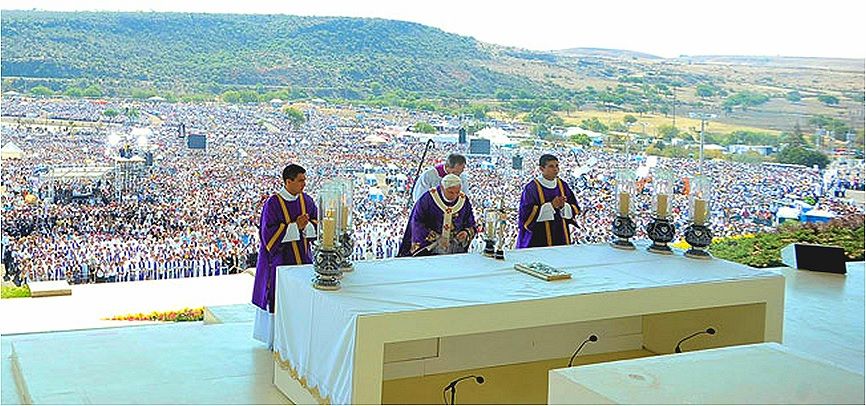
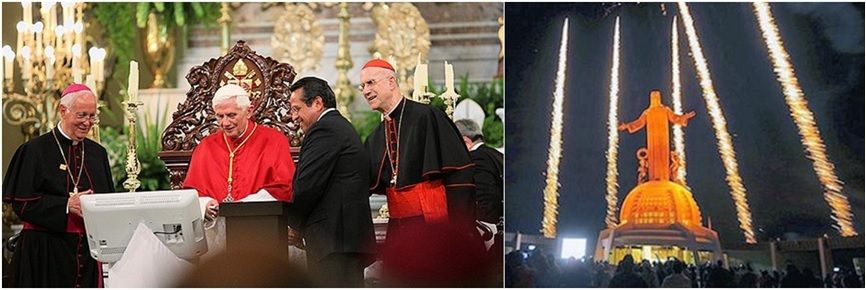
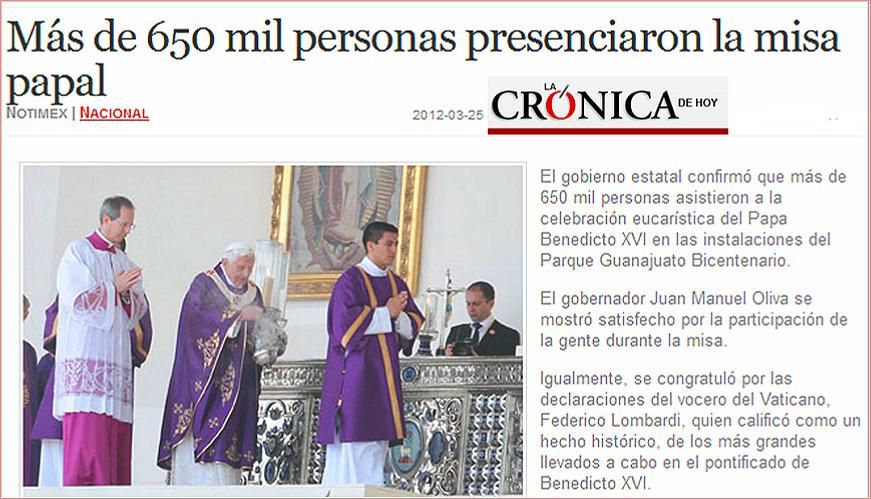 'More than 650,000 attended the Pope's Mass'
While I try to re-process the stories (and excerpt from the fine homilies) that day for brevity, here was one of the photo highlights of the day - when Benedict donned a charro (Mexican wide-brimmed hat) - handed to him during his Popemobile tour among the faithful who came for the Mass... Possibly no other figure has been photographed in as many and as varied an assortment of headgear as Benedict XVI during his Pontificate...
'More than 650,000 attended the Pope's Mass'
While I try to re-process the stories (and excerpt from the fine homilies) that day for brevity, here was one of the photo highlights of the day - when Benedict donned a charro (Mexican wide-brimmed hat) - handed to him during his Popemobile tour among the faithful who came for the Mass... Possibly no other figure has been photographed in as many and as varied an assortment of headgear as Benedict XVI during his Pontificate...
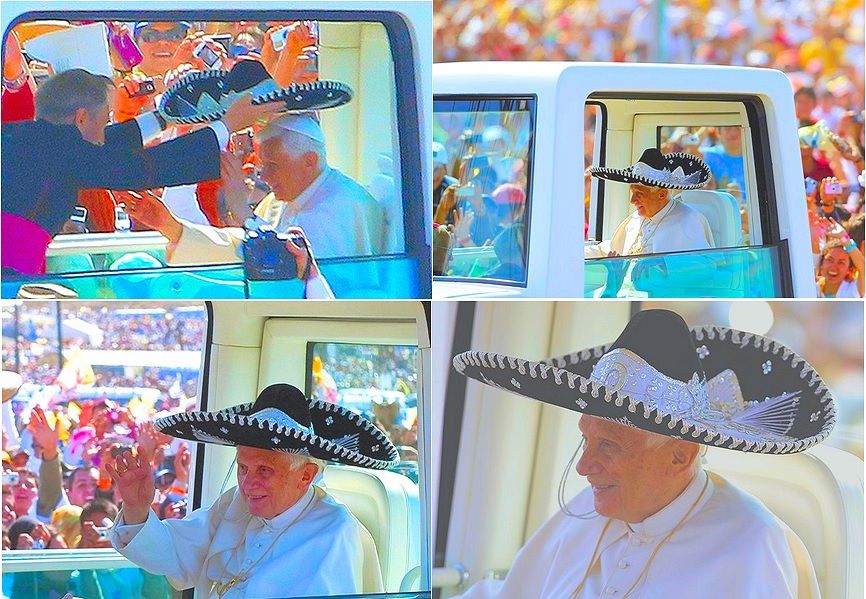
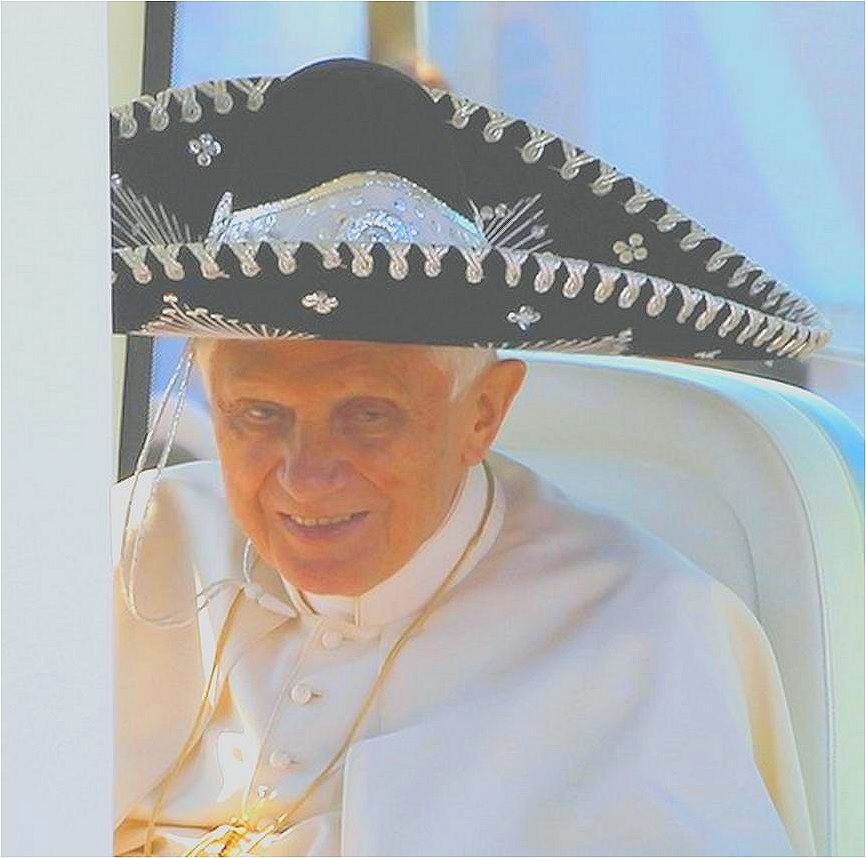
In hindsight, we now know that the night (or early morning) before the Mass, the Pope hit his head in the dark against a bathroom wall or fixture and incurred a scalp wound which bled a great deal but was superficial, so he wore a bandage under his zucchetto that entire day. The incident is now believed to have helped mature his decision to renounce his office as soon as the time was propitious. The resignation would come less than a year after this mammoth Mass in Leon.
On this day in 2005 ...
 The photos in the strip are from the years of BXVI's Pontificate.
The photos in the strip are from the years of BXVI's Pontificate.
Looking farther back, this day in 2005 was Good Friday, which became particularly memorable for the Via Crucis meditations and prayers written by then Cardinal Joseph Ratzinger for the annual Good Friday observance of the Way of the Cross at the Roman Colosseum, and his denunciation of the 'filth' in the Church "even among those who, in the priesthood, ought to belong entirely to him"....
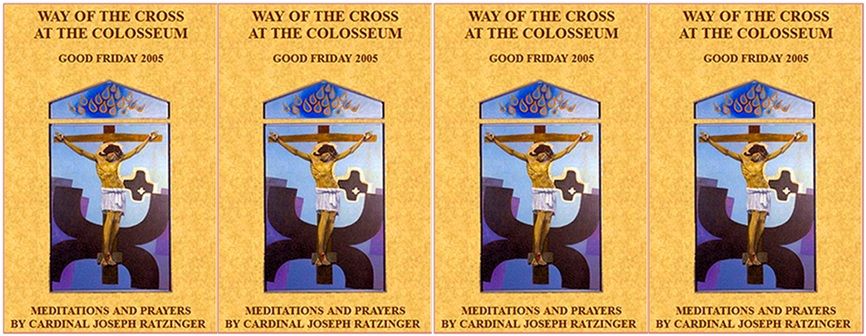

[Modificato da TERESA BENEDETTA 26/03/2013 17:32] |
| |
 26/03/2013 22:54 26/03/2013 22:54 |
|
| | | OFFLINE | | Post: 26.520
Post: 9.007 | Registrato il: 28/08/2005
Registrato il: 20/01/2009 | Administratore | Utente Master | |
|

 Weathercocks are extremely sensitive to the slightest breeze that stirs the air, and so they can really do a jig when the weather shows unusual activity - and that's the derivation for the title of this piece, which I owe to Beatrice who has opened a new page of her site benoit-et-moi.fr to reflect the post-Papal period for Benedict XVI.
Weathercocks are extremely sensitive to the slightest breeze that stirs the air, and so they can really do a jig when the weather shows unusual activity - and that's the derivation for the title of this piece, which I owe to Beatrice who has opened a new page of her site benoit-et-moi.fr to reflect the post-Papal period for Benedict XVI.
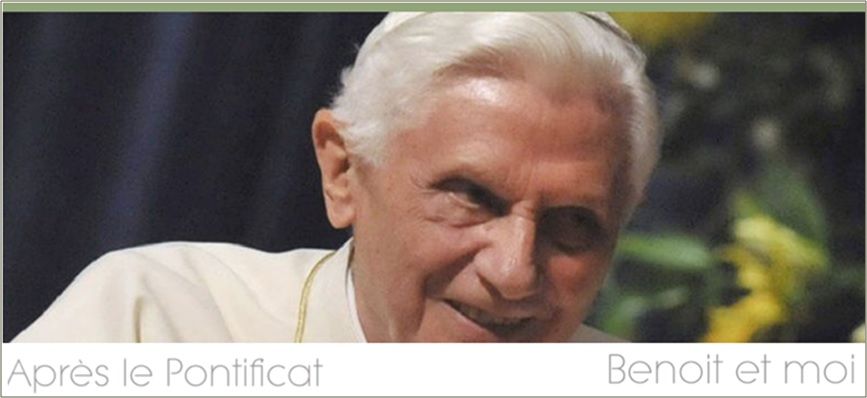 The new dance of the weathercocks
The new dance of the weathercocks
by Philippe Maxence
Editor, L'Homme Nouveau*
Translated from his blog
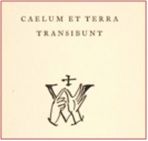
I am not a Vaticanista, and seeing what has been happening in the past several days, thank God I am not. A Vatican reporter's occupation is not easy. He must know not just all the cogs in the 'machinery' of the Church but also the men of the Church - those who have served in Rome, those who never did, those who could come to Rome, and those who dream of working in Rome.
But he must also know the doctrine of the Catholic Church. At the very least, with the basic catechism, even if this has disappeared. One could say they ought to read at least the Compendium of the Catechism of the Catholic Church, but how many of them have done that?
Quite apart from perhaps a very small number of Vaticanistas [and those who purport to know everything about the Vatican, or at least, write as if they do], no one had predicted the election of Cardinal Bergoglio as the successor of Peter.
Nor did I, who am not a Vaticanista. But I couldn't have predicted what has followed since then. How shall I say it? We are witnessing, in effect, a strange spectacle.
To begin with, there are cardinal electors calmly and publicly recounting episodes from the Conclave on their blogs or with the media. Yet did they not swear on the Gospel that they would not reveal an iota of what took place during the Conclave?
I am a father, and I taught my children that a promise, even one that is now sworn, must be kept, and that the Gospels are not just a book like any other book but the Word of the Lord himself. What can I tell them now? That there is a law for us and a different one for the cardinals?
But the spectacle is not limited to that. Words are hard to find for the strange situation we have been witnessing. So strange that I myself must take precautions to make sure that what I shall say is not to be understood as a criticism of the new Pope. But it is a criticism of this new dance of the weathercocks that we are witnessing.
We read even the 'best' of the Vaticanistas - none of whom got the Conclave right - saying that Francis is the Pope of simplicity and the Pope of rupture.
The Pope of simplicity! Is that meant to say that his predecessor, Benedict XVI, was neither humble nor simple? Or that St. Pius X was not? That no Pope before Francis had ever been humble and simple? What we have is not just a flood of enthusiasm in the media narrative - everyone is writing the same thing - but outright falsehood.
The website 'Benoit et moI' showed this with a concrete example, and I would advise you to read the accounts. [The Rome correspondent of the French agency I-media made a big to-do about the fact that Pope Francis chose to remain in the room at Domus Santae Marthae that had been assigned to him for the Conclave, refusing to occupy the VIP suite. (That, of course, has now changed.) But Beatrice cited an item by Vaticanista Salvatore Izzo who said that Benedict XVI, upon his election, remained in his assigned Room 411 all the time that he was in residence at the Domus.]
What about Francis as the Pope of rupture? ['Revolution' is the other favored meme, and Jose Luis Restan has dealt that in a previous post on this thread.] Do those who write these things understand the words they use? To thus describe a Pontificate that has hardly begun, of a Pope about whom they know little more than we know - do they realize that in doing so, they are torpedoing, with respect to Catholic doctrine, the very person they are incensing?
Rupture has never been the Catholic way because the Church rests precisely on apostolic transmission and continuity. Of course, a Pope can give his own inflections and new directions, but if he breaks with his predecessors in matters of faith [not external details], he would be off course.
Even Paul VI, having said that he was introducing a 'new Mass', emphasizes nonetheless that he was doing so in continuity with the traditional Mass (which some of us could not really see, it must be said).
The chattering media and, especially, prelates today, are an afflicting spectacle. Yesterday, they cited Benedict XVI's authority to legitimize their positions and actions. Today, all they can talk about is rupture, change, transformation. One Vaticanista even contrasted 'yesterday's authoritarian clerical authority' with the 'authority of respect' of someone who has not even had time to make a substantive decision as Pope.
The media have become so obsessed with the event of having a new Pope that they have been submerged by their emotions and incapable of taking the least step backwards to be dispassionate. Yesterday, they all praised Benedict XVI for resigning. Now they are comparing him unfavorably to Francis.
They seem to have burnt everything from the past (even if some of them were more than approving of Benedict XVI), going from the known to the unknown, seemingly drugged by their own effervescence and the Roman heat. Instead of keeping an objective distance, they are swimming within the events they are reporting. Where will this dance of the weathercocks lead?
And it is stunning to see their reaction when anyone proclaims loyalty to the Papacy itself - as if it meant opposition to the new Pope - and consider it with derision and cheap psychoanalysis.
But aren't they the ones who went delirious over the fact that Francis said 'power means service'? When the Pope was merely enunciating the traditional Catholic view of power? Must we remind these brilliant experts that one of the titles of the Pope is 'servant of the servants of God'? [Could the new Pope therefore say otherwise? Benedict XVI liked to recall that it was Gregory the Great who formulated the title, and the 'title' he himself likes best. I would also want to recall that Joseph Ratzinger's motto for his ordination, quoting St. Paul, was "We are not lords of your faith but rather, servants for your joy" (2Cor 1,24), and that his book on priestly spirituality was entitled "Servants of your Joy".]
As Catholics, we have a duty to be attached to our Pope and to his person. Not because he is a magician or the super-pastor of the world or arguably the most charismatic personality on earth. But simply because he is the Vicar of Christ on earth and the Successor of Peter.
It goes beyond the Pope's personal merits and failings, whoever he is. The function of Pope does not belong to the person who is Pope at the moment. The Pope is the common asset of the Church, which he makes visible in his own way. True humility consists in dissolving oneself in the office, allowing oneself to be wedded to it, as in a physical marriage. And it requires time.
Mons. Domenico Tardini wrote that Pius XII - although he had been in the service of the Roman Curia since he was ordained a priest and was Secretary of State for a long time - needed several weeks before he could consider himself settles=d completely in his new role, which as Benedict XVI has often recalled, surpasses human capacity. As much as he had been prepared for the office [and knew the Vatican milieu thoroughly], Papa Pacelli still needed time to feel at home as Pope.
And so it was with Benedict XVI, as it will be today for Francis, before he can be fully invested in and with his being Pope.
The papacy is too important to be abandoned to the ratiocinations of the media, to mediatic blazes, and to the dance of the weathercocks. After these important weeks for the Church, perhaps it is time the media shut up and go on a spiritual retreat.
* I always perk up when I see 'L'Homme Nouveau' mentioned anywhere because one of my favorite pictures of Joseph Ratzinger is this one showing him reading the newspaper, beside a teddy bear wearing a pectoral cross, a touch of whimsy telling us, if we did not already know it from his years as Pope, that the boy Pepperl, growing up, never lost his childlike joy and wonder for simple things that warm the heart (like a Nativity scene, for instance)...
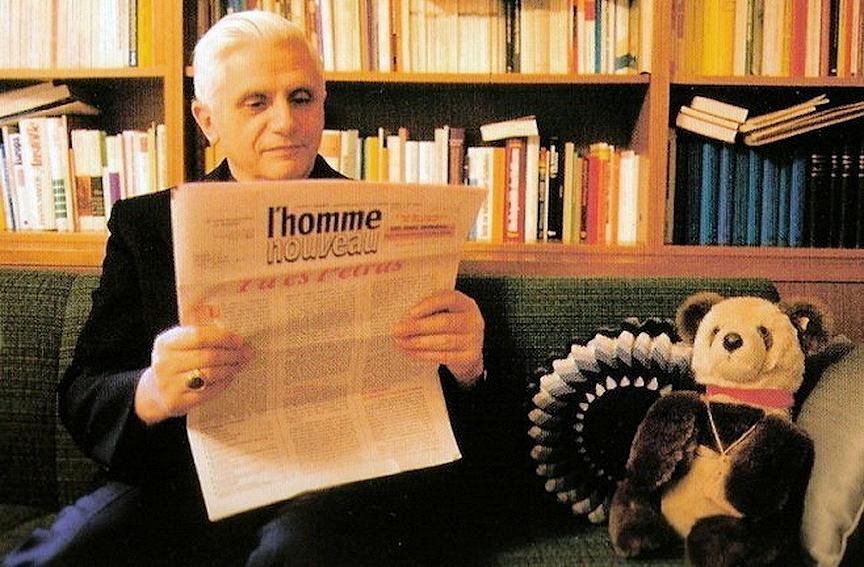
[Modificato da TERESA BENEDETTA 27/03/2013 15:08] |
| |
 26/03/2013 23:30 26/03/2013 23:30 |
|
| | | OFFLINE | | Post: 26.521
Post: 9.007 | Registrato il: 28/08/2005
Registrato il: 20/01/2009 | Administratore | Utente Master | |
|

 March 26, Tuesday in Holy Week
Since strangely, the current calendar of saints for 2013 does not carry a saint for March 26, I looked up other saints who are commemorated on this day, and picked out the following two (out of about a dozen):
ST BASIL THE YOUNGER (Byzantium, d 952), Hermit
March 26, Tuesday in Holy Week
Since strangely, the current calendar of saints for 2013 does not carry a saint for March 26, I looked up other saints who are commemorated on this day, and picked out the following two (out of about a dozen):
ST BASIL THE YOUNGER (Byzantium, d 952), Hermit
Said to have gifts of prophecy, he was living as a hermit near Constantinople when imprisoned and tortured as a spy. His miracles and prophecies won him his freedom, and he returned to his hermitage with a disciple, Gregory. There he denounced the immorality of the Byzantine aristocracy, an activity that brought him persecution.
ST. MARGARET CLITHEROW (b England 1555, d 1686), Wife, Mother, Martyr
Born of Protestant parents, good-looking Margaret married John Clitherow, a well-to-do grazier and butcher (to whom she bore two children), and a few years later entered the Catholic Church. Her zeal led her to harbor fugitive priests, for which she was arrested and imprisoned by hostile authorities. Recourse was had to every means in an attempt to make her deny her Faith, but the holy woman stood firm. Finally, she was condemned to be pressed to death on March 25, 1586. She was stretched out on the ground with a sharp rock on her back and crushed under a door over laden with unbearable weights. Her bones were broken and she died within fifteen minutes.
Readings for today's Mass:
www.usccb.org/bible/readings/032613.cfm
AT THE VATICAN TODAY
No official events for Pope Francis today, but the Press Office made it a point to announce under the heading
'Activities of the Holy Father that: "As in the past days, this morning at 7 a.m., Pope Francis celebrated
Holy Mass in the chapel of the Domus Sanctae Marthae. Taking part were other guests staying at the Domus.
(In the past several days, persons employed by the Vatican Governatorate, including gardeners, cleaners and garbage collectors, as well
as within various Vatican offices, have taken part in these morning Masses.]
At a press briefing later, Fr. Lombardi announced that the Pope has decided to stay at the Domus for now, instead of moving to the papal apartment in the Apostolic Palace. No reason was given.
He did say that the Pope has now moved from the room assigned to him as a cardinal for the conclave, into the VIP suite of the Domus so he has more space, but walks each day to the Apostolic Palace for work and to receive guests.
Another detail revealed by Fr. Lombardi today was that some non-Christians will be among the 12 minors at the Casal del Marmo juvenile detention center whose feet Pope Francis will wash during the Mass of the Lord's Supper.
[In 2005, after his election, Benedict XVI stayed at the Domus Sanctae Marthae for weeks - staying in the same room he had been assigned for the Conclave - until he left for Castel Gandolfo for the summer, and did not occupy the papal apartment at the Apostolic Palace until his return in September. At the time, the delay was due to the extensive renovations needed to reconfigure the papal apartment - particularly the bed/bath/dressing area - to normal use, because of the major changes that had been made to accommodate the physical disabilities of John Paul II in his final years and the high-tech medical equipment required to be on hand for immediate intervention. If the reason for Pope Francis not moving into the Apostolic Palace now is because he wants changes to the layout as it was during Benedict's Pontificate, the Press Office should say so. About the Masses, one presumes Benedict XVI also said his morning Mass daily while at Domus Sanctae Marthae but no announcements were ever made about it...
The Vatican Press Office has begun to act more like a PR office these days, something it never did even during the terrible months in 2010 when Benedict XVI was the daily target of some new media outrage clearly designed not just to discredit him and the Church but to pressure him into resigning! Not one word from anyone in the Vatican then in his behalf, other than from Cardinal Levada who took it upon himself to make a detailed response to the New York Times's hatchet job on Cardinal Ratzinger over the Fr. Murphy case in Wisconsin. Levada based his response on the written testimony of the priest who led the diocesan inquiry that took place in 1995, more than 23 years after Fr. Murphy was retired by the diocese. Cardinal Levada later posted his response in the CDF's special webpage on "The Church's Response to Abuse of Minors"...
In contrast to the deafening silence from the Vatican in 2010, Fr. Lombardi immediately issued a strong statement denouncing irresponsible and unfounded accusations that Cardinal Bergoglio had been complicit with the military dictatorship that ruled Argentina in the 1990s.
While it is very laudable indeed that the Vatican Press Office has decided to be more proactive in supporting the Pope, what has been so sadly missing in all the reporting these days, even from the Vatican, is context and perspective. Everything cannot be reported as if they were happening for the first time ever, because to do so simply reinforces the willfully naïve and vulgar (in the sense of common and popular) media view that previous Popes, particularly Benedict XVI, were somehow inferior in virtue to the new Pope because they honored papal tradition and therefore sinned against 'simplicity and humility'.
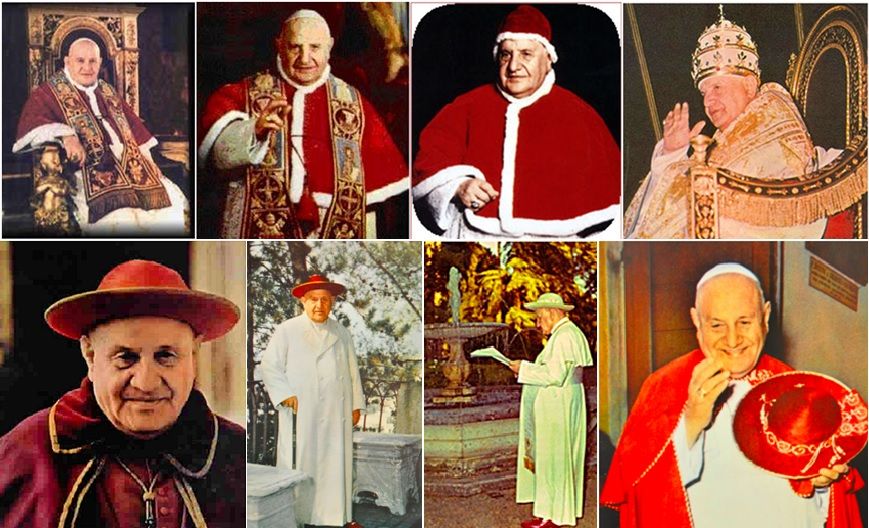
But, just to cite one example, il Papa Buono, Blessed John XXIII, even when he was Patriarch of Venice, followed dress tradition to a T with apparently no qualms or reservations (not even about the papal tiara and the sedia gestatoria), but was never criticized for doing what all Popes had done before him, nor more importantly, did it take away from his personal holiness. Tradition was obviously not incompatible with moving ahead, because he also had the prophetic wisdom to convoke the Second Vatican Council.
I will defer posting the 'Lookback' feature until later today - one year ago, Benedict XVI departed Mexico and arrived in Cuba for his apostolic visit.
[Modificato da TERESA BENEDETTA 27/03/2013 01:57] |
| |
 27/03/2013 22:02 27/03/2013 22:02 |
|
| | | OFFLINE | | Post: 26.522
Post: 9.009 | Registrato il: 28/08/2005
Registrato il: 20/01/2009 | Administratore | Utente Master | |
|
Relativism in the Church?
Translated from
SENZA PELI SULLA LINGUA
by Fr. Giovanni Scalese
March 24, 2013
Until a few years ago, I was involved more or less directly with the 'formation' of priests within my religious order. During which I often lamented the 'multiplicity of formations' because in practice, there seemed to be as many ways of training priests as there were formators.
Despite the existence of appropriate Constitutions, the Ratio institutionis [statement on the reasons for the establishment of a religious order], the deliberations in the Chapters-General and homegrown traditions, each novice or student was in fact trained according to the personal whims of the Father-Teacher to whom they happened to be assigned. You can imagine what consequences it has had for the unity of the Congregation!
In all the meetings among the 'formators' and of the Chapters-General, I always insisted on the need for a unity in the formatiVe process, and I must admit that this met with approval even in the Chapter meetings. But i have the impression that despite all that, the situation has remained virtually unchanged.
But what I lamented about the process of formation in my Order really constitutes a general problem that touches every aspect of Christian life and which has become widespread across the Church. Especially after Vatican II, when it seemed as if everyone believed he was authorized to do as he pleases.
Let me not be misunderstood. I am not criticizing Vatican II - I accept with conviction all the reforms it promoted some of which were subsequently realized - reforms which were made necessary by changing times.
In the years after the Council, the Popes and the dicasteries of the Roman made an enormous effort of 'aggiornamento' - bringing up to date - in all sectors of the Church, leaving room for the possibility of further adaptations to local situations, but always within the limits set by the new standards.
The problem is that such norms are often almost completely ignored by the 'base', where the common opinion is that the Council had swept away all legalisms and that the only criterion for action would now be to heed the Holy Spirit, whose urgings would seem to be identical to the personal goals of those who invoke his name! [But if only they did! Instead, they invoke a 'spirit of Vatican II' - as if the Holy Spirit had nothing to do with the Council (ditto for the 'spirit of Assisi). Why do the progrssivists invoke an amorphous undefined spirit, a secular phantasm, instead of the Holy Spirit himself? Perhaps because even they feel it would be sacrliege to invoke the Third Person in support of ideas that are not that of the Church he created at that first Pentecost.]
Why this long introduction, you might ask: What is Fr. Scalese leading to? It is the reflection that came to mind when the other day, I read the news that left me somewhat perplexed: the Pope, on Maundy Thursday, would celebrate the Mass of the Lord's Supper at the juvenile detention center of Casal del Marmo in Rome.
So how could that be a problem? Is it not a most beautiful gesture decided on by Papa Bergoglio? Isn't visiting those in prison one of the corporal works of mercy? And can the Pope not freely decide where to celebrate the evening Mass of Maundy Thursday?
I would like to start by responding to the last question, because I believe that all the rest will depend on a correct answer. It is true that the Pope can decide as he wishes - he is the supreme legislator in the Church.
But he can so decide, in fact, by legislating. If there is any law that he dislikes, he may change it. Until then, if there is an existing law, made by him or his predecessors, in my opinion, I do not think he can simply choose to ignore it.
I am not a canonist, but I do not believe the Pope can apply the principle “Princeps legibus solutus” (The sovereign is above the law). It would not be correct at all with respect to those who are held to observe a law. This, as a general principle.
In this case, it is not really about laws, but of pastoral instructions which nevertheless, in my opinion, are binding in nature. Some thirty years ago, the Ceremoniale Episcoporum was published - which I do not think was intended primarily for the diocesan liturgical masters but above all, for the bishops themselves.
I would point out that I am not referring here to the Ceremonial of 1600 (after the Council of Trent) but to that of 1984, “ex decreto Sacrosancti Œcumenici Concilii Vaticani II instauratum, auctoritate Ioannis Pauli PP. II promulgatum” - as decreed by the Second Vatican Council to build the sacred, and as promulgated by the authority of John Paul II.
So what does this Ceremonial manual say with regard to the rites of the Paschal Triduum?
"Bearing in mind the special dignity of these days and the great spiritual and pastoral importance of these celebrations in the life of the Church, it is supremely fitting that the Bishop, presiding in his cathedral church,` celebrates the Mass of the Lord's Supper, the liturgical acts of Good Friday recalling the Passion of the Lord, and the Easter Vigil, especially if the latter will include the celebration of the sacraments of Christian initiation" (No. 296).
Specifically, regarding Maundy Thursday, the Ceremonial manual proceeds: "The Bishop, even if he has already celebrated the Chrismal Mass in the morning, must also take to heart the celebration of the Mass of the Lord's Supper with the full participation of priests, deacons, ministers and the faithful around him" (No. 298).
These are not in any way compulsory norms, but instructions that are urgent, and from which, in my opinion one can deviate only for the most serious of reasons. According to the report, Pope Francis would only be continuing a practice he began as Archbishop of Buenos Aires, which implies that he intends to do the same thing every year as Pope.
It is clear that the problem has not emerged only now that Cardinal Bergoglio has become Pope, but that it began when he was an Archbishop. I can imagine his reason for doing so: "I already celebrated the Chrismal Mass this morning with all my clergy. This evening, the Mass of the Lord's Supper will be said in the various parishes. So who will I be celebrating with in the Cathedral? Even the seminarians will not be there because they are ordered to serve in their respective parishes. So I will go and celebrate the Mass for the sick, those in prison, and I shall also be carrying out a work of mercy".
It is a reasoning that is quite understandable, if not outright praiseworthy, but which also risks 'dismantling' in one act everything that Vatican II authoritatively stated:
"The Bishop must be considered as the high priest of his flock. In a certain way the life of the faithful in Christ derives from him and depends on him. That is why bishops are dutybound to give great importance to the liturgy of the diocese which takes place around the figure of the Bishop, principally at his 'cathedral' church (i.e., the church where he occupies the cathedra), in the belief that the Church manifests herself in a special way in the full and active participation of the People of God in the same liturgical celebrations, especially in the same Eucharist, the same prayers, the same altar at which the Bishop presides, surrounded by his priests and ministers" (Sacrosanctum Concilium, n. 41).
The text is reprised in the Ceremoniale which says: "Therefore the sacred celebrations presided over by the Bishop, manifest the mystery of the Church in which Christ is present, and are not just a simple matter of ceremonial... At certain times and on the most important days of the liturgical year, this full manifestation of (each) local Church is called for, to which shall be invited all the people coming from different parts of the diocese, and as much as possible, its priests"(Nos. 12-13).
"The principal manifestation of the local Church takes place when the Bishop, as the high priest of his flock, celebrates the Eucharist, most especially in his cathedral church, surrounded by his priests and ministers, with the full and active participation of the entire holy People of God. .. This Mass, which is called 'stational' [i.e., referring to a specific location, or 'station'], manifests the unity of the local Church and the diversity of the ministers around the Bishop at the sacred Eucharist. Therefore, as many faithful as possible should be invited to the Mass, the priests concelebrate with their Bishop, the deacons lend their particular service, and acolytes and readers exercise their functions" (No. 119).
"This form of the Mass shall be observed most especially at the major solemnities of the liturgical year, when the Bishop prepares the sacred Chrism and in the evening Mass of the Lord's Supper, in the celebrations of the holy founder of the local Church and the patron saint of the diocese, on the anniversary of the bishop's ordination, in the large assemblies of the Christian people, and in his pastoral visits" (No. 120).
The Vatican statement on March 21 about the decision of Pope Francis to celebrate the Mass of the Lord's Supper in a Roman detention center for minors, said, "As we all know, the Mass of the Lord/s Supper is characterized by the announcement of the commandment of love and the ritual gesture of 'washing feet'."
With this, too, the Ceremonial manual for Bishops is more complete and precise: "With this Mass, therefore, we commemorate the Eucharist, in memory of the Lord's Passover, through which the sacrifice of the New Covenant is made perennially present among us under sacramental signs. It also commemorates the institution of the priesthood, through which the mission and sacrifice of Christ are made present in the world. And finally, it commemorates the love with which the Lord loved us to the extreme of dying for us. The Bishop must concern himself with taking the opportunity to propose all these truths to his faithful through the ministry of the word, so that the faithful in their piety may penetrate more profoundly these great mysteries and may be able to live them more intensely in their actuall lives". (No. 297)
The washing of the feet is certainly a significant feature in the celebration of Maundy Thursday but it would be a mistake to consider it an essential element. Indeed, it is not an obligatory rite - it is to be carried out only "when pastoral reasons make it advisable" (No. 301). Unfortunately, in recent years, and in various places, it has been loaded with meanings that far exceed its original value.
Some will say that I am making a mountain out of a liturgical molehill, some will accuse me of fussiness, if not of outright rubricism or legalism. And some will certainly liken me to the Pharisees, who accused Jesus of not observing the Law when he healed on the Sabbath. While some will protest that I am trying to tell
the Pope how to be Pope.
Let them say what they want.But no one can certainly hinder me from thinking that some decisions, apparently innocuous, could have devastating consequences.
a. First of all, in ignoring existing norms in the Church = even those that may seem merely secondary - there is a risk of placing some fundamental values into question, values that Vatican II has shed light on and which it intended to become the common patrimony of the Church.
b. In the second place, the thought could be encouraged that yes, certain norms exist, but it is not that important to respect them. So if the Pope considers that it is possible to ignore them, it means they cannot be all that important. And if he can do it, why can I not do the same?
c. That, in turn, would give the impression that there are no objective and stable standards that are valid for everyone and for always, but that everything depends on personal discretion of the person who happens to be the responsible authority.
d. Finally therefore, there is the risk that relativism, so much opposed in words by today's society, does indeed become the supreme standard even within the Church.
An inopportune reflection
on Good Friday
To add to Father Scalese's argument about the inevitably slippery slope opened up by discretionary flouting of canonical rubric and eventually canon law itself - Fr. Scalese doesn't say so outright but clearly implies it is an act of arrogance rather than humility to do so ("See how much better I am!") - I take the opportunity to illustrate the dilemma I face regarding Pope Francis, a holy man the sole of whose shoes I am certainly not fit to even touch, and whose personal virtues will obviously neither be diminished nor enhanced by what anyone says or thinks about him.
But I am increasingly troubled by the very aspects of his personality - and I emphasize the word 'personality', namely Jorge Bergoglio, who has been front and center since March 13, even with the papal name of Francis - which have earned him universal accolades as the embodiment of all virtues. Especially, as the media gloatingly do, in comparison to his predecessor who was certainly never 'defined' by his external gestures nor ever seek to define himself thus. He always receded into the background in the most natural way possible, and without calling attention to his self-effacement because that would have been a contradiction of his intention. I have therefore been haunted since March 13 by the parable of the Pharisee and the publican. .
“Two people went up to the temple area to pray; one was a Pharisee and the other was a tax collector. 11The Pharisee took up his position and spoke this prayer to himself, ‘O God, I thank you that I am not like the rest of humanity — greedy, dishonest, adulterous—or even like this tax collector. I fast twice a week, and I pay tithes on my whole income. But the tax collector stood off at a distance and would not even raise his eyes to heaven but beat his breast and prayed, ‘O God, be merciful to me a sinner.’I tell you [Jesus says], the latter went home justified, not the former; for everyone who exalts himself will be humbled, and the one who humbles himself will be exalted.” (Luke 18,9-14).
Obviously, one immediately identifies a holy man like Pope Francis with the humble publican. What disturbs me is that I can just as easily find elements of his 'persona' - namely, of the Jorge Bergoglio who is now Pope Francis but who continues to be distinct from the figure of Pope - in the Pharisee.
He has been telling the world, in effect, "Look at me! I am not like the other Popes before me. I am humble and simple, I only want to serve, and serve the poor especially. So I will not be doing what the other Popes did because I am different from all of them. I will be an example who will show the world how and what a Pope [Excuse me, 'Bishop of Rome'] ought to be".
It is a presumptuousness, pardon me, that I never sensed in any of the other Popes in my lifetime, who simply became Pope with all the attendant consequences thereto, including what some derisively call 'the trappings' = and no one, not even the media, thought them any less for it. Once again, think John XXIII who was 'il Papa buono' even for the media though he gladly and obediently - and therefore, humbly - took on all the customary trappings of his unique office.
The obvious answer to what amounts to faithlessness on my part is, of course, "But what's wrong with a Pope who sets the example? Not so much for other Popes who will follow him but for the bishops and priests now?" To which I would say that the loss of faith within the Church is great indeed if bishops and priests needed the Pope to remind them by token headline-generating gestures that each of us is called on to imitate Christ. If their daily Mass, recreating the supreme sacrifice in persona Christi does not already remind them daily and call them to true imitation of Christ, nothing will - certainly not the fleeting example of self-deprivation and self-abasement by other humans like them, even if he happens to be the Pope.
Francis of Assisi himself, the alter Christus - who visited the Pope in Rome at least twice in his lifetime - never called on the Popes of his time to despoliate themselves and the Church, and live like the Franciscans did, begging for a living. As a good Catholic, he knew what function the Pope plays and that he carries out his office within and according to a tradition that had developed over centuries - more than a millennium already, in Francis's time - a tradition not tarnished but re-burnished even after a Pope like Alexander Borgia.
Nor was St. Francis made so giddy by his self-mortification to forget that there are other ways - including that of the Popes - to live Christ's Gospel.
What disturbs me further is that Cardinal Bergoglio is no naive bishop who is unaware of the overwhelmingly disproportionate media influence on global public opinion and of the attention he is generating. Where does he draw the line between genuine humility and allowing the onslaught of adulatory commentary to build up about his persona, not about Christ and the Papacy?
Even if he may think that all the attention he is getting is "all the better to spread my message", it is not the message of Christ that is being spread by all the media hullaballoo, but their 'shock and awe' over the never-ending novelties from someone who happens to be their celebrity du jour. It is about him as a person - Jorge Bergoglio as Pope - not about the Pope as the Vicar of Christ. The effect of all the novelties is the very opposite of self-effacement.
And with that, I will gladly put on sackcloth and ashes once again. and seek to make my personal amends, as the Act of Contrition says, for even thinking as I do and expressing my thoughts, especially on Good Friday.
[Modificato da TERESA BENEDETTA 30/03/2013 09:33] |
| |
|
|
|
|